You're currently viewing a custom sorting.

Star Trek DS9 - 7x12 - The Emperor's New Cloak
Originally Aired: 1999-2-3
Synopsis:
Grand Nagus Zek is abducted and held hostage by Alliance members from the mirror universe. [DVD]
Filler Quotient:
0, not filler, do not skip this episode.
- This is the last mirror universe episode.
Problems
- In DS9: Crossover we saw Klingon ships with cloaking devices. So much for this episode's premise...
Factoids
None
Remarkable Scenes
- Mirror Ezri attacking Quark.
- Quark and Rom hauling a cloaked cloaking device across the station.
- Mirror Julian shooting and killing Mirror Vic Fontaine. Ah, I love it.
- Rom obsessing over why some things in the mirror universe are opposites and some things aren't.
- Mirror Kira kissing Mirror Ezri...
- Mirror Kira killing Mirror Brunt.
- Quark and Rom making fun of Mirror Garak for not being as good at his job as regular Garak.
- Mirror Ezri killing Mirror Garak.
- The Mirror Defiant attacking the Regent's ship.
- Morn Appearances; 1. Behind Quark, who's complaining about Bashir because he's jealous that he has more of a chance with Ezri than he does.
My Review
The final mirror universe installment on DS9, thankfully. It actually does a great deal to wrap up the whole mirror universe story, too. The Regent is captured, right along with his flagship! Unfortunately, there is much to complain about. The lesbianism in this episode was over the top, the fact that we've already seen cloaking devices in the mirror universe was a drastic oversight, we get another overdose of Ferengi silliness. One thing I did like was Rom's objections about how some things are curiously not mirrored in the mirror universe. Like O'Brien being too nice, or the tube grubs not being poison. His ramblings may have been slightly incoherent, but in a way he's right and his statements kind of exemplify the way in which the DS9 writers have continually misused the mirror universe since day one. I can only pray that if it's ever used again that it be a true homage to TOS, and not this mishmash of silliness and plot device exploitation.

Star Trek TNG - 2x01 - The Child
Originally Aired: 1988-11-21
Synopsis:
An alien entity impregnates Troi. [DVD]
Problems
- So radiation from the energy life form was making the virus grow? Radiation makes it grow? Basic physics anyone?
- Why was the child a boy? Its DNA was supposed to be identical to Troi's.
Factoids
- This is the first episode of what many people call "modern TNG." Riker's beard, Worf in a yellow uniform, Geordi as Chief Engineer, Troi's wilder hair, Guinan, O'Brien as a transporter chief, Ten Forward, and the Shuttle Bay all first appear here.
- This also marks this first appearance of Dr. Pulaski whom replaces Dr. Crusher for this season only. Dr. Crusher became head of starfleet medical.
Remarkable Scenes
- Worf demands Troi's pregnancy terminated!
- Pulaski insulting Data.
- Data's interrogation of the counselor as the birthing process begins is hilarious.
- Pulaski mispronouncing Data's name and then not really caring. Pulaski: "What's the difference?" Data: "One is my name. The other is not."
- Wesley speculating about Guinan's past.
- I like the way Picard teases Wesley at the end.
My Review
Most people throw more mud at this episode than I do. Maybe I'd hate it more if it didn't introduce so many interesting and cool new things to TNG (see factoids). And Guinan is a damn good counselor. Better than Troi! Funny that she never sought a commission. Oh well. Toss aside the factoids and this episode is somewhat dull and uninteresting. Leaves you with a sense that there should have been more to both plot threads.
The following are comments submitted by my readers.
- From DSOmo on 2007-06-10 at 8:07am:
When Hesterdel comes on the Enterprise he inspects the containment field for hours before allowing transport. Yet when the Enterprise reaches the destination for the samples, the Enterprise begins beaming them down immediately. Shouldn't Hesterdel be inspecting the containment field at the destination also? - From Evan on 2008-05-26 at 1:14pm:
Regarding DSOmo's first comment, see "Thine Own Self". Crusher took the bridge officers' test a year before the first season (8 years before Thine Own Self) because she felt like challenging herself, not because it was needed for her carrier path. Pulaski probably didn't feel the same need. - From thaibites on 2009-12-03 at 4:55am:
If you haven't watched this episode yet - grab some tissues, some chocolates, and a box of tampons because this one is a total chick flick! - From Anna Lisa on 2010-12-16 at 11:38pm:
You'll need the tampons to throw at the screen when Pulaski is ragging on Data. - From John on 2010-12-23 at 4:41am:
I'd suggest as another remarkable moment the way Picard instantly silences the debate once Troi states that she intends to have the baby.
I'm all like "Hell yeah, Jean-Luc!" - From CAlexander on 2011-03-21 at 3:20am:
This felt like they filmed the first half of a good two-part episode, then never filmed the second half. I'm watching the episode, it seems promising, then suddenly it's all over, and nothing happened! Also, Troi seems to be filled with strong feelings, it is unfortunate that she never explains to the audience what she is thinking during the episode.
In response to radiation making the virus grow: This doesn't seem strange for an alien virus. Radiation contains energy, living things can turn energy into growth. Plants grow when exposed to radiation (light). Even humans can grow when exposed to radiation (in that cancer is uncontrolled tissue growth).
- From DanMcCoy on 2011-06-29 at 2:20pm:
Problems: What about O'brien's pips? Why is he a lieutenant?
So true about Guinan being a better counselor than Troi! lol - From Omcn on 2012-02-20 at 7:40am:
Wouldn't it have been more interesting if the energy thingy (looking for someone to grow inside of) chose the hairy man instead of Troi?
Bunch of men talking about what Troi should do with her baby, classic!
The way our new doctor speaks about/to Data makes me want to smack her. Data's questions to Troi during delivery are to awesome for words.
Tv birth scenes are always far to G rated, what silliness.
I think the best part of this episode was not the plot or the actors of anything strange like that. The best part for me was how much of the ship was shown and that we get to see for the first time some of the functions of the ship. Blinds going down. The window in ten forward etc. - From Arianwen on 2012-12-14 at 3:23am:
Re. "radiation makes it grow", photosynthesis is based on just that (energy from solar radiation is absorbed by a specialised molecule which sets off a reaction chain: basically, light energy is converted to chemical energy and stored by the organism). Whether this could work with something as simple as a virus is a whole other kettle of fish.
</infodump>
BORING. Troy is mysteriously impregnated: possible threat. Highly dangerous viral strains must be taken onboard: definite threat. Troy has baby. Virus fed by radiation from child inevitably threatens to escape. Baby-now-child dies, neatly disposing of both threats. Troi explains everything in a ten-second infodump which the audience is too comatose with boredom to listen to. Oh, and Wesley's leaving. Wait, no, he isn't. Yaaaay.
I've no doubt this was all very intriguing and exciting for the characters actually living it, in the same way your aunt's Barcelona holiday isn't accurately represented by her 1.12GB of photos of Gaudí's Casa Batlló. Fifty minutes of your life looking at someone else's holiday photos.
You're welcome. - From tigertooth on 2017-03-20 at 4:04pm:
Too bad nobody thought to send Troi and the kid out in a shuttle craft a safe distance from the Enterprise. After they offload the cargo, both can come back to the Enterprise, and the kid can stay/grow as long as he wants.
Maybe they should have had the kid's energy "infecting" the warp plasma or something so that it would make more sense that he'd have to leave and never return. - From jeffenator98 on 2019-10-17 at 5:09pm:
Only Worfs comment at the end "I will assume that duty." saves this one from being a zero 1/10. - From the obampresident on 2021-07-15 at 9:09am:
I like how the new and improved doc treats Data. Aside from a few remarks from Riker in the first episode nobody on the crew ever seems to care that they are working with the only sentient machine in star fleet!

Star Trek DS9 - 7x03 - Afterimage
Originally Aired: 1998-10-14
Synopsis:
In addition to coping with the memories of her "past lives," Ezri Dax must deal with the range of reactions her presence generates on Deep Space Nine. [DVD]
Filler Quotient:
0, not filler, do not skip this episode.
- Numerous major long term plot threads are serviced here.
Problems
None
Factoids
None
Remarkable Scenes
- Ezri: "It's a strange sensation, dying. No matter how many times it happens to you, you never get used to it."
- Quark: "You're a therapist?" Ezri: "Why does everyone sound so surprised when they hear that?"
- O'Brien and Bashir discussing plans for their battle of the Alamo holosuite program. Odo is going to be General Santa Anna. How fitting. :)
- Sisko to Dax: "What are you gonna learn in the next 3 months that you haven't already learned in the last 300 years?"
- Quark declaring to Julian that he will win over Ezri first.
- Ezri's "misplaced guilt" conversation with Garak.
- Ezri revealing to Sisko that he intimidates Worf.
- Ezri to Bashir: "If Worf hadn't come along, it would have been you."
- Worf freaking out at Bashir and Quark.
- Garak's insults toward Ezri... ouch! Garak: "Now get out of here... before I say something unkind."
- O'Brien visits Worf with a bottle of blood wine. Worf's reaction: "Oh no, not again."
- Ezri discovering the root of Garak's distress.
- Jake: "She is cute..." I would tend to agree.
- Morn Appearances; 1. First scene, Ezri talks to him. 2. Is present at Ezri's promotional ceremony.
My Review
Is this the "let's pick on the new girl" episode? Holy crap. Worf tells Ezri he doesn't want anything to do with her, Sisko lectures her and is generally hard on her, and Garak is downright cruel. Granted everything's resolved in the end, I can certainly see why she was so eager to leave the station. What an emotional roller coaster. The episode presents a convincing story for not only Ezri, but Garak as well, whose claustrophobia makes a welcome cameo. I was pleased that the writers let his part of the story develop beyond the surface. I much enjoyed the revelation that the root of his distress was the fact that by working for Starfleet, Garak has been causing the deaths of countless Cardassian soldiers. Aside from this, the relationship between Worf and Dax as well as the one between Quark / Bashir and Dax is handled nicely; the writers had to make an episode dealing with all these things and they excelled. And I'll be honest with you. I think Dax 2.0 is a significant upgrade. ;)
The following are comments submitted by my readers.
- From MJ on 2011-02-12 at 9:16am:
There have been quite a few DS9 episodes that took on too much, and had to suddenly tie up an otherwise good episode. This one did very nicely, though. I didn't think anything was resolved too quickly between Ezri and any of the others. Interesting that Garak was the one chosen to be her first serious counseling effort aboard DS9, and his problem is a big one. His breakdown as he realizes what is truly bothering him is wonderfully acted, as only Andrew Robinson could.
I thought the reconciliation between Ezri and Worf was handled perfectly. It involved few words, and Worf right to the point with expressing his feelings, but without being too vulnerable, which is exactly how you'd expect him to do something like that. You can understand his pain, too. It's confusing for him: in his culture, the custom is to honor a loved one who is dead, and Dax doesn't quite fit in to the typical situation.
All of this explains the deeply cutting remarks to Ezri made by both Garak and Worf. That, combined with Sisko's "tough love" would certainly push a person.
I know that when DS9 was on the air and in the years since, there have been mixed fan feelings about Ezri Dax. Many people became attached to Terry Farrell and Jadzia, understandable after six seasons. But I really like the introduction of Ezri Dax. The character gives the show a chance to explore another side of Trill society: what it's like when a host isn't prepared for the symbiont, and is flooded with centuries of memories...not to mention having to face many of the people one of the previous hosts knew. And fresh-faced, perky but humorously befuddled Ezri is a good choice for this new host. - From Krs312 on 2011-09-22 at 12:49pm:
I also think that Ezri is a more interesting character than Jadzia. - From Rob UK on 2023-12-08 at 10:57am:
Personally i've always struggled with both Jadzia and Ezri Dax, even back in the 70's we all knew what a Mary Sue was (if you don't belive me go and watch Police Academy 1 and pay attention to the name of the new mayor), never mind in the 90's when this was produced.
The Trill symbiote makes an almost plausable excuse for why any female who gets one can take on any modern man of any race both physically and mentally at the drop of a hat no practice needed by channelling the very convenient multi talented previous hosts (they become like Cartman trying to play Ronin and end up with all the powers). This even applies in direct hand to hand combat against multiple mighty klingon warriors trying to gut her, where actually Klingon warriors are dying all around her but these weaklings have no chance for she has the powereth of previous male hosts inside her.
Am i just too old and jaded now hahahahahaha

Star Trek TNG - 1x08 - Justice
Originally Aired: 1987-11-9
Synopsis:
Wesley is sentenced to death. [DVD]
Filler Quotient:
3, bad filler, totally skippable.
- Pretty lame episode with no significant long term continuity.
Problems
- In the opening lines of the episode Picard refers to the "Strnad solar system" and the adjoining "Rubicun star system." Both terms are wrong. This is a common error. The term he was looking for is planetary system. The planetary system we live in is called the Solar System because our star is named Sol. As such, the term "Solar System" is a proper noun, not a generic term. The term "star system" is also wrong because that term is supposed to refer to a system of stars, not a system of planets, e.g. a binary or trinary star system.
Factoids
- This episode establishes that capital punishment was fully outlawed in the Federation sometime between TOS and TNG.
Remarkable Scenes
- Worf: "Nice planet."
- Worf's statement that he would have to restrain himself during sex with a human woman so as not to injure her and Riker's amused reaction.
- Picard: "Data, don't babble." Data: "Babble, sir? I'm not aware that I ever babble, sir. It may be from time to time I have considerable information to communicate and you make question the way in which I organize it..."
- Data offending Beverly with his fascination over her panic about Wesley's predicament.
My Review
The crew enjoys some shore leave on yet another planet whose alien inhabitants look exactly like humans. Picard finds that detail oddly remarkable, but by now we have so many similar examples. The unimaginative blandness of the Edo is further compounded when it turns out they are mindless pleasure zombies exhibiting behavior so shallow it's hard not to spend half the episode groaning at that alone. But worry not, there is plenty else to groan about. Not the least of which is their asinine criminal justice system.
The idea that the Federation should be high-minded enough to respect the local laws and customs of the sovereign nations they visit is a good premise for a story, but it's explored in a mostly sloppy way here. For starters, just visiting the planet to begin with was a violation of the Prime Directive, since they were clearly not a spacefaring civilization. Despite that the Edo seemed oddly aware of the existence of other civilizations, or at least totally unsurprised to receive visitors from outer space.
But even leaving all that aside, the Edo's policy of randomly executing people for trivial and even accidental violations of law—but only sometimes when that law is deemed punishable today by the roll of the dice—is the stupidest idea for a criminal justice system ever. It lacks both consistency as well as justification for the lack of consistency. For any kind of enlightened system of criminal justice to make sense, there has to be equality under the law. And in cases where the law is applied unequally, there tends to be some kind of underlying societal motive, like systemic discrimination, or simply the arbitrary whims of a cruel ruler.
But such motivations are not present here. Instead, the Edo just seem uniformly idiotic. They can't figure out a way to enforce their laws uniformly, so they just do it randomly and don't see any problems with that whatsoever. Given that, it's no wonder Picard chose to violate the Prime Directive to be rid of these people. Their local laws and customs are so idiotic that they simply don't deserve to be respected. The Prime Directive was dreamed up by someone who never expected alien civilizations to be this stupid.
That said, watching Picard wrestle with the ethics was still pretty compelling. It would've been nice if such scenes were set to the backdrop of a more compelling moral dilemma, but they were still well executed all the same. And despite how overwhelmingly lame the Edo were as a concept, watching the crew make the most of the experience certainly resulted in a series of pretty amusing, if at times overly goofy scenes. So while most of this episode is pretty painful, it's somewhat offset by some good stuff here and there.
The following are comments submitted by my readers.
- From DSOmo on 2007-05-28 at 6:02pm:
- How can Yar review the Edo's laws and customs, but not know the price for violating them (one punishment for any crime)?
- Picard tells Troi that he wants to speak to Dr. Crusher personally about what has happened to Wesley. When Picard returns to the Enterprise, Dr. Crusher stops him and demands to know what he is going to do about Wesley. She states that she read the away team report. What away team report? The away team is still on the planet. Even if they had made the report from the planet, Picard just told the away team that he wanted to handle the situation.
- There is a simple solution to the Prime Directive dilemma in this episode. Picard already used this solution in "Code Of Honor." Why not let the Edo inject Wesley, watch him die, beam him back to the ship, warp away, and resuscitate him? At one point, Riker took a syringe from a mediator, they could have used it to make an antidote. - From Bernard on 2008-01-16 at 12:46am:
There are not many episodes that I rate as lowly as this one.
I find it insulting to my intelligence that picard and the crew spend the latter portion of the episode worrying over breaking the prime directive when by the very fact they have revealed themselves to such a primative culture is surely against the prime directive in the first place!
Other than that, there are a few small delights such as the first time worf describes something as merely 'nice'. A few nice moments for Gates McFadden to sink her teeth into, and in my opinion Wil Wheaton does remarkably well with some atrocious dialogue. - From Sherman on 2016-06-30 at 7:55am:
I've been watched everything on this list and read every review after I watched an episode and out of everything this episode stuck with me the most because of the absolute law and the captains decision to ignore the prime directive and just take Wesley with him. - From Chris Long on 2020-07-25 at 1:24am:
You know? I like light-skinned folk as much as the next guy, but this race of beings is far more irritating than the TOS Episode, the Apple where everyone was some hunk version of a white Adonis!
Who thought this was a good idea?!?!?
... I'm no BLM guy but come on!!!
This episode just insults every sense of intelligence of all but the absolute stupidest people in existence!
How could this crapfest ever get past the producers?!?
Pure garbage, start to finish. And While I understand they were fleshing out the characters, this is worse than the worst TOS episode by miles and miles!
Season one of TNG is truly a throwaway season in every sense. I can't believe my kid and I loved it so much when it first came out!!!
He even had genuine TNG uniform! He'd have been a much better Wesley too! - From Azalea Jane on 2021-07-05 at 11:50pm:
This ep is so silly it should basically be non-canon, like Force of Nature. Many violations of the Prime Directive in TNG are a little bit more circumstantial, but this is one is straight up "we found a nice planet with some horny aliens on it and we're gonna go chat with them and vacation on their planet!"
They don't seem to have (or even think to look for) any anthropological data on the history of Edo society or any other societies on their planet. They just materialize out of nowhere and the Edo are apparently not fazed by this!
Agreed with DSOmo above -- Yar says "I've listed my report on their customs and laws, sir. Fairly simple-- common sense things." Not looking at the punishments is a massive oversight for a security chief.
I also noticed something along the lines of Chris Long's comment above: Every Edo is white, blonde, fit, and apparently straight, living in an orderly society enforced by an extremely authoritarian legal code and protected by an actual god. An Aryan paradise! We're not supposed to respect the Edo, exactly, so it could be interpreted as a subtle dig, but it still rubbed me the wrong way just a tiny bit, even as a white person myself. (Maybe I'm just jealous I'm not blonde.)
I do like the takeaway: that justice -- and morality -- aren't about blindly following a rulebook. Despite the hamfisted way they delivered it, it's a nice way of stating one of Trek's principles directly.
Data's emotion-spotting:
- when the orb appears out of the bridge floor, Data looks scared.
- his un-self-aware babbling isn't quite an emotion, but it's not logical! - From The T'Obum Empire on 2023-04-16 at 8:31pm:
In the beginning Wesley gets told this:
LIATOR: "Our rules are simple. No one does anything uncomfortable to them."
He forgot the part where you get the death sentence if you step on the wrong patch of green at the wrong time. - From Chuck the Canuck on 2023-05-19 at 4:27pm:
Liator, the male Edo leader, responds to the Away Team with dripping sarcasm about how backward their justice system is compared to the Federation's. But take away the sarcasm, and his words are correct. They're in pretty desperate need of some social evolution on this. You would think living in such a leisurely paradise of society is an appealing enough reason not to break the law. Are the Edo so prone to violence or crime that the only way to enforce this idyllic society is to execute even those in the wrong place at the wrong time?
More interesting to me was the ship, city, being, or whatever you want to call it in orbit of the planet. After being contacted by it, Data speculates they have accepted their role as a deity for the Edo at this stage of their development. Perhaps they even planted the Edo there. What's the backstory on this, and did it happen before or after the Edo became...the Edo?
In the end, all this episode does is contribute to TNG's gradual chipping away at the logic of the Prime Directive. By the end of the series, it will be in tatters.

Star Trek Voy - 2x04 - Elogium
Originally Aired: 1995-9-18
Synopsis:
Strange creatures accelerate Kes' reproductive process. [DVD]
Problems
- So if Ocampa can only reproduce once in their lifetime, exactly how does their species survive? Think about it. It takes two people to have a baby. For any population to remain stable, one couple must have at least two children; more than two is ideal!
Factoids
- This is Ensign Samantha Wildman's first episode.
- Tuvok has four children. Three sons and one daughter.
- A mention of the Breen! The Doctor mentions that the Breen are a warlike species in which pregnancy at a young age is common.
- Ensign Wildman's husband is stationed aboard DS9.
Remarkable Scenes
- Kes eating beetles. Holy nasty.
- Kes can't stop eating. Hah.
- Tuvok: "It appears we have lost our sex appeal, captain."
My Review
A sex episode! Er, well kinda. Lots of relationship stuff in this episode though. Chakotay sees people kissing in a turbolift, more of Neelix' jealousy over Tom's behavior, and of course the main plot with Kes entering puberty early, and the B plot with the space creatures trying to have sex with Voyager. The paralleling themes of the episode are skillfully woven together, but the subject matter just doesn't interest me at all. It seems to me that Chakotay was right, relationships are going to be necessary. For a 75 year trip, it's going to have to be a generational one. Since it's all so obvious, skillful or not, cramming a bunch of relationship stuff into a single episode seems overkill. Though I was pleased to see in the ending the story run full circle when Ensign Wildman proclaims her pregnancy. That was tactful and appropriate; we'll be seeing more of this later.
The following are comments submitted by my readers.
- From askthepizzaguy on 2010-08-12 at 2:21am:
You know, I watched the entire Voyager series start to finish several times, and I never noticed the Ocampan reproduction problem.
9 year life span, one child per couple, wow. They definitely should not even exist as a species. Well caught. - From zooky on 2011-08-09 at 11:19pm:
Maybe it's just the Ocampa females who can reproduce only once. Males may be able to do it more often, so that accounts for their survival as a species. Of course, that implies they are not a monogamous society, an that their male/female ratio is nowhere near 50/50. As far as we know, that's consistent with what we know about them. - From Kethinov on 2011-08-10 at 7:30pm:
Unless there are significantly more females born than males, it still doesn't work. - From Anon on 2011-11-10 at 3:51am:
I haven't seen the series past this episode, but is it possible that the Ocampa have litters & not just one baby at a time like humans. - From Inga on 2013-07-28 at 2:35pm:
"Of course, that implies they are not a monogamous society"
Kes mentioned in a later episode that the Ocampa choose their mates for life and that there is no jealousy or betrayal. - From Damien Bradley on 2017-01-03 at 8:14pm:
I like Kes a lot. I wonder if all Ocampa are as emotionally mature as she is, or if she's just exceptional in her own right. I liked seeing another side of her here, acting seemingly out of character, not in control of herself. I also liked seeing her getting angry at Neelix's jealousy. Even the most calm and composed of people would get annoyed at that after long enough.
The Ocampa must have litters if they reproduce only once. If all females only produce one child, no matter the female/male ratio, they'd die out. Even if all members of a species reproduced at a one-to-one rate, they'd die out too, because not all would reproduce before dying.
I loved the scene between Neelix and Tuvok. When Tuvok said that a parent could teach skills equally to sons and daughters both, I yelled "THANK YOU TUVOK!" It was nice to see the show make such a clearly progressive statement. The scene reminded me of the song "My Boy Bill" from Carousel, where the character singing, Billy, after a whole song about what a strapping lad he'll raise, suddenly realizes his kid might be a girl. Duh!
I agree about the overkill. I do like episodes that have themes to them, but I prefer if if they don't bash us over the head with it. Four different plot threads or conversations all about reproduction all happening at once is a little much. And yeah, it should be a given that they'll have to reproduce if they're expecting a 75-year trip. There are worse things than being raised on a cushy starship complete with holodecks.

Star Trek TNG - 1x14 - Angel One
Originally Aired: 1988-1-25
Synopsis:
The crew travels to a planet with a matriarchal society. [DVD]
Filler Quotient:
3, bad filler, totally skippable.
- Pretty lame episode with no significant long term continuity.
Problems
- The Elected One greets the away team as "representatives of the star fleet Enterprise."
- When Riker and The Elected One are sharing an intimate evening together, a hand reaches out to grab her drink. In the remastered version released in 2012 this was corrected by reframing the shot.
- At the end of the episode they depart at warp 6. But Data timed their departure to the minute assuming they'd leave at maximum warp.
Factoids
None
Remarkable Scenes
- Riker submitting to local apparel and refusing to consider it degrading over Troi's and Yar's objections.
- Sick Picard humbly and reluctantly obliging to the doctor's orders.
- Geordi in command and loving it. "Make it so."
- Worf sneezing.
- Riker's martyr speech.
- Data's facial expression when Riker gives him a pat on the shoulder.
- Picard's hoarse voice.
My Review
This is a pretty painful episode to watch for a number of reasons. Once again the aliens shown here are yet another alien race that looks exactly like humans, complete this time with characters who have western names like Ariel and Trent. They were so indistinguishable in fact that when the Enterprise wanted to find the Odin survivors, they had to resort to searching for an element not natural to the Angel One world rather than just using the sensors to find non-human life signs. The distinction that they evolved in such a way that their women are bigger and stronger than their men due presumably to millions of years of matriarchy altering the dynamics of their natural selection process is a reasonably plausible and interesting story idea to explore in an alien civilization, but whatever story potential there was in exploring such a premise was undermined considerably by its sexist portrayal, not unlike what happened in Code of Honor.
Another issue was the muddled portrayal of the Prime Directive. It isn't clear why the Federation maintains any sort of contact with Angel One at all given that it doesn't appear to be a spacefaring civilization. It was stated that the planet's location was strategically important, so perhaps the Federation made an exception to the Prime Directive when establishing diplomatic relations 60+ years ago, similar to what might've gone on in TOS: Friday's Child. But that isn't the only Prime Directive complication here. In contrast to how previous episodes defined the Prime Directive, Data and Riker make a big point about how it apparently only applies to Starfleet personnel, and apparently not to individual Federation citizens. This is a completely nonsensical distinction. A law like that would be as idiotic as if the Indian government passed a law prohibiting contact with the uncontacted North Sentinelese tribe, but only applied the law to agents of the Indian government, excluding ordinary citizens for some reason, which is not the case for fairly obvious reasons.
These wrinkles do much to wreck what is otherwise a fairly fun episode. The virus B plot and the Romulan C plot were both fairly compelling. A better episode would've focused on that exclusively. Plus how can we not be charmed by Geordi in command and loving every minute of it?
The following are comments submitted by my readers.
- From DSOmo on 2007-06-01 at 3:45am:
- More matter leaving the holodeck, a snowball hits Picard as he is walking by.
- When the Enterprise begins to search for the survivors, Picard orders Geordi to break fixed orbit. If the Enterprise is in fixed orbit, it would remain above a given location on the planet's surface. However, the shot before Picard's order shows the planet turning in one direction and the Enterprise flying in another. - From CAlexander on 2011-03-02 at 6:05am:
I found the acting of the denizens of Angel One, and the shipwreck survivors, to be boring, and I didn't care about any of them. And the side plots weren't interesting at all - they get sick, they get better, they fly away. I was, however, amused by Riker going native, and his ending speech was good. - From Jeff Browning on 2011-10-20 at 12:43pm:
This is the first episode to feature Riker's propensity to be a manwhore. He has absolutely no compunction about jumping into bed with any reasonably attractive female. Of course, this makes him the stud of TNG, at the expense of Picard who is, in live stock terms, a "shy breeder". I.e., Picard has intimacy issues. Both themes get played out later in future episodes, e.g., TNG: The Game for Riker and TNG: Captain's Holiday. - From dubton on 2016-07-24 at 7:28am:
Having sex while this episode plays in the background is, by far, my greatest fantasy. All criticism, in the interest of diplomatic relations, is forfeit. We have muuuuuuuuch to discuss and set phasers to sttttuuuuhhhhh-unnnnnnnnn - From Rick on 2017-02-24 at 1:06am:
It is my understanding that the Prime Directive does not apply to non-Starfleet personnel. The Federation is all about freedom and equality, so I do not think they would have this overbroad restriction on the liberty of all of their citizens. What right or jurisdiction would the Federation have over the actions of its citizens hundreds of lightyears away on non-Federation planets? None of course.

Star Trek Ent - 2x05 - A Night in Sickbay
Originally Aired: 2002-10-16
Synopsis:
Archer spends a fretful night in sickbay with Porthos and Dr. Phlox. [DVD]
Problems
None
Factoids
- This episode is a candidate for my "Worst Episode of Enterprise Award."
- Phlox holds six degrees in interspecies veterinary medicine. He also holds degrees in dentistry, hematology, and botanical pharmacology, and psychiatry.
- This episode was nominated for the 2003 Hugo Award for Best Dramatic Presentation.
Remarkable Scenes
- T'Pol revealing the reason for the Kreetassans taking offense... again.
- Phlox: "Have you considered that your anger may encompass more than just Porthos and the Kreetassans?" Archer: "What?" Phlox: "How long has it been since you were intimate with a woman?" Archer: "What?" Phlox: "How long has it be--" Archer: "I heard you!"
- Archer to Phlox: "From what you're telling me, the closest thing your people have to pets are furry little things that go well with onions!"
- Archer discussing with Phlox his extended family.
- This episode features another huge Phlox smile at the end.
My Review
It was nice to see that Enterprise is still searching for spare parts to repair their minefield damage and it was nice to see Archer have to deal with his intolerance of other cultures. However, the problem with this episode is the sheer number of annoying scenes. They easily outnumber the good scenes. Some of these bad scenes include Phlox trimming his toenails and grooming his long tongue. That just wasn't necessary to see. The treadmill race between Archer and T'Pol. Why does Archer feel the need to engage in pissing contests with her so often? The bat scene with Phlox was just redundant. Yes, we got the point. Sleeping in sickbay with Phlox around creates distractions. Did we really need to see another one? Throughout the episode Archer ignored the Kreetassans, in favor of throwing his temper tantrums and ranting at his crew like a child. Archer dreaming of Porthos' death and of being intimate with T'Pol was in poor taste. The climax of absurdity came with Archer's "doing the breast I can" and "send me your lips" lines. Even the scene in which Archer finally apologizes to the Kreetassans was silly, though that one's not so bad compared to the rest. Ent: A Night in Sickbay has a few good scenes and quotes. And I did like the connection between this episode and Ent: Vox Sola, showing us the Kreetassans again. But the nonstop tastelessness in this episode ruins what little fun this episode had to offer. It's really not so bad if you like watching immaturity at its best, but you know what? This is Star Trek, not a teeny bopper film.
The following are comments submitted by my readers.
- From Pete Miller on 2007-01-08 at 4:40am:
Taken from your own FAQ's: "A rating of 0 means I think the episode is so bad that I have (usually, but not always) personally dropped it from Star Trek canon. Episodes rated zero often have incredible technical problems."
While you certainly can and will rate these episodes according to your own opinions, I have to disagree with you on this one. Yes, the episode is in very poor taste. Yes, it is a huge waste of time. But I don't think it is a zero. A zero to me is an episode that is so awful that it shouldn't even be considered canon. Something like VOY: Threshold.
This episode has some very good humor which should alone guarantee it a 1. There are no flagrant violations of canon, and while they have some sexual material, it isn't obscene in any way. Perhaps Enterprise is just trying to be more realistic as far as sexual tension goes. I rather like how open they are with it, as long as they don't have those awful decon scenes. TNG: The Naked Now was much more offensive and distasteful in my opinion, and it got a 4.
Given, this episode has too many things like the Phlox toenail scene to be considered a good episode, but it is far from a zero IMHO. - From Matthew on 2007-09-02 at 5:55pm:
Here's a problem with this episode. There's no such thing as an "autoimmune system". Dogs -- and humans for that matter -- have immune systems and when the immune system attacks itself, an autoimmune reaction or disorder occurs. Having an autoimmune immune system implies that the body has evolved a system explicitly designed for destroying itself, which makes absolutely no sense. And even if for some strange reason the dog does have an autoimmune system, its "collapsing", as stated by Dr Phlox, would be a good thing. Besides which, I can't even begin to imagine how some foreign pathogen is supposed to cause the breakdown of this non-existent system. The writers would have been far better off to invent something completely within the realm of science fiction for the Dog to fall ill with, like Klingon rabies or something. - From Abigail on 2009-02-22 at 7:40pm:
I agree with you, Eric; the episode was HORRIBLE! I couldn't stand it! In need of an actual science fiction plot, anyone? And like you, I have never felt a need to see Phlox trim his toenails. - From Kethinov on 2009-10-09 at 11:51pm:
Pete, you're right. I've revised my rating accordingly. It's a shame it took me almost three years to finally see your point. But point conceded. - From Pete on 2010-07-27 at 1:52am:
I'm just now going through and doing a rewatch of all the series; it's interesting to see some of the comments that have come in since I last read these reviews.
I would be interested to know if you have changed any other of your ratings since you first did them. I have come to find that some episodes have aged well with me over time, while others (like this one) have only gotten worse in my mind. Cool to see that you adjusted this one to a 1, although I do agree with you that it is a very low "1".
So far in my rewatch, I have really become sensitive to the overt sexualization of T'Pol. Sometimes it is too much to bear. I am all for casting hot women on this show, but it cheapens the character quite a bit to objectify her the way they do. - From Kethinov on 2010-07-27 at 3:34am:
Yes, Pete. Since I adjusted the rating (and review) of this episode in response to your comments, I have taken the time to do an audit of other episodes rated 0 to make sure that they're not actually more deserving of a 1.
For example, as much as it pained me to do so, I also had to elevate DS9: Profit and Lace to a 1 for the same reason that this episode was elevated to a 1. I don't recall all the edits, but there were more than a few.
If you stick around over the next year or two, all the reviews on the site will be adjusted, starting with TOS. I'll be adding new, higher quality screenshots, bringing over the "filler quotient" system from my Farscape reviews, and doing more extensive analyses in the reviews.
I'll be averaging about one a day, so it may take a couple years. :) - From Jem Hadar on 2010-08-02 at 4:03am:
Awesome! - From JRPoole on 2011-08-01 at 8:52pm:
While I agree with most of your critiques of this episode, I tend to view it with the same lens I watch the obvious humor episodes, so I don't mind some of the more juvenile stuff. That said, the scene where Hoshi catches the bat is awful and the decontamination chamber as an excuse to get T'Pol in her lingerie and forcing sexual tension by having characters rub gel on each other is already tired.
The best thing about this episode is that Archer is wrong. It's inexcusably bad judgement to take Porthos on an away mission at all, especially this one, with the Kreetassians, who've proven to have a truly alien culture and are easily offended. He then proceeds to have a virtual nervous breakdown because Porthos gets sick. I'm a pet lover, but Porthos is a dog. Would Archer have lost this much sleep over a sick crewman? We've seen episodes in the past where a captain's personal feelings--revenge, rivalry, etc.--lead them to make bad decisions. But we've never really seen a captain throw a tantrum act like such a child before. This episode works for me because it exposes one of the series weaknesses, Captain Archer himself, and explores it.
I like Archer's informal style of command, but he's a goober, an even worse ambassador for humanity than that galactic douchebag James T. Kirk. He is one of the big disappointments about Enterprise to me thus far, but I might have to give the writers a little more credit than I have so far, at least when it comes to this character. Maybe he's supposed to come off like a rube. - From Hugo on 2017-08-28 at 9:04pm:
I found Archer's attachment to the dog disturbing, but the episode was passable until about two thirds in...

Star Trek DS9 - 7x11 - Prodigal Daughter
Originally Aired: 1999-1-6
Synopsis:
Ezri Dax returns to her home and family while trying to gather information on the missing Miles O'Brien. [DVD]
Filler Quotient:
2, filler, but an enjoyable episode nevertheless. You can skip this one, but you'd miss out on some fun.
- This episode is sort of a sequel to DS9: Honor Among Thieves, but the coda was unnecessary, so there's no reason to consider this episode not filler.
Problems
None
Factoids
None
Remarkable Scenes
- Ezri describing the various types of Gagh.
- Sisko regarding O'Brien: "He is not a detective, he's an engineer!" Not exact, but I'll count it. Count 28 for "I'm a doctor, not a (blah)" style lines, which McCoy was famous for.
- O'Brien, sarcastically regarding Bilby's wife: "Yeah. She accidentally hit herself in the head and accidentally threw herself in the river."
- Ezri regarding her family business: "I feel like I'm trapped in some sort of Ferengi nightmare."
- The revelation that Norvo Tigan murdered Bilby's wife.
My Review
This episode skillfully combines a sequel to DS9: Honor Among Thieves with an episode centered around Ezri. As it turns out, the murder O'Brien was investigating was committed by Ezri's brother, Norvo. This is, of course, all very convenient from a writing perspective, but it ended up being an interesting and entertaining episode regardless. Unfortunately, most of the episode is character development on Ezri's family, not so much on Ezri herself, and most of the rest is spent on the murder investigation. Nevertheless, it was nice to meet Ezri's family, and it was nice to see her doing her job as a counselor, even if she was just consoling family.
The following are comments submitted by my readers.
- From Morax on 2019-04-02 at 7:01pm:
I really like Ezri way more than Jadzia, but I HAVE to agree with her mother: "I hate your hair!".
But that's actually the only thing I like more about Jadzia...
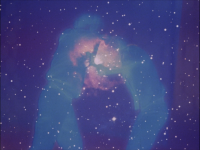
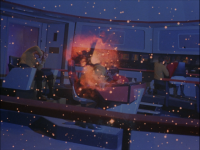
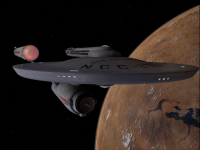
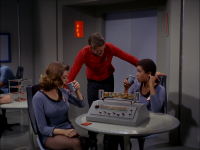
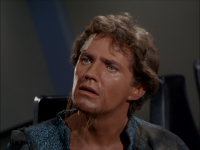
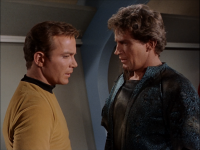

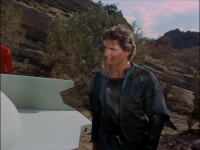
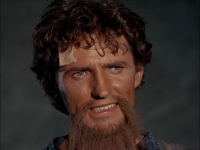
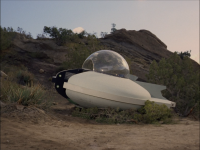
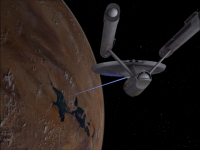
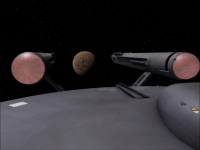
Star Trek TOS - 1x27 - The Alternative Factor
Originally Aired: 1967-3-30
Synopsis:
An alien being fights himself between two realities. [Blu-ray] [DVD]
Filler Quotient:
3, bad filler, totally skippable.
- If you skip only one episode of all of Star Trek, let it be this one.
Problems
- The entire episode's premise is an unworkable problem. See my review below for more details.
- Spock says the entire magnetic field of this "solar system" simply blinked. This is a common error. The term they were looking for is planetary system. The planetary system we live in is called the Solar System because our star is named Sol. As such, the term "Solar System" is a proper noun, not a generic term.
- Why wasn't the clearly unstable Lazarus under more heavy guard throughout the episode? The guards seemed to come and go whenever they wanted.
- Lazarus' fake beard seems to change in thickness throughout various scenes. The most obvious (and unintentionally humorous) example occurs around 24 minutes and 20 seconds into the episode.
Factoids
- This episode establishes that there are at least 431 people aboard the Enterprise at this time.
- This episode is the winner of my "Worst Episode of TOS Award" and is also the winner of my "Worst Episode Ever Award."
Remarkable Scenes
- Just when you think the technobabble and bad science can't get any worse, it gets worse. All through the episode.
My Review
The Alternative Factor is an overwrought story in which the fate of two entire universes hangs in the balance over what amounts to little more than an incoherent stream of technical nonsense vomited at the screen by nearly every character. Vague, half-assed references to parallel universes, time travel, dilithium crystals, and antimatter get strewn about the dialog as if they somehow constitute a satisfactory explanation for the incessant glowing, psychedelic flashing, screeching, and noisy interludes which mightily assault your visual and auditory senses every few minutes. Production quality on Star Trek was never something to write home about, but this episode's is unforgivable.
But even with better production quality, there would be no saving the science in this story. The most incoherent scene is when after a lengthy discussion filled with pseudoscientific reasoning, Kirk and Spock deduce that the two Lazari must be matter/antimatter opposites from parallel universes. They further reason that their cosmic battling is what's causing the universe to occasionally "wink out" because an antimatter Lazarus coming into contact with a matter Lazarus would, they surmise, destroy both universes. Except for the pesky fact that that makes no sense at all and it isn't even consistent with what appears on screen.
Assuming for the moment that it's possible for a parallel universe made up entirely of antimatter to exist and that a man from an antimatter universe and a man from a matter universe could ever come in contact with each other via some means similar to what's depicted in this episode, then the two men in question would most certainly not enter into some sort of cosmic psychedelic wrestling match as this episode depicts. Instead they would instantly annihilate each other. Moreover, their mutual annihilation would not destroy any universes, let alone two. Their mutual annihilation would not likely even destroy a single planet, seeing as how planets like Earth have withstood repeated asteroid impacts which released considerably more energy than the ~90kg matter/antimatter explosion the two Lazari would yield.
A related problem is introduced when Kirk accidentally travels to the antimatter universe. Since Kirk is made up of matter, the very moment he came into contact with anything from the antimatter universe, he and it should have instantly annihilated one another. And while we're on the subject of the episode's bad science, Spock mentioned that he used the ship's dilithium crystals to localize a source of radiation on the planet. Setting aside the fact that that line makes no coherent sense at all, Spock later contradicts it entirely by saying that the ship's instruments cannot see the radiation at all; a statement which by itself doesn't make a lot of sense because the radiation source is visible to the naked eye. Do none of their sensors measure visible light?
As if the bad science in this episode weren't enough, the actual storytelling is abysmal. Once again we revisit Star Trek's tried and true cliche in which the mystery guest of the week fails to adequately explain what's going on despite repeated direct, pointed questioning. We don't want to let the plot move too quickly now, do we! There is some legitimate dramatic appeal in the idea behind a story about two identical men seeking to destroy one another, but whatever potential there is in the idea drowns under the weight of bad writing, bad science, bad production quality, and bad acting.
The climax of absurdity is Kirk's final line, "What of Lazarus? What of Lazarus?" Uttered in a fashion intended to be thoughtful and reflective, the line is in fact overwrought and laced with false profundity, much like the rest of the story. I didn't think it was possible for an episode of Star Trek to be worse than Miri, but here it is folks. Do yourself a favor and skip this one.
The following are comments submitted by my readers.
- From Tim on 2006-05-07 at 7:50pm:
I SO Agree with this review! Spot on. I HATE this Episode. - From Orion Pimpdaddy on 2007-12-13 at 3:05pm:
I just watched this episode with my wife and I have to say we were not entertained. I think the whole universe blinking out thing was too over the top. Neither of the two Lazaruses were interesting, especially compared to other guest stars you normally see on the show. Also, you can kind of tell when the actors think that the episode is bad; everyone seemed subdued here. I would have also liked a little more background about Lazarus and his people. There are so many unaswered questions. I gave this stinker a 1, not a zero, because it was original. That is the only good thing to say about it. Warning: do not watch this episode late at night, you'll fall asleep! - From TashaFan on 2008-09-11 at 6:00am:
I agree with every point made so far. Where is the parallel Enterprise? The other universe seems to be empty. How does "our" Enterprise limp away without retrieving the 2 dilithium crystals left in the parallel universe? Two particles, identical but one "anti" and one not, destroy EACH OTHER totally, not the ENTIRE UNIVERSE. And, the biggest problem, where the heck is the DOOR to Lazarus's ship? The front of it is just a big empty HOLE! He must get a lot of bugs in the face flying through the atmosphere. - From b goldstein on 2012-01-08 at 3:56pm:
It's nitpicky, I know, but Solar system is generic. It is a set of planets rotating around a star.
Ours might be the "Sol system" - From Kethinov on 2012-01-08 at 6:25pm:
Sorry Goldstein, that isn't correct. Sol is the Latin term for our star. Thus the term "solar system" only refers to our system because the term "solar" is an adjective derived from Sol.
A lot of people mistakenly believe "solar system" is a generic term precisely because Star Trek and other media like it made this error over and over again. But just because it's a common error doesn't make it any less an error.
If you pay close attention, you'll notice that later Star Trek eventually corrected themselves and began using more correct terms over time, although the occasional error will still creep in. - From Mark on 2012-05-02 at 3:23am:
Wow! I'm watching all of the original series episodes on Netflix. I've loved them so far. Then I came to this one. I thought to myself that this one MUST be the worst episode ever. On a whim, I Googled "worst Star Trek episode," and this page came up. I LOVE that I'm not alone in disliking this episode. However, Uhura's legs are awesome. - From Cameron on 2012-08-22 at 8:27pm:
I agree in so many ways -- there's nothing resembling a story arc, just a bunch of disjointed incidents. As for the "science," I'm willing to suspend disbelief for something dramatically compelling.
But my next point: I frankly envy you who are so dismissive that the harshly disturbing resolution didn't "implant" in your brain like with many of us. I was on a forum with a woman saying she saw this years ago and it still bothers her. Me, too - for all this episode's sins I give it a perverse credit. The idea of the ultimate sacrifice being not death, but having to eternally endure combat in that nauseatingly spinning chamber. It still bugs me when I'm reminded of it. Maybe a quality episode could be made with a similar ending - but I'm not sure I'd enjoy it. - From warpfactor 10.1 on 2012-09-10 at 1:24pm:
I want 50 minutes of my life back. This was so tedious. I wish I had read your review first and avoided it. I did fall asleep for part of the time and I can only be thankful for that. Don't watch it; you'll hate yourself. - From Tom Gettins on 2012-09-16 at 8:48pm:
I watched this episode as a kid - and I found the payoff (Lazarus fighting a loony for eternity to save the Universe) quite haunting.
Bad science? What bad science? It happened people!
There IS a small corridor between parallel universes to act as a safety cut out for bad AM confinement.
We owe thanks to the original research carried out by Star Trek writers.
Otherwise we wouldn't know that Anti Matter only affects people that it is related to. - From Glenn239 on 2012-10-20 at 12:13pm:
'1'. My favorite bit is where Star Fleet determines that a threat to the entire galaxy exists in Enterprise's sector, so it runs away and tells Kirk to handle it alone.
I save '0' scores for episodes so bad that I would not watch them again, being wretched enough that I don't even consider them part of the series. This one is horrendous, up there with waterboarding if inflicted repeatedly upon prisoners against their will, but not quite so traumatic that I can't rule out another peek in 10 or 20 years.
- From Oz on 2012-12-16 at 4:42am:
The use of uncapitalzed (or spoken) "solar system" to refer to another sun with its associated planets is fine. This is much the same as the Church largely refers to the Catholic church, where "church" is any church. I don't think we would call our solar cells something else just because we were on Vulcan. "Sol" refers to the Roman sun god. Great website by the way. - From Kethinov on 2012-12-16 at 7:09am:
Thanks Oz.
The use of "solar system" is definitely not correct. It's not a generic term, it's a proper noun. People get this wrong a lot and most science fiction frequently misuses the term. - From Sloop on 2013-08-30 at 2:05pm:
This is the first TOS episode I had to watch a second time just to take it all in. With regards sloppy science, pacing, repetitive effects etc, almost all of the TOS episodes have plotholes so I think we should cut 'Alternative' some slack. Its ambition alone makes it a worthy episode. For me, Mudd's Women is the poorest season 1 episode. - From Tooms on 2013-09-07 at 3:17am:
I think it would be more correct to say there is no standard term for a star and planetary system outside of the solar system. If there is no official term, I don't think it's necessarily an error to use solar system. It's possible that will eventually be the standard term. It's just not something that we've needed a term for until recently. The study of geology on another planet would probably still be called geology even though geo means "earth".
As for this episode, definitely a 0! - From Kethinov on 2013-09-08 at 7:00am:
There is a standard term. The term is "planetary system" which is well documented by the scientific community.
Geology on other planets is still geology. The Latin root comparison is wrong because "geo" is the Latin word for earth, not Earth. The term "earth" can be generic to refer to the ground or soil, whereas "Earth" is a proper noun referring to our specific planet.
Such is not the case with Sol. There is no accepted generic form like with earth and Earth. - From John on 2013-09-09 at 11:22pm:
I have just watched the episode and, of course, I immediately hit the internet with a search for a review...I found the episode irritating at best, and I needed to see I am not alone in being totally dumbfounded by the 'science', the plot and the uninspired acting.
With regard to the science, I understand that writers were under no obligation to provide scientifically accurate details to their stories. Even if it was a not-so-secret agenda of the show to promote interest in science, kindling interest in something is not the same thing as explaining it or teaching it. You learn science from books on science, not from a tv fantasy show. However, kindling interest is one of the things what they dismally failed to do here. The confusion caused by Kirk touching antimatter to go into the parallel universe (as antimatter?) then coming back to send...whatever, its irritatingly confounded!!
As for the ending, it is haunting, true. But it comes after such a bungle of ideas and underdeveloped themes that it loses much of its force. It is a pity as the theme of personal sacrifice (with its references to abortion, public health and social policies) is an important and recurring theme throughout the star trek shows. It would have made an excellent contribution to the franchise but not this terribly scripted stinker.
Excellent site, by the way!! - From Tooms on 2013-09-11 at 7:20am:
The term planetary system does not include the star. Sol and it's planetary system make up the Solar System. Much as you compare earth to Earth, you could also compare the Solar System to a solar system. You could use extrasolar system to be more descriptive, but there is no standard term for a star and its planetary system other than our own. - From Kethinov on 2013-09-11 at 4:03pm:
Tooms, your post is full of misinformation.
"The term planetary system does not include the star."
Yes it does. A planetary system cannot exist without something for the planets to orbit. The term necessarily implies a central star.
"Sol and it's planetary system make up the Solar System. Much as you compare earth to Earth, you could also compare the Solar System to a solar system."
There is no "solar system" generic term. The term literally doesn't exist. Lots of people think it does, but it doesn't. It's not recognized by the scientific community. There is only "Solar System" the proper noun.
"You could use extrasolar system to be more descriptive, but there is no standard term for a star and its planetary system other than our own."
That's not true. There is a standard term. The term you're looking for (and what Star Trek is looking for) is "planetary system." That's the term the scientific community uses when referring to a system of planets orbiting an arbitrary star.
There's tons of information out there confirming what I've been saying. Look it up! - From jeffenator98 on 2013-09-26 at 6:08pm:
My favorite part is when Lazarus opens the panel in the hallway and switches a couple of Radio Shack type fuzes to start a fire.Uhuras legs are awesome. - From Deggsy on 2013-10-05 at 12:30am:
Part (but not all) of the incoherence in the story is due to extensive rewrites caused because originally, there was a romantic subplot between Lazarus and Lt Masters, but the actress hired was black and the network didn't want to upset the Southern markets, so it was hastily rewritten to put in more planetside scenes of Lazarus falling and other crap. - From Tony Cole on 2013-11-16 at 1:32am:
I really think you people need to get over the solar vs. planetary argument.
Who cares?
The last comment I read was the most compelling. The one about the deleted romance. It explained a lot of the disjointed scenes, the repetitive, boring hikes on the planets surface, the lack of scenes with anti-matter Lazarus. Even as a young kid I remember the controversy over Kirk's kiss with Uhura. But I agree this one's a stinker! - From SheriDH on 2014-02-03 at 12:50am:
As I watched this episode, I kept wondering where Scotty (James Doohan) was? Lt. Masters had a blue uniform (usually implying science or medicine although that's not consistent in the series), what was she doing in engineering with no sign of Mr. Scott?
Interesting comment about the scenes that implied a romance between Lazarus and Masters being deleted - what's the source for that? - From Scott Hearon on 2014-03-31 at 9:33pm:
Wow. Atrocious episode, on nearly every level.
I would give a blow-by-blow of what bothered me, but Kethinov and all of the other commenters have done it for me.
On top of the serious logical errors with the plot, the episode was just plain boring. Raving psychos are usually boring, and Lazarus was another example (and what are the chances that some dude from a far-off planetary system is named "Lazarus," anyway?). The acid-trip wrestling matches were equally tedious.
I had read that this episode was bad, but I'm forcing myself to watch the entire first season (I've never seen any of them before), the good, the bad, and the ugly. The one was one of the absolute worst, along with "Miri." - From Mike Chambers on 2016-10-02 at 6:35am:
Horrible science aside, this episode actually would have been decent if you were to cut out about 30 minutes of completely useless scenes. - From Chris on 2018-01-21 at 3:16am:
I'm late to the Solar system debate and I understand Kethinov's complaint, however, I hear astronomers refer to OUR solar system all the time which would imply that there are others. While it may be technically incorrect, everyone understands what is meant. Just sayin'...
How come no one mentions the goofy Jetsons spaceship?!? What a ridiculous craft!!!

Star Trek TNG - 1x05 - The Last Outpost
Originally Aired: 1987-10-19
Synopsis:
The crew encounters Ferengi bandits. [DVD]
Filler Quotient:
3, bad filler, totally skippable.
- While this is the first appearance of the Ferengi, it is not necessary to see this episode to understand later episodes, even Ferengi-centric episodes.
Problems
- Geordi says that the Ferengi are "now angling through that solar system." This is a common error. The term he was looking for is planetary system. The planetary system we live in is called the Solar System because our star is named Sol. As such, the term "Solar System" is a proper noun, not a generic term.
Factoids
- Armin Shimmerman, one of the Ferengi in this episode eventually goes on to play a regular Ferengi character on DS9 named Quark. He also guest stars as Quark in both a later episode of TNG and Voyager making him one of very few characters/actors to play in at least one episode in all three series.
- This episode establishes that Ferengi are capable of resisting Betazoid telepathy.
Remarkable Scenes
- The Chinese finger trap scene.
- The Ferengi expressing disgust at "clothed females."
My Review
Another stylistically awkward episode, but not as bad this time. The Ferengi are thought to be a serious threat at first, but it turns out that they were merely posturing to appear more threatening than they actually were. In reality they are mostly harmless and totally ridiculous. Meanwhile, yet another godlike alien shows up and also appears to be a serious threat at first, but is soon mollified by Riker answering a few riddles. Riker then gets all chummy with this "guardian of the Tkon Empire" who for some reason isn't all that broken up about having slept through the demise of his entire nation.
Contented with having an insufferably smug conversation with Riker about the inferiority of the Ferengi right in front of them, the guardian then disarms the automated weapon that disabled both the Enterprise and the Ferengi ship, then makes known his intent to return to his everlasting coma, possibly never to be seen again by anybody ever. Okay. Right. Sure.
Clearly these parallel scary aliens who turn out not to be so scary after all were meant to mirror TOS: The Corbomite Maneuver, one of TOS' less savory episodes. This episode manages to only slightly improve on the original's formula by having slightly less terrible pacing. It appears they also wanted to evoke TOS by beaming over the Chinese finger traps to the Ferengi ship. This is similar to how Scotty beamed over the tribbles to the Klingon ship in TOS: The Trouble with Tribbles.
Setting aside Star Trek's oft-overwrought stylistic choices though, there are some nice details here. It's nice to see the Ferengi make an appearance, who were first mentioned in Encounter at Farpoint. The designs of their ship, alien makeup, and their weapons were memorable too. And while their function as a caricature of capitalism was as overwrought as most of the rest of the episode, the idea of portraying a less socialist and more capitalist version of the Federation on Star Trek is intriguing. As such it would be well worth exploring the Ferengi in more depth later, though next time hopefully less childishly.
The following are comments submitted by my readers.
- From DSOmo on 2007-05-27 at 3:19pm:
Changed Premise: during this episode, Troi says she "senses the Ferengi captain is hiding something." In the future episode "Menage a Troi," Betazoids cannot read Ferengi minds.
- Just after the force field seizes the Enterprise, something begins reading information from the ship's computer. When Data's workstation is shown, some of the information is being displayed upside down (i.e. the Klingon and Federation symbols.
- In Picard's first attempt to contact the Ferengi, he asks Yar to open hailing frequencies, and she quickly responds. Then Picard says, "At least we won't begin with weakness." Why would he say something like that with the hailing frequencies open? That is the last thing he would want the Ferengi to hear!
- When the away team beams down to the planet, Riker appears alone. He begins walking around and yelling for the others. Why doesn't he just use his combadge? It is true that Data later discovers the communicators are out, but Riker never even tried to use his. - From Bernard on 2007-09-30 at 12:10pm:
I don't rate this episode very highly now, but I do find it to be a bit of fun and at the time I thought it was fascinating. Probably because of the following;
A good glimpse at a new race that have some kind of genuine technology and menace (not for long though)
Riker gets something of a centre stage while picard is stuck on the ship (something that happens many times over the first 2 seasons)
The start of this episode is great, the tension created by following the unknown ferengi (which soon evaporates as the story unfolds)
overall not a terrible outing for me, but too many weak points - From Jeff Browning on 2011-10-20 at 9:51am:
An interesting, if small, detail: In early TNG when establishing communications, Star Fleet personnel say "open a frequency". Later this shifts to "open a channel". Not sure for the reason for this change, but "open a channel" sounds better to me. - From Jim on 2011-12-25 at 2:28pm:
Geordi's reaction to Riker's plan to jump to Warp 9 then "come back fightin'" is far and away the worst line and the most poorly delivered line in the entire series. - From Azalea Jane on 2021-07-04 at 6:22pm:
This ep certainly isn't the worst of Season 1. It's not quite "bad," per se, but there's not a whole lot redeeming about it either. Watching it this time, though, it sparked a new idea for something I can do during my current rewatch: I'm calling it "Data's Emotionspotting." I know a lot of it in this episode is first season awkwardness, but even later on, Data displays MANY expressions that could be interpreted as emotive or illogical. It's clear that Soong has programmed him to have at least *some* quasi-human reactions to things (such as interest and confusion), even though he reports not experiencing the emotions themselves. That's actually somewhat believable, considering what we find out about Lore later.
Examples of Data's weird behavior in this episode:
- his aside to LaForge about second officers. He'd display no dismay or relief, especially around a comment that doesn't not actually affect him. It was a cool little camera trick, and kind of a funny line, sort of, but it's so out of character it just feels gratuitous.
- his offhand comment about Yankee Traders while the Ferengi captain was onscreen. Unprompted and -- as he should know -- counterproductive. Data is usually cautious about talking out of turn.
- when he gets his fingers stuck in the finger trap, he seems embarrassed. Also, he should be strong enough to break the finger trap! (BTW, what was that finger trap doing there in the first place?)
I wonder what TPTB (the powers that be) were thinking when they designed the Ferengi in this episode. Could they not see how pathetic and dislikable the Ferengi are here and how unconvincing of a villain they are? Fortunately TNG did come up with some very worthy antagonists like the Borg and the Cardassians later on.
Nitpick: on the planet in front of the Portal guy, they keep referring to "humans" when Worf, a Klingon is standing right there, and nobody points it out. This is a continuing problem throughout the series, too - Troi, Worf, and/or Data are constantly lumped in with "humans", even though Troi is half human, Worf was only raised by humans, and Data is a human-shaped android lacking (most) human emotion -- none of them full humans.
Agreed with Jim above how LaForge's line about "come back fighting" is cheesy as hell! - From kevin on 2021-09-01 at 11:32pm:
Wow, I just watched this today, in 2021, have not seen it for literally 30 years. I forgot the story. The beginning is QUITE suspenseful and has great music and packing. I was tense and trying to figure out what the Enterprise and crew were going to do. THEN....They hit the planet with the Ferengi and the story goes mostly to hell. It becomes an old TOS type story, and is silly on top of it. SO, not horrible, but just quite blah overall.

Star Trek TNG - 3x24 - Menage a Troi
Originally Aired: 1990-5-28
Synopsis:
The Ferengi kidnap Counselor Troi and her mother. [DVD]
Problems
None
Factoids
- Ethan Phillips who plays a Ferengi in this episode goes on to play Neelix in Voyager later.
Remarkable Scenes
- Lwaxana avoiding the Ferengi.
- Picard avoiding Lwaxana.
- Lwaxana continuing to treat Deanna like a child and Deanna finally getting annoyed with it for once.
- Picard getting Riker back with the shore leave impositions.
- Betazed. Such a beautiful Federation world. We see so little of it :(
- Lwaxana called Tog a "demon" as opposed to his Ferengi title "daemon."
- Tog beaming the women out of their cloths.
- Riker tricking and angering his Ferengi captor with chess trash talking.
- Wesley's solution.
- Picard professing his love for Lwaxana. Sucking at first, doing well later.
- Picard's bluff.
- Picard ordering Wesley to set course for Betazed at warp 9 to avoid Lwaxana!
- Wesley's promotion.
My Review
Finally a Ferengi episode where the Ferengi are completely in character. This episode is nice for its cheeky humor and interesting tidbits, but little more.
The following are comments submitted by my readers.
- From DSOmo on 2007-07-29 at 8:15pm:
- Changed Premise: This episode makes the point, several times, that Betazoids cannot read Ferengi minds. Troi is half Betazoid. That means her empathic capabilities are scaled-down versions of a full Betazoid's telepathic capabilities. Yet in several previous episodes, Troi comments that she senses certain emotions from the Ferengi.
- At some point the Ferengi gave up their "phaser whips." In "The Last Outpost," the Ferengi used a bullwhiplike device that emitted a stream of energy when snapped. In this episode, the Ferengi use more conventional-looking weapons.
- When Lwaxana beams from the Ferengi ship to the Enterprise, she starts out sitting on the Ferengi captain's bed and ends up standing on the bridge. In other words, the transpoter had to rearrange her skeletal-muscular structure in transit.
- I think Wesley would do a lot better with the women if he'd remember to zip up his pants. The pants on Wesley's "acting ensign" uniform don't close all the way in back! Maybe his promotion and Starfleet uniform will help ;) - From JRPoole on 2008-04-15 at 5:23pm:
Uggh. My general disdain for Ferengi episodes aside, this is still a mess. I can't buy the way Riker is able to make subtle shifts in the warp signature without being able to read Ferengi. I can't buy the Ferengi themselves; they're just to ludicrous. I can't buy the new-found (and then suddenly lost again in subsequent episodes) chemistry between Riker and Troi. This one is a zero for me. - From Kethinov on 2008-04-15 at 8:18pm:
Keep in mind, JRPoole, that it's always been implied that the universal translator allows people to read alien languages as well as understand the spoken variety. - From JRPoole on 2008-06-13 at 7:06am:
I guess you're right about the universal translator. But that would that mean the translator is inside the brain? - From CAlexander on 2011-05-26 at 2:34pm:
I don't much like Lwaxana, I don't much like the Ferengi, and the combination of the two is almost too much to bear. The only parts I liked were Riker's escape from the prison cell and Picard's Shakespearean performance at the end. - From Bronn on 2012-10-19 at 9:13pm:
What I hate about Lwaxana is that, for a telepath, she's so terribly uninsightful. Also, I hate Deanna for telling her that she needs to speak out loud around non-telepaths. She already is too overbearing and loud to begin with. - From TDV on 2014-07-28 at 6:35pm:
The worst part of this episode is that it provided the still frame for all the horrible "annoyed picard" gifs on facebook!

Star Trek Pic - 1x09 - Et in Arcadia Ego, Part 1
Originally Aired: 2020-3-18
Synopsis:
Following an unconventional and dangerous transit, Picard and the crew finally arrive at Soji's home world, Coppelius. However, with Romulan warbirds on their tail, their arrival brings only greater danger as the crew discovers more than expected about the planet's inhabitants.
Problems
None
Factoids
- The title of this episode is a Latin phrase that literally translates to "even in Arcadia, there am I." The "I" is typically interpreted to refer to death and "Arcadia" is typically interpreted to refer to a utopian land. It could thus be interpreted to mean something like "even in paradise, there is still death."
Remarkable Scenes
- The space battle with Narek.
- The Borg cube showing up and then getting immediately taken down by the orchids.
- Picard's astonishment upon meeting Dr. Alton Soong: "I feel as if I'm looking at Data."
- Alton Soong regarding Picard: "They didn't listen to him after the attack on Mars and they're not going to believe him now."
My Review
This is a slow story that focuses mostly on table setting for what is likely to be a more exciting second half. There's nothing necessarily wrong with table setting episodes, but what we get here is a bit of a mixed bag. The return of Brent Spiner playing yet another relative of the renowned Dr. Noonian Soong is a welcome addition to the story. It turns out that Data's father had a biological child too who was a total afterthought by comparison to his life's work perfecting androids. This new character is a clever addition to the Soong roster, as it is quite consistent with previous material depicting the Soong family. We know Noonian Soong was married from TNG: Inheritance and it's entirely consistent with his character that he would care more about his androids than his flesh and blood son.
On this new synth homeworld we see a delightful mix of earlier model androids and later model more human-like androids, giving us a visual sense of the technological progression of Soong's and Maddox' work. We also get a lot of exposition about just what the "admonition" was which resolves some irritating problems with the story but creates some new ones too. The narrative has finally given us a barely adequate redemption for Agnes' character: it appears as though she was not in fact fully in control of her actions when she murdered Maddox. But instead of the more compelling explanation being that Commodore Oh used mind control on her, we get the idiotic explanation that she went off the rails because the "admonition" was meant for synth minds rather than organic minds, which is a quite problematic distinction. The idea that even once you cross the AI "threshold" (whatever that is exactly) that it's still possible to distinguish between an organic or a synthetic mind runs counter to the fact that the entire point of creating Data and the more advanced androids derived from Data to begin with was to make the synths as human-like as possible; to directly contradict prejudice that they could somehow be fundamentally different. Basically the whole point of creating super advanced androids is to erase the distinctions between human and android. Yet the super synth Federation relies on the continued existence of these distinctions in order for its "admonition" to be received and understood by anybody.
The main message behind TNG: The Measure of a Man—the brilliant episode this season is serving as a sequel to—was also that there are no meaningful distinctions between the personhood of androids like Data or people who were born of flesh and blood. The notion that even now androids and organics can be separated into "us" and "them" categories so cleanly that tools can be built that can deliver telepathic messages effectively to one group but not the other because there's something genetically (so to speak) different about them undermines the original moral of the story here that any differences between these groups are more surface details than substantive. The moral of the story now is we're all the same, except oh wait there's something fundamental about your body that makes you irrevocably different from me. Yuck. The writers would've done better to have taken a page from Battlestar Galactica which—while it had serious flaws in its own writing in places–did well to make the point that the Cylons were equals to humans to such a degree that the distinctions between them were totally erased by the end of the story. As such the idea that Agnes was under the influence of mind control would've been a much better way to deal with this than this incredibly dumb "only synths can process the message" nonsense. A shame.
Another painful though minor detail was Raffi being given a magic tool to fix the La Sirena with and being told simply that it "fixes things" as though no further explanation should be required. What a marvel! Someone tell the Pakleds from TNG: Samaritan Snare. This is a tool that's on their intellectual level. They look for things. Things just like this. Things to make them go. Raffi thankfully was interested in a bit more nuance than Pakled-level simplicity and asked "how?" She was then told "you have to use your imagination." After that Raffi got as tired of that scene as the writers clearly were, shrugged, and moved on. Want to know what magic powers that Deus Ex Machina: The Tool has to offer? Tune in next week and we might find out!
This episode also continues the sad trend of relegating anything Borg-related to weak tea subplot status. It's curious that there already was a Borg transwarp conduit just above the synth homeworld, which implies the Borg have been to this planet before. Did the planet have an original population many years ago that was swept up in some kind of TNG: The Neutral Zone-style Borg Ragnarok ("Borg? Sounds Swedish...") assimilating everyone on the planet sometime before Alton Soong arrived and established it as the synth homeworld? Unfortunately the episode doesn't get into this, nor does anyone in the story appear to consider that the existence of a Börg transwarp conduit just above that planet continues to pose an ongoing threat to its population. Worse yet, Seven of Nine's commandeered Bjørg cube got taken out before it could do anything cool.
Lastly now that we've gotten a full explanation of just what the "admonition" was, the trend of anticlimactic payoff is continuing. Aside from the aforementioned borderline racist undertones that there will always be something fundamentally different between synths and organics, the idea that there's some secret synth super Federation out there spanning multiple galaxies just waiting to appear from nowhere to rescue synths from organic oppression is incredibly overwrought and unimaginative. Once again we're facing a threat to everyone everywhere that comes out of nowhere and will surely be disposed of from whence it came in short order. The writers of Discovery and now Picard seem to think that just constantly amping up the stakes is a good substitute for actual substance, but all it does is tip their hands that they're more interested in writing comic book pulp—complete with mustache-twirling villains like Sutra and Commodore Oh—than more thoughtful, deeper stories. So while this is an improvement over the last episode—they mostly fixed Agnes and the introduction of another Dr. Soong is a clever and welcome development—much of the rest of the payoff continues to be unfortunately underwhelming. Hopefully the next episode steps up the writing quality.
No fan commentary yet.

Star Trek TNG - 5x22 - Imaginary Friend
Originally Aired: 1992-5-4
Synopsis:
A little girl's imaginary friend threatens the ship. [DVD]
Problems
None
Factoids
- We're told in this episode that Geordi's parents are both starfleet officers. His mother a command officer and his father an exobioligist.
Remarkable Scenes
- Watching the red dot thinger travel around through things. A nice bit of graphics work.
- Data and Guinan debating the image in the clouds.
- Guinan describing her Tarkassian Razorbeast imaginary friend.
- Isabella striking down Troi.
My Review
It's always nice to see Troi doing her counsellor job, which she does well in this episode. Beyond that this episode is largely unremarkable except in that it is the final episode of the season to deal heavily with children, a trend which was prominent in this season. In some ways I say good riddance. In other ways I think it was productive. In the first episode, Picard informed Riker to make certain that he was kept away from all matters that dealt with children as much as possible. In this season and especially this episode he seems to have finally lightened up from that.
The following are comments submitted by my readers.
- From DSOmo on 2007-10-02 at 6:42am:
At the beginning of the episode, Clara states that Isabella has pierced ears. When Isabella materializes, her appearance exactly matches Clara's description, except Isabella doesn't have pierced ears. - From djb on 2008-04-20 at 12:03am:
This episode was largely a waste, except for a couple things:
Data says the "clouds" look distinctly like a bunny rabbit!
The girl who plays "Isabella" is delightfully freaky. She gives me the creeps! - From curt on 2010-04-07 at 8:57pm:
DSOmo is that supposed to a plothole or something? Everything you identify as a problem is so ridiculously unimportant or not a plothole at all. You say it as if you've uncovered something amazing, and crucial to the episode. - From CAlexander on 2011-03-26 at 4:43am:
The only part of this episode I liked was the end, where Picard figures out how to pacify the aliens and makes his little speech. I thought the idea of aliens judging humanity through children could have been the plot of an interesting episode." But not this episode, which was more of a children's story about how an evil ghost, who grownups don't believe in, gets you into trouble. - From Bronn on 2012-12-01 at 7:21am:
Actually think there's some unintended hilarity in this. We know how Picard hates children (though this comes after episodes like "Disaster" where he starts dealing with them more prevalently).
When he hails Worf over the comm, asking for security to be on the lookout for a dangerous alien masquerading as an 11 year old blond girl, Worf seems to take it completely in stride. I had to laugh and imagine that it's not the first time that the Captain has asked for security to detain children that he didn't want to deal with. - From Mike on 2017-04-23 at 7:13pm:
Well, hopefully Clara doesn't need too much therapy after this. I'm sure Ensign Sutter is happy that psychological treatment is free on a 24th Century Federation starship.
I'd put this one at about a 3. It suffers from the same problem as several of the more mediocre Trek episodes. The crew encounters an intriguing new phenomenon, alien, or problem of some kind which takes up about 45 minutes of the episode. It reaches the denouement and tries to wrap it all up in about 3-5 minutes, usually poorly. I liked Picard's confrontation with "Isabella" but it would've been nice to learn a little more about these life forms rather than spending so much time on Clara's imaginary friend issue. I get it, though. TNG did try at times to cater to the younger age group, so they occasionally have these messages directed toward kids. That's the only explanation I could come up with for why we have multiple scenes where Guinan talks about her own imaginary friend.

Star Trek Voy - 3x20 - Favorite Son
Originally Aired: 1997-3-19
Synopsis:
Kim becomes convinced he's a native of Taresia. [DVD]
Problems
None
Factoids
- We get to see Harry's mother in his dreams.
Remarkable Scenes
- Tuvok: "Perhaps you are experiencing a paradoxical state-dependent associative phenomenon." Janeway: "Déjà vu."
- Kim firing on the alien ship seemingly unprovoked.
- Harry tying up one of the women and knocking out the other to escape.
- The beam out.
- Harry and Tom talking in the end.
My Review
Another "Harry finds paradise" type episode. Unfortunately, the aliens in this episode were far more interesting than Harry's situation. I would have preferred to see more confrontation between the two peoples and perhaps some kind of outlining of their history, but we didn't get it. It's remarkable to note that every time Harry finds paradise, it's a fake and it's ripped away from him. I wonder why the writers enjoy doing this to him? Poor guy.
The following are comments submitted by my readers.
- From David in California on 2007-10-02 at 8:00pm:
Sorry, but this one was sooooo cheesey, IMO. My least favorite Voyager episode so far in my current viewing (or re-viewing, depending) of them all in sequence. The aliens' scheme was clever, but everything else about them--costumes, behavior, etc.-- as well as the way the story played out plot-wise might have made for an average episode of ST:TOS and fit in with that '60s era, but for the '90s I can't believe they thought this wouldn't be silly. - From Wayne on 2009-07-20 at 5:04pm:
This episode is remarkable for one reason. Look closely at the girls. One of them is Kristanna Loken!
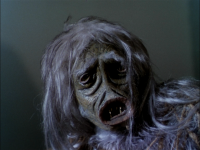
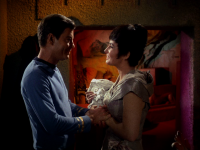
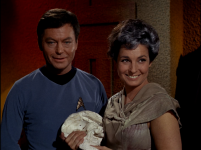
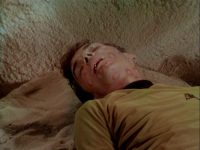
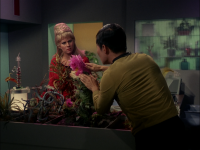
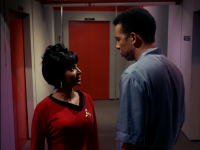
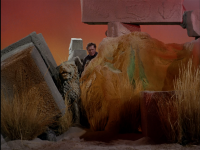

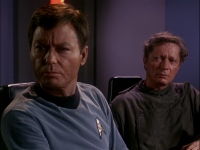
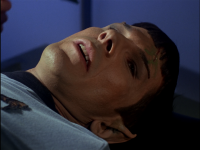
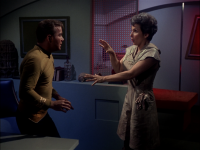
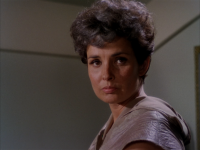
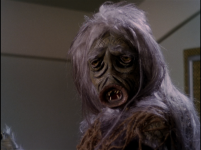
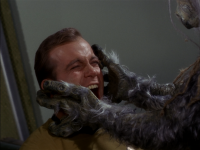

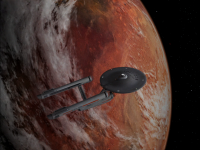
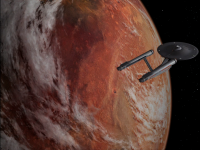
Star Trek TOS - 1x01 - The Man Trap
Originally Aired: 1966-9-8
Synopsis:
A shape-shifting, salt-craving creature terrorizes the crew of Enterprise. [Blu-ray] [DVD]
Filler Quotient:
2, filler, but an enjoyable episode nevertheless. You can skip this one, but you'd miss out on some fun.
- There's no essential plot or exposition in this episode that renders it unskippable, but it's a decent episode, if a bit slow.
Problems
- In Nancy's first scene she walks onto the set singing before being startled to see McCoy. While she's singing, you can clearly see that her lips are not moving.
Factoids
- This was the first episode of Star Trek to air on national television. The true pilot, The Cage, was never aired during the show's original run.
- Vulcan has no moon according to Spock in this episode.
- The "great bird of the galaxy" Sulu referred to in this episode is actually a reference to a nickname given to Gene Roddenberry by the production staff.
- This episode establishes that Buffalo on Earth are extinct at this time.
- This is the first episode to depict Vulcans' green blood.
Remarkable Scenes
- McCoy and Kirk arguing over how young McCoy's old girlfriend looks.
- McCoy: "He's dead, Jim." Count 1.
- Uhura toying with Spock.
- Kirk yelling at McCoy for changing the subject to his old girlfriend again just after discussing the dead crewman.
- McCoy and Kirk needling Crater for information concerning the connection between his desire for salt and the crewman's death.
- Sulu: "May the great bird of the galaxy bless your planet."
- Kirk and Spock coordinating a stun attack on Crater.
- Crater and "McCoy" trying to defend the salt monster's right to live.
My Review
A considerable time since the events of The Cage, The Man Trap introduces us to a brand new cast and crew of The Enterprise with Mr. Spock being the only recognizable character retained since Captain Pike's days. Captain Kirk now commands the Enterprise and Leonard McCoy is now the chief medical officer. Other new and notable characters include communications officer Uhura, ship's pilot Sulu, and yeoman Rand, who all do quite a nice job of rounding out the cast.
It's important to note that since The Cage never aired until after Star Trek was canceled, The Man Trap is the first episode of Star Trek that original audiences ever saw. As such, the universe of Star Trek is first introduced here. Much like The Cage, The Man Trap depicts a highly technologically advanced future for Earth where presumably ships like The Enterprise roam the galaxy both exploring new space and resupplying and otherwise assisting Earth's various colonies.
As evidenced by Mr. Spock, some aliens even live amongst the humans, however their citizenship status remains unclear. At this point, it's not made clear whether or not Earth exists as a nation or if Earth is just a member state in a much larger nation. Not all aliens are benign, friendly allies like Mr. Spock though, as the salt monster clearly indicates.
Framing the salt monster as an endangered species that should be protected was a particularly clever way to enhance what is, frankly, a meager plot. Right from the beginning we know that Nancy is not all she appears to be, and it doesn't take too much longer for her odd preoccupation with salt to become obvious not just to the audience, but to our heroes as well. Because of this, the plot seems to drag on at a painfully slow pace, what with four extras dying and even Crater dying before Kirk figures out what's going on.
Despite that though there are certainly some nice touches even beyond the endangered species commentary. I liked Kirk's and Spock's coordinated non-lethal attack on Crater along with the attention to detail concerning Spock's alien anatomy. The salt monster itself, once its true form was revealed at the end of the episode, was an impressive costume as well despite it being simply a guy in a rubber suit. Overall The Man Trap is an effective story, but it could have been better if it had a subplot; especially one that focused more on exposition about Earth, the Enterprise, and the nature of their mission.
The following are comments submitted by my readers.
- From Orion Pimpdaddy on 2007-11-27 at 5:53pm:
I rated this episode a 4. The pacing is too slow, especially in the second half of the episode. You feel like your watching it in slow-mo. One plus is that the dialog between Kirk and Bones is emotional and passionate. - From rpeh on 2010-06-22 at 10:00pm:
While it's true that this episode is a bit slow, it has to be. Remember this was the one that had to introduce a whole new show, so there was bound to be a bit of an introduction to people, what they could do, where they came from and so on.
The mistake here is that the alien is revealed to the viewer within the first... 3 minutes. We then end up waiting for the crew to catch up with what the audience knows. Later episodes worked out how to do this much better.
I'm writing this 44 years after the program was first broadcast, and it's still watchable. That can't be a bad start! - From CAlexander on 2011-03-26 at 11:17pm:
I just rewatched this episode, and thought it was quite good up until the final confrontation. Of course this was the first episode shown, but after watching so many other Star Treks there is something a bit refreshing about this monster. In your typical TNG episode the monster is some unstoppable menace that requires a brilliant plan or new invention to defeat. The salt vampire really isn't so overblown. It never seriously threatens to destroy the Enterprise. It is enough for purposes of the story that a killer is on the loose, and Kirk has to stop it.
Monster stories usually involve a lot of foolishness by the crew, but in this case I thought everyone reacted fairly logically, given that they think this is a routine checkup (except for the usual question of why the bridge crew has to do everything for themselves). The first death triggers an immediate investigation. Once Kirk sees the second death, he stops messing around and nobody dies on the planet after that (it just takes them a while to find the third death). Once he finds crewman Green's body, he immediately alerts the ship. The fourth death has basically already happened by this point. The ship goes on security alert, and for once it actually works, no more deaths after this point.
Rewatching the episode, I watched the salt vampire's behavior rather carefully, and its behavior is very interesting. It basically relies on its empathic powers to try to fit in, but it is confused and not very intelligent. It just sort of reacts to what is happening and tries to fit in and find salt, but it is basically certain to get caught. It is not a deadly, super-cunning alien menace, but a confused, hungry creature which must be stopped before it kills again. The episode is more interesting too when you try to figure out what the monster is thinking, since the pace certainly is a bit slow.
As for the professor's motives – well, he's lost his mind, he's capable of anything.
The final confrontation is not so great for me, it seems way overdramatized. Also, as has been mentioned in other forums, the total lack of any attempt to avoid killing the creature doesn't seem consistent with the idealistic philosophy of later Star Trek episodes. Well, maybe Starfleet regretted the incident and instituted new regulations to prevent it from happening again. Maybe Kirk was thinking of this incident when he later spared the Horta.
Problems:
- Kirk makes a log entry about armed men not being caught off guard unless the creature has hypnotic or paralyzing powers. Not only is this inference unwarranted, this is before he realizes that there is a creature at all, rather than some other cause of death (disease, chemicals, radiation, plants, whatever). But he doesn't seem to be making the entry at the time we hear it (we see him searching the planet), so he must have made it afterwards, and his memories were colored by his later knowledge.
- From Alan Feldman on 2011-11-14 at 1:18am:
Remarkable scenes:
At the beginning (starting at about 47s), Kirk grabs some "flowers" for Nancy. Huh? Those are not flowers. They're more like straw.
Guys, try handing these "flowers" to your honey and see what happens!
At the end of the episode (in the scene starting at 44m31s), Spock is repeatedly smacking Nancy hard -- full force, even! -- with a swinging two-handed fist right in her face! Is this not remarkable? (Yes, I know. It's "really" the salt monster. Still.) The whole scene from Nancy entering the room as Dr. McCoy to the shot of the dead salt monster on the floor is truly remarkable, I'd say. Very well done.
Problems:
Even the smacking scene above has problems. Watch the salt tablets go flying out of Kirk's hand onto the floor! I wonder if even a single tablet was caught by "Nancy." Still a great scene.
Bad:
Scenes with Yeoman Rand. The "flower" in the scene with her, Sulu, and Green is so obviously a hand in a glove it's just ridiculous.
Notable:
It's amazing how Shatner, Nimoy, and Kelly got into character so fast at the beginning of the series.
AEF - From Mike Meares on 2012-01-22 at 9:57pm:
I totally agree with what has been written here about Man Trap. The story could have been stronger.
However, I must say that this episode really keeps me interested the whole time. And I think it is because there is a lot of background development of several crew members, which I think is lacking in a lot of episodes.
You learn so much about the thoughts and feelings of Dr. McCoy, Sulu, Uhura and Rand. And that is so great. I only wish this kind of thing was developed a lot more with the rest of the crew over the years, but alas it was not. A real shame too because good character makes the story so much more interesting. - From Strider on 2012-08-29 at 3:59am:
I guess I understand why they aired this one first, but I wish they hadn't. This should be the 6th episode, not the first. The relationships are much more solidified than you'd expect in the very beginning--and, indeed, more developed than they are in Where No Man Has Gone Before and The Corbomite Maneuver. Airing them out of order makes it seem like they are backtracking in character development and relationships. - From Alan Feldman on 2012-09-09 at 7:31pm:
More comments on "The Man Trap":
Kirk's opening narration is somewhat subdued. He speaks softly.
The planet is rotating too quickly. (Not unusual!)
Transitions of Nancy into others, etc., are mostly well done.
Isn't it a bit weird that the transitions of the monster include clothing? How does that work?
I agree with Kethinov that the salt monster costume is pretty good. But I think the pace is okay most of the time. I like seeing Kirk and Spock slowly figuring out what's going on as they accumulate clues.
Why does Kirk scream out for Green? Why doesn't he use his communicator? Must be a communicator breakdown. Or maybe Green left his on the ship.
What? No bedsheets or even a blanket for McCoy when he's trying to get some shut-eye? No wonder he needs the red pills! (!)
When Crater shoots down the pillar at 34:20 I think it looks quite good! Even with the frame frozen you can see the phaser beam strike right at the center of the explosion. It's well timed, too. Well done! But I don't understand why the camera rocks left and right. Regardless, it looks pretty good.
When Spock yells to Crater, Crater looks the wrong way! Spock is on the right and Crater looks to screen left. But the actual shot of him getting stunned is well done.
AEF - From Glenn239 on 2012-10-16 at 1:51pm:
‘7’. One of the interesting features of this episode is that it shows how quickly Gene Roddenberry’s Star Trek evolved from the concepts in the pilot episode into a more ‘final’ form. Every decision – casting, characters, uniforms, equipment, etc – looks like a step in the right direction to me. The fact that this episode was shown out of order indicates that the network either felt it was a better representation of what the show was to be about, or perhaps wanted a plot an average viewer would connect with for debut. Another bonus is that the Enterprise is not saving the Enterprise or the Earth this time. Well, there will always be plenty of time to do that later in Star Trek, oh about 175 times.
The creature itself, as a shape-shifter that takes on a form pleasing to its victim, resembles a little one of the later Night Stalker episodes - I've always been a sucker for that theme. On the sly, the episode also seems to be a bit of a satirical look at women in relationships or marriage.
- From Schreck on 2013-05-23 at 6:56am:
an uninspiring episode...i give it a 6.5 and my brother gives it a 6.25 - From Scott G. Slaughter on 2013-07-05 at 10:16pm:
The Antares is variously referred to as a cargo ship, transport ship, a science probe vessel and a survey ship. That's a problem in the episode, if you ask me. - From Pat on 2015-11-09 at 6:44pm:
I have always wondered about this episode. Instead of killing the creature, why didn't they just replicate salt? - From star Bird on 2022-11-18 at 12:51am:
Dont let them get their mits on you

Star Trek Ent - 3x03 - Extinction
Originally Aired: 2003-9-24
Synopsis:
On a mission to investigate an abandoned Xindi vessel on a jungle planet, Archer, Reed and Hoshi succumb to a virus that mutates them into a primal life form. [DVD]
Problems
None
Factoids
- There was another change to the opening credits starting with this episode. The show is no longer called "Enterprise" but has been renamed to "Star Trek Enterprise" instead.
Remarkable Scenes
- The crew transforming into the Loque'eque
- Archer dreaming of the Loque'eque city.
- Archer, Hoshi, and T'Pol discovering the destroyed Loque'eque city.
- Archer: "This was created as a final effort to preserve a civilization of people. That species we became, they cease to exist the moment this virus is gone."
My Review
What we have here is the first filler of the new season. Granted Archer justifies this deviation by saying that he's discovered evidence that a Xindi ship visited this planet, which I liked, I personally feel we just didn't need to sit through an hour of the crew acting like alien neanderthals, complete with Alpha Male Archer beating up Reed, especially when it's been done better by episodes like TNG: Identity Crisis. It's remarkable how much Archer's opinions have changed since Ent: Dear Doctor. Phlox refused to cure the Valakians, for "natural selection" reasons and uses the same logic to justify the eradication of the Loque'eque. In this case, the Loque'eque were already extinct long before this episode. This virus that was created is totally unethical and never should have been created. In this respect, I agree with Phlox. Yet Archer does an about face on his morals and orders it preserved. Moral strike two Archer! I wonder why the writers have a fetish for bad ethics? DS9 did some morally shady stuff, but this is getting downright ridiculous.
The following are comments submitted by my readers.
- From TashaFan on 2008-10-15 at 1:06am:
I thought when I first saw this episode that Archer might be saving that virus to use as a bio-weapon against the Xindi. Of course he knew he'd never get Phlox to cooperate so he just lies to him and makes up a reason to preserve the virus, one that sounds noble instead of calculating. If the writers had this in mind, I wish they would have brought it up at some future time as a desperation option... it could have been done in one of the "reset button" episodes that came later, such as the one with the duplicate past/future NX-01 or the one when Archer loses his memory due to parasites and Earth is destroyed, but then it all didn't happen... no harm in using the viruse since that timeline didn't "really" exist anyway. - From Nick on 2017-06-04 at 2:15am:
I laughed out loud when the alien captain said:
"Your vessel is under quarantine. Prepare to be boarded"
Doesn't that defeat the whole purpose? Then the captain has a whole scene with Phlox where he details how easily the virus spread and the horrible consequences. The whole time they're standing in sickbay with no protective equipment.
PHLOX: The Decon chamber's sealed. I assure you there's no danger.
TRET: You wouldn't be so confident if you knew how easily this virus can spread. It infected tens of millions of people on my world. They all had to be destroyed.
To top it off, he goes back to his ship!!
Good stuff. Reminds me of all those high energy weapons tests from TNG that were done in engineering right next to the warp core, or with Data standing directly behind a phaser target while it's firing.

Star Trek TOS - 3x20 - The Way to Eden
Originally Aired: 1969-2-21
Synopsis:
A charismatic leader and his followers hijack the Enterprise in their search for "Eden." [Blu-ray] [DVD]
Problems
None
Factoids
- Uhura is remarkably absent from this episode.
Remarkable Scenes
- Spock's careful handling of the space hippies.
- Adam: "I crack my knuckles and jump for joy! I got a clean bill of health from Dr. McCoy!"
- Chekov: "I am proud of what I am. I believe in what I do. Can you say that?"
- Chekov respectfully submitting himself for punishment.
My Review
This episode is famous for being terribly bad and overly silly. Essentially a band of dropout space hippies go on a religious quest to find Eden. Then they discover, much to their discontent, that there is no Eden. Fans vigorously bash this episode, but I am less critical. This episode features no incredible technical problems; nothing in this episode couldn't have happened in the canonical Star Trek universe. Indeed, I think this episode holds historical value on many levels. It shows the pointlessness of the whole hippie movement of the 1960s by showing the same pointlessness in the 2260s. Basically, extremist groups guided by religious beliefs never accomplish anything. Another redeeming quality of this episode is the fact that for once the Enterprise doesn't feature superior condescending malicious guests. Instead, they are ignorant, misguided, and in fact have good intentions. Now, admittedly, the acting is ridiculously silly and very over the top. I give it a low rating thusly. But not nearly as low as many fans would say it deserves.
The following are comments submitted by my readers.
- From Peter on 2010-08-12 at 11:05pm:
Human behaviour appears to be sillier and sillier with hindsight, the only reason being that you were either not living at that time or were not really involved. In contrast to other "bad episodes" many fans give very high ratings to this episode, as I do myself. Because there is a lot in this episode that seems to elude many people. Of course, the crew of the enterprise is confronted by characters of the late sixties, a guru, hippies, dropouts, whatever you call them. First of all, it is a funny episode with a tragic and realistic ending. In fact, even the "insane" Dr. Sevrin is a far more credible evil guy than many other entities that roam our galaxy. I like the idea that an expert of future acoustics will use his knowledge to paralyze the crew of the enterprise much more than blinking lights that grow more powerful by the emotions released in ridiculous sword fights of Humans and Klingons. In fact there is a basic and dominating idea in this episode: What can sound and our voices be used for? For entertaining music, for derising authorities (rarely Kirk is more helpless when he is called "Herbert") and for "evil actions". The whole story is well constructed, e.g. the scenes of Chekov and Irina are beautiful and well played as is the music, in particular when Spock is involved. I think that Spock really FEELS and not only UNDERSTANDS what the quest of the space hippies means: finding UTOPIA or EDEN. Maybe the best idea in the episode and implied by Spock is that this EDEN/UTOPIA is not ready-made but has to be created by us. - From Mosh on 2012-08-07 at 2:25am:
Well now that they've encountered a planet with such hostile conditions, maybe they will stop blindly beaming down to new planets and start sending probes or at least wear an environmental suit of some kind. Somehow I don't think they'll learn their lesson, though.
- From Glenn239 on 2012-11-24 at 1:31pm:
“Captain’s Log: While we’ve had a lot of bad episodes lately, at least we haven’t been hijacked by space hippies yet.”
At first I’m watching this thinking, ‘do I reach?’, but then around that groovy scene where Spock and the chick are jamming with the bicycle rim I’m thinking, “That’s now. That real now.” It starts to chime, man. I reach.
26 zero ratings? You guys are total Herberts. Stiff man’s putting my mind in jail. Ok, so the dueling bad Russian accents might have been painful. But don’t get jelly in the belly, man. The space hippies die on an acid planet. Do you reach, Herbert? The episode was all about a bad acid trip. Gotta give it a ‘6’ for that.
- From jd_juggler on 2015-03-30 at 3:40pm:
Notwithstanding a few memorable moments, this is not a good episode. Kirk (who seems overly bothered being called "Herbert") defends the group by saying to Scott "I used to get into a little trouble when I was that age, Scotty, didn't you?" - though the groups leader seems at least as old as Kirk. The others aren't exactly teenagers, either. At that age, Kirk would already have been in star fleet, and the only "trouble" he got into was not firing fast enough into that creature that later appeared in "obsession", a ratting out his friend ("court martial").
Nor were these people peace-loving hippies. They intended to kill everyone on board ship to achieve their objective. Checkov's ex-girlfriend irina realizes this, but offers only a token objection. She, like the others, is prepared to murder well over 400 people to ensure what she supposes to be a happy life, with only a handful of humanoids as companions. And after they fail, everything is still fine and dandy between "pavel" and irina. And apparently, no charges are ever filed against the survivors of the "hippies".
At the beginning of the episode, the group apparently didn't know the location of Eden. So when dr sevrin asked to be taken there, why wasn't the answer "we don't know where it is"? It was only later that Spock, with checkov's help, was able to locate the planet, which was deep in romulan territory. That raises two questions: how would romulan space have been mapped? and how come no romulans appeared? This is the only time I can recall the enterprise EVER entering romulan space without encountering a romulan ship.
How did Kirk and Spock simply wake up after the sound waves rendered them unconscious?
And by the way, what are "space studies" (in which Tong Rad had "extraordinary abilities"? Physics? Anthropology? Navigation? Geology?
I will say that the blond girl musician was absolutely gorgeous. The brunette who flirted with sulu (same actress was one of the "Galileo 7") was cute, too. - From thaibites on 2015-10-21 at 7:34pm:
Typical low-score TOS review by "Herbert" Newport. It's obvious that he didn't grow up with TOS, so he doesn't understand.
I thought the whole thing between Chekov and his old girlfriend was really sad. Having to give her up for star fleet is a tough choice to make. She looked awesome in that futuristic outfit!
Spock jams! They should've brought Jimi Hendrix on to guest star in this one. - From Steve on 2020-10-27 at 7:08am:
1) The pointless hippie movement was the crucible from which many sociological changes occurred.
2) The "hippies" in this episode are caricatures. They are there to add humor to the storyline. Less that 5 percent of hippies behaved as outlandishly as this travelers, but that isn't known to folks who grew watching the interpretations of who we were. In the 1970's and beyond, textbook writers made certain to diminish and discredit what had been accomplished. Entertainment also found that lampooning the movement (i.g Cheech and Chong) was profitable.
3} Your judgment that "extremist religious groups" never accomplish anything has no business in a review, and no basis in fact. Virtually every major religion began as an extremist belief in their time.
4) They did a pretty good job of mimicking the music of the time.

Star Trek DS9 - 6x23 - Profit and Lace
Originally Aired: 1998-5-13
Synopsis:
When Zek's status as the Ferengi Grand Nagus is in jeopardy following his revolutionary ideas about female rights, Quark temporarily changes sexes to prove a point. [DVD]
Filler Quotient:
0, not filler, do not skip this episode.
- As obnoxious as this episode is, it's essential to the Ferengi arc, as Zek passes a law in this episode allowing Ferengi females to wear clothes.
Problems
None
Factoids
None
Remarkable Scenes
- Odo's reaction to Quark's odd behavior after he was turned back into a man.
- Rules of Acquisition; 94. Females and finances don't mix.
- Morn Appearances; 1. In the bar after Quark is turned back into a man.
My Review
An episode that's so bad that it's embarrassing to watch. The whole thing is an excuse to get Quark in drag. I can't believe Armin Shimmerman agreed to do it. The only thing that makes this episode worth watching is Zek passing a law allowing Ferengi females to wear clothing and earn profit.
The following are comments submitted by my readers.
- From Paul on 2007-05-16 at 8:28pm:
Remarkable scenes:
Maihar'Du and Uri'Lash facing off.
As for the rest of the episode...the less said about it the better. - From EKH on 2007-07-13 at 8:15pm:
A wonderful set-up. What a shame that it wasn't followed up on. Ferenginar conquered by the Dominion? That would have made for an interesting story, and hopefully would have finally gotten Ishka, Zek and Brunt killed off so that we didn't have to ever see them again, except in reruns. What we get, instead, is not only the worst episode of DS9, not only the worst of Star Trek, not only the worst science fiction episode ever, but the single worst hour of television ever written. An hour that really, truly hurts, in the most physical, literal and direct sense of the term. An hour that, luckily, I shall never, ever have to ever watch ever again, ever. Now, to suppress all memory of this travesty... - From rpeh on 2010-08-03 at 8:25pm:
I think most of what needs to be said has already been said. This is a very, very bad episode.
There's one bit that made me laugh. Shimmerman's timing to deliver the final joke is absolutely spot on. Otherwise... what were they thinking??? - From Tallifer on 2011-04-21 at 10:29pm:
Don’t listen to the critics! This episode was hilarious!
1. Each rival Nagus has his own tall silent servant.
2. Rom reveals his feminine side to his disconcerted friends. The look on his wife’s face was priceless.
3. Sluggo Cola: the slimiest drink in the galaxy.
4. How the initally annoying feminism of the episode is subverted: Quark persuades the Ferengi to clothe the females because they will become irrationally voracious consumers.
5. Countless other offensive jokes about gender relations. - From OmicronThetaDeltaPhi on 2014-06-30 at 12:49am:
I guess I'm in the minority, but I thought this episode was quite entertaining. Now, I do wholeheartedly agree with the critics, that the cross-dressing thing wasn't funny at all. But most of the jokes WERE funny. And as usual, Armin Shimmerman gets 110% out of the script.
Not a masterpiece by any means, but a decent (pardon the pun) episode nevertheless. I would give it a 5. - From tigertooth on 2018-02-27 at 4:11am:
I think this was a decent idea for an episode, but the execution was awful. Every now and then the humor worked -- the main example being Rom teaching Quark how to be female -- but most of it missed the mark big time. The Nog gag where he was running around the hallways made no sense. Why was he having such a hard time following a guy who was walking? And why would a Starfleet cadet be so out of shape? And even if you ignore that stuff, it just wasn't funny.
They hardly even worked the obvious "Quark learns how hard it is to be a persecuted Ferengi female" angle. They sort of hit on that at the end, but again, it was done really poorly.

Star Trek Dis - 2x13 - Such Sweet Sorrow, Part 1
Originally Aired: 2019-4-11
Synopsis:
When the U.S.S. Discovery's crucial mission does not go according to plan, Burnham realizes what must ultimately be done. The crew prepares for the battle of a lifetime as Leland's Control ships get closer.
Problems
- The stardate is said to be 1051.8 which is around 500 units smaller than the last stardate we got in If Memory Serves.
- Vulcan was stated to have no moon in TOS: The Man Trap. This episode is one of several now to have contradicted that.
- Georgiou suggests making a star go supernova to harness the energy. Everyone dismisses the idea as reckless because it would destroy life. How about an uninhabited system?
- Sarek and Amanda reaching Discovery before the Enterprise does is pretty hard to explain.
Factoids
- The title of this episode comes from Shakespeare's Romeo and Juliet: "Parting is such sweet sorrow that I shall say goodnight till it be morrow."
Remarkable Scenes
- The auto destruct on Discovery failing to activate.
- The Enterprise firing on Discovery only for it to defend itself.
- The full crew of Discovery committing to join Burnham on her one way trip to the future.
My Review
Discovery won't let itself be (easily) destroyed, so they decide to fight Control instead. It's pretty hard to take anything in this episode seriously given the absolutely absurd premise that it's impossible to run from Control even though they've got the spore drive which can teleport them instantaneously anywhere in the galaxy. Given that, the excessive number of tearful goodbyes in this episode is doubly annoying. They didn't earn them at all and even if they did it would still have been excessive to spend this much time on it.
Speaking of excessive, the return of Po is regrettable. She is so obnoxious. A child prodigy inventor queen exuding constant arrogance and snark which the narrative is clearly expecting us to find charming for some reason. Doubly annoying is Tilly and Po reveling in their little secret the whole time making in-jokes about Runaway while everyone else looks either confused or annoyed. Because puerile giggling is totally the proper way to prepare for war. Can you imagine Commander Adama and Admiral Cain acting this way preparing to attack the Cylons on Battlestar Galactica? Or Sisko and Dax acting this way preparing for battle with the Dominion on DS9? Even notoriously goofy Farscape reined it in more than this when the stakes got this serious. But not so on Star Trek: AvengersDiscovery.
Then once their preparations for battle are made, a completely ridiculous number of shuttlecraft appear from mallet space. People used to criticize Voyager for having a seemingly endless supply of shuttles, but at least you could explain that away as the crew rebuilding them. They're even shown to build a shuttle from scratch with the Delta Flyer. But here the Enterprise and Discovery somehow house a massive fleet of shuttles in their tiny little shuttle bays.
A few highlights: Sarek choosing not talk to Spock when he is aboard the ship preserves continuity with TOS: Journey to Babel, since that episode establishes that they have not spoken "as father and son" since before the events of Discovery. It also looks like the battle that will occur in the next episode will be pretty fun, for all that the setup is idiotic. Lastly the idea that Discovery may end up permanently in the future might give this show a place to go where it can do something new and original instead of constantly stumbling through canon making a mess as though it were in a drunken stupor.
No fan commentary yet.

Star Trek Ent - 4x22 - These Are the Voyages...
Originally Aired: 2005-5-13
Synopsis:
Six years in the future, an emotional Captain Archer and the crew return to Earth to face the decommission of Enterprise and signing of the Federation charter. [DVD]
Problems
- There are two Rikers in the opening scene just after the teaser due to oversights in the stock footage.
Factoids
- This episode is the winner of my "Worst Episode of Enterprise Award" and is therefore a candidate for my "Worst Episode Ever Award".
- The TNG stuff in this episode is a connection, or rather an expansion, to TNG: The Pegasus.
- Jhamel, from Ent: The Aenar, and Shran had a child 5 years prior to this episode.
- It's something of a sick joke that we never once get to see Chef on Enterprise, and now that we finally do, it's Commander Riker playing his part. :)
- Much of the crew of the Pegasus on the screen Riker read were people involved in the production of Star Trek.
- The NX-01 was made into a museum ship after it was decommissioned.
- Trip never graduated from college.
- The admiral behind Reed during the signing ceremony is Manny Coto.
- Enterprise is the only Star Trek series which never added or removed a main character throughout its entire run.
- Thanks to this episode, Commander Riker has appeared in all the Star Trek series at least once, except for TOS and TAS.
Remarkable Scenes
- The CG Enterprise-D. Wow!
- Troi: "How could Archer survive without a fish tank?"
- Trip: "Been a hell of a run, Malcolm. I never thought it would come to an end." Reed: "All good things..."
- Talla: "Thanks, pinkskin."
- CG Enterprise entering CG asteroid field.
- The (pure voice) Data cameo.
- Phlox discussing with Riker-Chef the time during Ent: The Forgotten when he had to haggle with Trip regarding the hours of sleep he was being forced to "endure."
- Archer: "Here's to the next generation."
- Trip just before he sacrificed himself to save Archer and the ship: "There's just one other thing I need to tell you. You can all go straight to hell."
- Phlox doing another super smile.
- With images of the 3 Enterprises... Picard: "Space, the final frontier. These are the voyages of the starship Enterprise. It's continuing mission--" Kirk: "To explore strange new worlds. To seek out new life and new civilizations." Archer: "To boldly go where no man has gone before."
My Review
In interviews before this episode was aired, Rick Berman said, "One of the reasons we did it is we wanted to say kind of a 'thank you' to people who watched not only Enterprise but some of the other shows." Brannon Braga was also interviewed about the episode and referred to it as a "valentine to all of Star Trek." This is not a valentine, it's an insult. Even Jolene Blalock (T'Pol) referred to the episode as "appalling" before it aired; I couldn't agree more. First of all, this episode spends about one third of its time focusing directly on Riker and/or Troi in an episode that's supposed to send off Enterprise. As if that weren't bad enough, the whole justification for the TNG cameo was shoddy. TNG: The Pegasus wasn't the most spectacular episode ever written, but it was solid, and didn't need a coda. Aside from that, even the Enterprise-specific writing was annoying. Take Trip and T'Pol's relationship for example. In Ent: Terra Prime, there was hinting that their relationship would finally go somewhere. But here we are 6 years later. Did it? Nope! Sorry! And if that weren't bad enough, proverbially they kick a man when he's down by abruptly killing Trip for absolutely no reason. He gets a shamefully unceremonious death all so Riker can learn some half assed lesson about not keeping secrets from Picard, which annoyingly stole the focus from the show so much so that we don't even get to hear Archer's speech during the signing of the Federation charter. Now, I don't know about you, but I found the whole idea of Enterprise being decommissioned and the Federation being founded a lot more interesting than Riker's edutainment. Troi even says Federation citizens must memorize the speech. But it's not important enough for us to hear it here? Then there's that space the final frontier line... why exclude Sisko and Janeway? Because their ships weren't named Enterprise? Why not just let Archer do the line himself? The line tried to be touching, but came off as just as offensive as the rest of the episode. And there you have it... the worst finale a Star Trek series has ever had. Now, don't get me wrong. The basic idea of the episode wasn't too bad. I think the idea of bringing the TNG crew into a holographic NX-01 was a pretty damn good idea. It would have made a really great stand alone episode, perhaps even set on Riker's new ship the Titan! But not as the finale. And I dare say, my biggest disappointment with Enterprise's cancellation and rushed finale is that we never, ever got a sufficient prequel regarding the Earth-Romulan war and the start of the war with the Klingons, which, I dare say, was the whole goddamn point of this show. The Earth-Romulan war did supposedly occur in the interim 6 years, but there's not even a single mention of it in this episode. A glaring omission. In the end, Enterprise was a great series with a great deal of potential (especially after Manny Coto took over as showrunner) that was killed off prematurely. And the sad thing is, thanks to this episode, it'll never be revived and ended properly like TOS was. It's an enormous shame that the last episode of Star Trek after an amazing 18 year uninterrupted run closes the incredible series on such a lackluster note.
The following are comments submitted by my readers.
- From Steve Mohns on 2011-08-10 at 5:48pm:
Awfully tough on this episode, Eric! I saw it again last night, a number of years after seeing it live, and liked it as much, if not more.
I did think that it was a nice tie-in of Star Trek series for the fans, both with surprise roles for Riker and Deanna, whom we'd not have seen for about 9 years, and the fine connection of all three Enterprises and captains saying the opening monologue at the end. (And yes, no Sisko and Janeway because it's the Enterprise) That you didn't like the absence of Romulans or a romance between Tripp and T'Pol, or hearing Archer's speech are all legitimate personal reasons for you to not like the episode, but all three are reasonable choices to have been made and don't make it a bad episode. I'm glad actually, that we didn't see the speech. (They didn't do that great a job of writing the one he gave in the previous episode). This way we can imagine that it was epic. At least this way there was still an opening for an Enterprise movie with the Romulan war. And unrequited love is ultimately more satisfying artistically than a happy ending romance.
The episode itself had plenty of emotion, as one would hope for in a finale, certainly from T'Pol and Tripp, and though we don't like to see Tripp die, he did so with glory, and it made for a memorable episode.
Personally, having just watched the finale of Enterprise, TNG, and Voyageur, I rank them Enterprise, Voayeur, and TNG. The latter was way longer than needed for the material in the story (should have been tellable in one episode easily), had a lot of mumbo-jumbo contrivances to make the plot work, featured the Farpoint storyline, a very poor premier episode, and though I hate to say it as a fan of both Stewart and Picard, sub-standard acting by him.
It is a shame that Enterprise couldn't be kept going more than the 4 seasons. I think it had easily the strongest start of any series since TOS, hitting the ground in full stride unlike all the other series, and had better acting, music, writing than them as well. The only place that it didn't get top marks for me is in the magic of several of the characters in TOS and TNG. - From Jem5x5 on 2014-01-26 at 8:35am:
Well, I finally got here, and whilst this episode wasn't as bad as I feared after everything i'd read about it, it was undoubtedly a shockingly poor way to send off Enterprise - what should have been a poignant final story about the ships retirement and mothballing became a cheap backstory for a couple of cameo appearances. Tuckers death seemed really cheap and pointless - in all the previous situations where him and the captain had faced peril, why had his first thought never been "i'll blow myself up!" before? And why did the main protagonists seem to be totally over it 5 minutes later when Archer was waiting to do his speech? I think i'm also going to regard Demons/Terra Prime as the real series finale - the crew and the ship were able to perform heroically one last time, and it paved the way for the foundation of The Federation, so it means an end at an important moment in Trek history. And now, as i'm watching Trek in a rather wonky order, on to DS9!
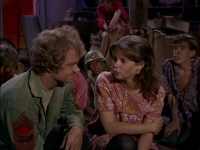
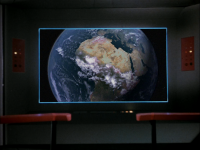
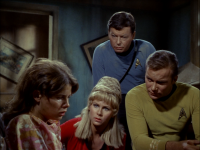
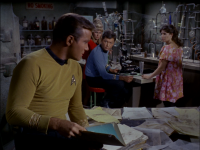
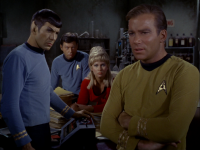
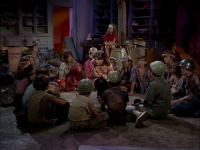
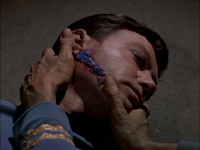
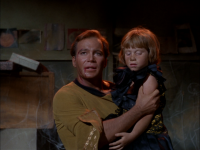
Filler Quotient:
3, bad filler, totally skippable.
- One of Star Trek's worst episodes and complete filler.
Problems
- In the first scene, Spock mentions that the ship is entering a new "solar system" rather than a new planetary system. This is a common error. The term they were looking for is planetary system. The planetary system we live in is called the Solar System because our star is named Sol. As such, the term "Solar System" is a proper noun, not a generic term.
- A planet forming exactly like Earth in every detail, as shown in this episode, is completely impossible. I might have accepted this if they attempted some kind of explanation, but they don't even try.
- Why does Kirk order Spock to make a helm adjustment at the end of this episode? Did he have something against the helmsman or something?
Factoids
- This episode establishes that Star Trek is set during the 23rd century (the 2200s) as there is dialog which states that 1960 was around 300 years ago.
- This episode establishes that Rand has a crush on Kirk.
- William Shatner's daughter is one of the children in this episode.
- This episode is a candidate for my "Worst Episode of TOS Award."
Remarkable Scenes
- Spock: "It could be a beaker full of death."
My Review
An episode about children who age very slowly and then die at puberty doesn't sound like that bad of a story until you factor in the fact that the entire thing takes place on another planet which is inexplicably exactly like Earth where apparently a second evolution of humanity lives. Add to that, none of the characters seem terribly interested in investigating why another planet exactly like Earth complete with a second evolution of humanity could exist. Instead, the entire episode focuses on the plight of the children whose acting performances are insufferably embarrassing to watch.
Even setting aside all of that, the plot is meager and fails to adequately explain how the children could have possibly been able to gather food for 300 years without trouble or why their food source is finally beginning to run out conveniently just as the Enterprise arrives. Likewise, I've got to wonder just how so many of the children, and especially Miri, were able to keep their clothes so pristine after all this time. But it's a necessary plot contrivance, I suppose. After all, how could Kirk seduce a prepubescent girl if she didn't have pretty clothes? Do yourself a favor and skip this one.
The following are comments submitted by my readers.
- From rhea on 2008-04-27 at 5:52pm:
English Imperial Units: Who is to say that Starfleet personnel are not allowed to use them? Ok, they use the metric system most of the time, but still I think it is an insignificant detail, since we still get the picture. I think miles and feet had to be expected in Star Trek anyway, given that the English system is still very much in effect in the US, where this series happens to have been created. It doesn’t bother me, to be honest, even though I wish that they would finally come around to the metric system. - From djb on 2009-01-22 at 5:21pm:
I'd have to agree, this episode is really dumb. A duplicate Earth, not explained at all. A strange disease that wiped out the entire adult population of the planet. Kids several hundred years old that have never even mentally matured ... what??
Just if a child's physical maturing is halted, that doesn't stop them from maturing mentally and emotionally. This episode acts as if maturity is purely a physical thing, and not a simple matter of having been alive long enough. It's probably both, but that detail is lost. The kids are just irritating. I liked Miri, though.
Moreover, there are loads of plot holes. Wouldn't they investigate the planet a bit before just beaming down? Attempt to talk to someone? Scan for life forms? Send a probe? As you said, what did the children eat? They're obviously incapable of even comprehending rational ideas, let alone farming or whatever.
Plus, when the crew leaves, they just talk about leaving a medical crew behind to care for the children. A whole planet of children?! At least several hundred million children, all infected with a disease that will kill them when they (eventually) grow old? Asinine.
It seems as though the producers and writers of this show were really still finding their feet; a lot of the episodes up until now have either been equally or nearly as pointless or have at least had completely random, weird stuff thrown in. Like the "barrier" at the edge of the galaxy in Where No Man Has Gone Before. Or the going back in time at the end of The Naked Time. Oh well. I grew up with TNG, so I can't help but judge this show by TNG's standards.
In response to metric vs. imperial: Anyone who has studied astronomy, physics, and everything else one would study in Starfleet would be entirely accustomed to using metric units. When I took even a beginning astronomy class, I don't think the word "mile" was uttered once during the class. Starfleet is not specific to one country, so they wouldn't use a measuring system that is only used predominately in one country. Especially Spock, who's an alien. Why would he learn an antiquated (and illogical!) measuring system that's not used by the majority of Earth's population even now, let alone in 300 years?
The only real reason I can see for the writers using imperial units here is that Americans were extremely resistant to the metric system, and still are to a degree. Fortunately, TPTB wised up by TNG's day, and only used metric from then on (though if you'll notice, they always say Celsius after a temperature, even though that should be obvious). - From 411314 on 2009-06-15 at 2:28am:
"We're not given any reason for why this planet is exactly like Earth."
You DO know that Star Trek is fictional, right? I've heard that any real extraterrestrial looking as similar to humans as Spock does (pointy ears notwithstanding) is less likely then a pen thrown into the air doing a perfect curve in the air and then falling perfectly straight and landing on its point. If you're willing to suspend your disbelief in Vulcans looking pretty much like humans except for pointy ears, then why not do the same with alternate Earths? - From Kethinov on 2009-06-15 at 4:38am:
@411314, that argument is completely ridiculous. The odds of a planet forming that is exactly like Earth in every detail are far, far more unlikely than an alien race evolving a similar physiology to humans.
In fact, one of the foundational science fiction concepts in Star Trek is that (aside from the obvious TV budgetary motive) evolution frequently leads to human-like aliens because it is the most practical morphology to have on an M class world. Planets of similar size and atmospheric composition would inevitably produce organisms best adapted to them.
However, the key concept here is similar but not identical. This planet in this episode was *identical* in every way. I can live with similar planets; even extremely similar planets if the ridiculous odds are acknowledged on screen. But barring some sort of parallel universe explanation, identical in every way is too absurd. - From 411314 on 2009-06-15 at 1:20pm:
"The odds of a planet forming that is exactly like Earth in every detail are far, far more unlikely than an alien race evolving a similar physiology to humans."
Still, an alien race with an appearance similar to humans is unlikely and nobody on this forum seems to have called than an "absurdity" or expected and explanation for it.
"In fact, one of the foundational science fiction concepts in Star Trek is that (aside from the obvious TV budgetary motive) evolution frequently leads to human-like aliens because it is the most practical morphology to have on an M class world."
What's an "M-class world"?
"...barring some sort of parallel universe explanation, identical in every way is too absurd."
If you can live with identical universes, why not identical Earths? The fact is, this entire show is not particularly scientific, and complaining about this or expecting it to be scientific is quite silly. It's rather like watching a looney toons cartoon and saying "we are given no explanation as to why Wil E. Cyote, when he runs off a cliff, stays in the middle of the air for a few seconds before he finally falls".
- From 411314 on 2009-06-16 at 2:20am:
This is definitely one of the better episodes. - From Kethinov on 2009-06-16 at 3:24am:
@411314
"Still, an alien race with an appearance similar to humans is unlikely"
Far less so, and there explanations for it. In addition to the one I provided in my above post, see TNG: The Chase.
"What's an M-class world?"
Star Trek's shorthand for a planet suitable for human(oid) life.
"If you can live with identical universes, why not identical Earths? The fact is, this entire show is not particularly scientific, and complaining about this or expecting it to be scientific is quite silly. It's rather like watching a looney toons cartoon and saying we are given no explanation as to why Wil E. Cyote, when he runs off a cliff, stays in the middle of the air for a few seconds before he finally falls."
Star Trek is actually pretty good about sciencey things, except in horrible episodes like this one. Parallel universes are a real concept which is explored in quantum physics. If a parallel Earth from a parallel universe could somehow be transported from one universe to another, it could explain what occurred in this episode. That explanation is fairly ludicrous, but it's better than what we get in the episode and it might have saved its score from a zero in my book. - From Remco on 2009-06-23 at 12:50am:
But still, many of these parallel universes would decidedly *not* be the same. There are an infinite number of universes, and it would be an extreme coincidence if something that looks exactly like Earth would pop out from one of those universes into our own universe.
I like what you say about evolution on M-class planets. But I don't completely buy it. There are many many species on our own planet, and any of them could evolve into having a cerebral cortex and using tools. And some already have, like many primates. They really don't have to look all that much like us. They just need a few limbs to manipulate the world around them. They don't have to stand upright, or even develop verbal communication.
For budget-reasons obviously, on Star Trek even the weirdest aliens usually look like humans with deformed faces.
Let me digress a little on our own planet's intelligent life:
I always wonder what would happen if you would take a Neanderthal baby from the past (or a 50,000 year old homo sapiens for that matter), and raise it like a modern human. I bet he would be as smart as anyone. He would just look weird and have some trouble with the ladies. ;)
Now I'm wondering what would happen if you'd surgically give a contemporary orangutan the ability to speak (they need an extra bone in their throat for complex sounds). It's entirely plausible that we would consider him an intelligent being, able to cope with math, languages, philosophy... the works.
If such an experiment succeeds, we may need to reconsider our view of intelligent life. - From rpeh on 2010-06-28 at 8:11pm:
I really don't understand the criticisms of this episode. Sure, the premise of a duplicate Earth is silly, but that's tangential to the main plot, which is the virus and the fate of the children. Most of the children play their roles well, and the delicate subject of a pre-adolescent crush on Kirk is well-handled.
The duplicate Earth was a red-herring, but there's no reason to give this a 0 because of that. It rates a solid 8 for me. - From CAlexander on 2011-03-13 at 4:07pm:
Yes, the identical Earth bit is just bizarre, and I would certainly complain about it vociferously if you hadn't already done so. Why do they make a big point about it, then drop it completely? But by the same point, I don't see this as contaminating the rest of the episode. You can just ignore it as a temporary script malfunction. The rest of the episode works fine if you just blot this from your mind and pretend that this is just a regular M-class planet. I also found it hard to believe that the children survived in an infantilized state for 300 years, I would find 30 years more plausible.
(I'm guessing the writers thought they were making a parable about how our Earth could have ended up just like theirs, had we destroyed ourselves with biological weapons, and made the similarities as an incredibly ham-handed attempt to drive home the point)
Although these are certainly negatives, I thought this episode was not bad, it had some definite positives. While not all of the acting is great, a lot of the scenes invoke legitimate parts of the human experience. The idea that the children were led by a demagogue who was threatened by Kirk's appearance. They way the children shout down Kirk and refuse to listen to him, banding together against the scary outside influence. The way the children, despite their immaturity, are a real menace to Kirk due to their knowledge of the terrain. The difficulty Kirk has trying to deal with children who are immature but know they have power. They way it is hard for them to trust Kirk because they know he will soon become an irrational monster and betray them like all the other adults did. They act unreasonably, but life is full of unreasonable adults, and these are only children. And I like Miri's crush on Kirk, and the way he handles it. The search for the cure was overdramatized in typical TOS style, yet entertained me more than many of the perfunctory TNG equivalents.
Also, aside from the technical negatives, there is one technical positive. This was one episode where they were sensible about quarantine, refusing to contaminate the ship, yet having the ship beam them down necessary supplies.
- From nforrest on 2011-08-04 at 3:01pm:
Just started watching Star Trek and Im hooked. Your site has been a great help.
I will say after watching this episode, although kind of annoying with the children who didn't develop mentally because their physical predicament.
This comment is to point out the bashing of a"earth" that developed just like our own in every way. Being a physics student this idea isn't so far fetched as one of the theories explains the idea of infinite possibilities, dimensions and so forth. If you are interested in reading more about how this is possible check out this link.
http://en.wikipedia.org/wiki/Many-worlds_interpretation - From Kethinov on 2011-08-04 at 7:44pm:
That theory refers to the theoretical existence of alternate universes, not second Earths identical to ours in every way that just so happen to exist several hundred light years away. My criticism stands. - From Mike Meares on 2012-02-23 at 3:28am:
I have really enjoyed reading your reviews Kethinov! I don’t always agree 100 % with your conclusions but I have, up to this point, really been impressed and enlighten by your insights and your observations.
However, I must say with all honesty I am a bit surprised at your review of “Miri” Kethinov and your rating of zero! Zero? Really? ZERO? Seriously?
My God, you gave a rating of 4 to “Spock’s Brain” for crying out loud!
The thrust of your criticism seems to be why a “identical” Earth exists since, in your words, this is impossible!
I don’t get the criticism! I really don’t!
Hardly anything in Star Trek is possible. It is pure fiction! Will there ever be transporters, phasers or time travel? Who knows! I just love wondering if they could happen. But that doesn’t mean they will happen or that I believe they will ever happen.
So following your logic Kethinov: Removing a person’s brain and reattaching it is possible but an identical earth is impossible. OK my friend if you say so.
To me the “identical” Earth was just a teaser to draw you into the story. And it worked for me. In fact, Star Trek became known for using the “teaser” to draw fans into a story.
I like the fact that they didn’t explain how the identical “Earth” developed myself. And if you stop and think about it, anything they would have tried to explain about the other Earth’s existence and development would have been pure conjecture on their part.
I love this episode! I think it was one of the top ten episodes of the first season. I still get goose bumps when I watch it.
One of the biggest reasons why this story works for me is Kim Darby. I think she is a fantastic actress and she gave such realism to her role. Another was the acting of Michael J. Pollard, which was superb. I know one of the criticisms was the acting of the children but, quite honestly, I never expect great acting from children in shows. And I have to ask: when did great acting become a measuring stone for a great Star Trek story?
I love William Shatner as Captain Kirk! But do I think he is a great actor in the role? No way! But he makes me believe he is James T. Kirk. And that is all that matters in film and TV.
I give “Miri” an 8 rating. I think it is that good. I know it has some plot holes and I know it leaves some unanswered questions, but so do many other Star Trek stories. I just don’t think some of the comments on here are very objective and seem to be concentrating on some very petty issues.
Several positives things about “Miri” that I really liked are:
(1) We get to see more of Lt. Farrow ( played by Jim Goodwin ) To me Farrow was a very down to Earth ( opps sorry no pun intended ) character. He wasn’t handsome or big or strong. He just seemed like a real person to me. I wish more of the secondary characters could have been like him.
(2) No “Red Shirts” were harmed during the filming of this episode! Probably the first and last time that ever happened! LOL. In fact, I don’t think Lt. Galloway ( David L. Ross ) nor the second security guard ( John Arndt ) even contracted the virus at all! Wow I guess it paid to be a “Red Shirt” this time around! LOL.
And finally, (3) I loved how they began the development of the relationship between McCoy and Spock in this episode. When Dr. McCoy injects himself and almost sacrifices his life, I think Spock really starts to admire the doctor and the person that he is. I still get a little chocked up when I hear Spock say, “I will never understand the medical mind.” And of course Spock says it so low that I don’t think anyone else can hear it. A great moment in Star Trek history. - From Kethinov on 2012-02-23 at 4:58am:
Mike,
Surgically removing a brain without killing it is considerably more plausible than the hypothetical existence of another Earth identical to ours in every way. The brain is just an organ like any other. As long as the proper fluids are not interrupted and no substantial injuries are inflicted during surgery, there is no reason why the brain couldn't survive independent of the body. In this respect, Spock's Brain is considerably more plausible than Miri, especially given that the episode goes to great lengths to establish that the surgical techniques used are highly advanced.
Your whole point about how "hardly anything in Star Trek is possible" because it's all just fiction is not valid. Good science fiction builds bridges between real science and the speculative science featured in sci fi stories. Phasers are particle weapons predicated on speculative technological advances in the efficiency of energy storage and release. Transporters work on the same principle but for a (usually) non-weaponized purpose. These devices are plausible assuming that it could some day be possible to harness and control energy so efficiently.
The planet in Miri on the other hand violates everything we know about nature in space or otherwise. Everything we know about planet formation tells us that every planet in the galaxy is a unique combination of circumstantial randomness when a star system is born. If a planet like the one in Miri did exist, the scientific implications would be daunting. That would imply a considerably more deterministic universe than things like quantum mechanics teach us is possible.
To put this in perspective, consider the old adage "no two snowflakes are ever alike." Strictly speaking, this isn't true. There are people who have tested this and determined that two snowflakes can be alike, but the probability is insanely small. If the odds against any two snowflakes being alike are infinitesimal, then what do you suppose the odds of two planets being exactly alike are? Earth is huge, and its history is the culmination of billions of years of random events. There's simply no way we'll find another Earth out there. Similar planets, sure. But not the planet found in Miri. It simply cannot happen.
As such, the premise of Miri is pure fantasy, rather than the kind of responsible science fiction things like phasers or the transporter are based on. As a critic, it's my job to make this distinction for my readers. I want my readers to know which episodes are good science fiction and which episodes are not. This one is not. - From Mike Meares on 2012-02-24 at 2:24am:
I just found some information about Miri in Memory Alpha that I think it may have made the story a lot better. Very interesting reading. I am reprinted the content here:
In his first volume of Star Trek episode adaptations, James Blish supplies a backstory that is vastly different to that of the "identical Earth" premise depicted in the television episode( "Miri" ).
Blish wrote that Miri's planet is the fourth planet orbiting the star 70 Ophiuchus, and is a beautiful Earth-like planet having one large and two smaller continents connected by islands. Ophiuchus IV (or Ophiuchus 4 – Blish never names the planet) is located between twelve and fifteen light years from Earth and had been the first planet outside Earth's solar system to be colonized, in this case by refugees from the so-called "Cold Peace" in the early 2100s, about 500 years before the events depicted in the television episode. These colonists were isolationists who violently repulsed the first attempt to contact them by a later expedition from Earth, and so no further contact was attempted.
As it turned out, the Ophiuchus system was in a "backwater" part of the galaxy that subsequent years of Earth-based space exploration passed by, and so the belligerent colony was easily ignored and almost forgotten.
Around 300 years before the events shown in "Miri", scientists on Ophiuchus IV developed the experimental life-prolongation project that resulted in the deaths of every adult on the planet.
Yet despite their close proximity, the distress signal sent by the colony didn't reach Earth because Ophiuchus IV stood between Earth and the center of the Milky Way, whose radiation created interstellar static that drowned out the SOS signal the colony had directed towards Earth. - From Alan Feldman on 2012-04-02 at 1:07am:
Speaking of units, scientists frequently use non-metric units: light-year, parsec, astronomical unit (equal to the radius of the earth's orbit), (an) atmosphere (a unit of pressure, though more for convenience when precision is not paramount), G forces, electron volt, barn (a barn is 10^(-24) cm^2), fermi (which is 10^(-13) cm). These last two are based on a metric unit, but so is the inch (defined as 2.54 cm), so it's just as "bad", sort of). The electrical charge of particles, in many cases, is more conveniently measured in multiples of that of a proton, as in the charge on an electron (which would be -1), or quarks, which, depending on which quark you're dealing with, is +/- 1/3 or +/- 2/3 of that amount of charge. There's also a foot (of cable, or patch cord, if you will), which is how far light travels in one nanosecond. This is useful in high-energy physics experiments for estimating delays. I believe calories are still used by some, though I'm not really sure. Add to all this units of time: years, months, weeks, and days are not metric units, yet scientists use days and years, at least. The dinosaurs were wiped out 65,000,000 years ago. No one converts that to seconds. Angstroms are still used (based on a metric unit, though). There are probably more.
Bottom line: Use the units that are appropriate for the job. - From Mandeponium on 2012-08-30 at 5:59pm:
Super late to the discussion, but you guys are arguing the wrong point. The issue is not whether an earth-duplicate is possible, as stranger things have happened in the Star Trek Universe. My biggest gripe is that they didn't even investigate it! Kirk says, "It seems impossible, but there it is," and no more is said on the subject. If Picard had stumbled on a planet with The North American Continent staring back at him, he would have gotten to the bottom of it.
That's what defies my suspension of disbelief, that no one seemed to care about that which in any normal universe (even one with humanoid-looking aliens) could not happen.
I can forgive it though. These first few episodes are rife with far-fetched concepts that are treated rather nonchalantly: The invention of time travel, shape-shifting aliens, perfect copy androids, and now Earth 2. - From Zerothis on 2012-09-22 at 1:41am:
The obvious retconning would be to attribute the duplicate Earth to the same Preservers that transplanted the Roman Empire people and Native American people to other planets. 1960 is near the beginning of the Post-atomic age, the Cold War era, and the hybrid age. Presumable the Preservers theorized a scientific subculture in existence around 1960 was about to become extinct (or about to devastate Earth, in which case there should be a whole lot of 1960ish cultures out there somewhere in the Trek universe). In fact this group did prove to be devastating to the planet they were transplanted to. Likewise, the transplanted Roman Empire was presumable defeated by one of the same factors that the Preservers had apparently hoped to rescue them from.
- From Glenn239 on 2012-10-01 at 5:02pm:
I can’t believe the tricycle scene at the start isn’t listed as a remarkable scene. When I watched that as a kid, that had as much punch as anything else in the entire series. This episode is naturally around 6 to an 8. I give it a 9 for some counterbalance.
The children represent the intellectually limited horizon of the human race, the disease they are attempting to cure is the result of our own hubris in the manipulation of nature, and the episode is saying to us that our futile attempts to command the complexities of nature are childlike and prone to disaster.
I for one have no problem that the Earths are the same, and it was not explained why. All we need to suspect is that it is the Earth, but a less lucky version of it. Who put it there and why they did it, we won’t know. Nowadays every action hero seems to make amazing intellectual leaps of logic to arrive at the correct conclusion in mere seconds, and then blurts out their byzantine (but correct) reasoning at machine gun pace, with only the occasional disinterested flip of their hair to signify to us just how bored all of this actually makes them. Whatever. The fact the identical Earth is not explained was because they had no explanation to give. They were clear on that, and it seems pretty straightforward to me. Onto the story. I’ll take that over idiotic “Q” or TNG techno-babble any day.
- From Lighternote on 2012-10-06 at 12:55pm:
I too, am very late to the great 'duplicate earth debate'. As far as I understand it physicists think that if our universe is infinite then not only would it be likely that there would be one duplicate of earth... But that it is almost a certainty that there would be an infinite number of duplicate earths along with an infinite amount of duplicate people. In fact, they have even calculated how far you would have to travel in order to reach another earth (it is, naturally a very, vey long way away). So, if the Star Trek universe is infinite, and warp drive let's you travel these extremely long distances then this episode is not as unbelievable as you would think!
Great site by the way. Working through all Star Trek and love reading the reviews in conjunction! - From Alan Feldman on 2013-03-19 at 12:57am:
The timeline based on "Miri"
I'm confused about this episode implying that Star Trek TOS takes place 300 years after its making. From the episode:
KIRK: Identical. Earth, as it was in the early 1900s.
SPOCK: More the, er, mid-1900s I would say, Captain, approximately 1960.
OK. Spock is saying that the earth they're on is similar to what our earth was like in our 1960. Then we are told that the place has been like this for about 300 years. All this means is that our heroes find themselves in an earth-like place similar to what _our_ earth was like in _our_ 1960. Their 1960 could have been 100 years before ours. That would put our heroes about 200 years in the future, not 300. (OK, more like approx. 150, if you include the years that have passed since the show aired.)
Am I missing something here?
AEF, a.k.a. betaneptune
- From DK on 2013-04-23 at 9:20pm:
I too loathe this episode. For the longest time this was at the top of my list for the worst Star Trek episode. Though it has since been eclipsed by a few episodes from later Star Trek incarnations 'Miri' has withstood the test of time to simultaneously annoy me and cause boredom as few episodes of any show have. Miri has an intangible je ne sais quoi quality that sets it apart from all the rest. I think the biggest problem was that during early syndication there were but a very few television channels and given the choice between any Star Trek and something else, I still chose to torture myself with 'Miri' which had the result of grinding in my dislike for this episode. At least 'Spock's Brain' had the quality of being unintentionally funny. 'Miri' was just unintentionally bad.
As for the duplicate earth debate, I understand your point. There is no way a duplicate earth could evolve on its own and many of the explanations offered on this page do not hold much water. And, I too have my pet peeves about certain aspects of Star Trek. Chief among them are discontinuity issues that need not be there and are due to lazy writing. That said, I understand why the duplicate earth was in the script; to make the point that this could happen to us. Plus, similar objections to the absurd implausibility of a duplicate earth could be said of most any Star Trek episode; let's start with the problems associated with faster than light travel. Absurd implausibility just isn't a road you want to go down when criticizing Star Trek but I guess it is still better than my 'je me sais quoi' objection. I agree that the whole issue could have been handled better although a way that doesn't its self create problems of its own escapes me for the moment. - From Schreck on 2013-05-23 at 8:04pm:
Those kids are REALLY annoying, but regardless I didn’t hate the episode…I give it a 7 and my brother a 6.75 - From Alan Feldman on 2013-05-27 at 5:20am:
Yet more on "Miri"
OK, here's how you can have two identical earths: Macroscopic quantum entanglement! OK, just fibbing.
I always thought Michael J. Pollard looked a little old for the part. Just checked: He's 8 years older than Kim Darby! Hah! Wait a minute . . . .
From wikipedia: Kim Darby was born in 1947, making her 19 at the time! Michael J. Pollard was born in 1939, making him 27! Even worse than I thought.
This type of thing happens from time to time in the entertainment industry.
You have to admit that Kim Darby did a great acting job in this episode. Add to that the fact that she was a 19-year-old acting as a 13-year-old.
KIRK: . . . We still don't know what we're fighting.
MCCOY: No, but we know what it is and how fast it does it. It's progressing. We'll begin to feel it inside soon. Intense fever, great pain in the extremities, fuzziness of vision. Of course, those are the early symptoms. There'll be more.
Hmmm. It didn't seem like they ever had any of these symptoms anytime in the show.
Wait a minute. Kirk says they don't know what they're fighting, but McCoy says they know what it is. Isn't that a contradiction?
Our heroes were there for what, a week? I hope Scotty beamed down some clean clothes!
More on units: In astronomy we have the Hubble constant. In what units is it typically expressed? (km/s)/megaparsec. OK. First, a parsec is not an SI or metric unit. Second, the constant has dimensions of inverse time (the two distance units canceling out dimension-wise). So in the SI system the Hubble constant would be given in inverse seconds. But knowing the constant in inverse seconds makes it hard to interpret. When given in (km/s)/megaparsec it's quite clear. Assume the constant is 71 km/s/megaparsec. A galaxy's speed is then 71 km/second if it's 1 megaparsec away, 142 km/s if it's 2 megaparsecs away, etc. In SI units it would be some number of inverse seconds, and not very useful in that form. So this is yet another case where pure SI units (or metric, if you prefer) are not the best choice.
Astronomy is guilty of still more non-metric units! Check the astronomical unit, the average distance from the Earth to the Sun. And then take stellar magnitudes. Not metric at all, and not even linear! A difference of five magnitudes means a factor of 100 in brightness, or energy output. In other words, a 1st magnitude star is 100 times brighter than a 6th magnitude star. Yes, a higher number means a dimmer object. Venus has a magnitude of about -4; the Moon, -13; and the Sun, -27, IIRC. How about _light-year_ as a unit? That's not metric! How old is the universe? About 13.7 billion _years_. A year is not a metric unit. In some cases it might be useful to convert it to seconds. That would be 4x10^17_s. (Underscore used to prevent possibly bad line break.) Sounds better in years, no?
AEF, aka betaneptune - From Deggsy on 2013-10-04 at 10:39pm:
And on top of everything else wrong with it, the line from Spock: "It could be a beaker full of death." isn't even accurate. I thought it was a flask he held, not a beaker :-) - From Ian Smith Adventures on 2013-10-17 at 9:26pm:
i loved this episode. re-watching from the beginning, i would rank this and "what little girls are made of" as my two favorites so far. is there something wrong with me? :P though mudd's women was by far my least favorite so we're on the same page there. i found the situation to be intense and well-established, i liked the interaction between kirk and miri, and i liked the ending where kirk has to think like a child in order to get through to them, and mccoy takes a big risk to save the team. the fact that the duplicate earth thing isn't followed up on strikes me as a cool mystery to think about, tos is full of odd, cool things like this. i thought the main guest stars did a great job. thumbs up! - From jeffenator98 on 2013-12-24 at 4:49pm:
"All right everyone just leave your communicators lying around on a desk somewhere." Capt Kirk - From Alan Feldman on 2014-04-16 at 10:46pm:
Correction!
In a previous post I wrote the following:
"More on units: In astronomy we have the Hubble constant. In what units is it typically expressed? (km/s)/megaparsec. OK. First, a parsec is not an SI or metric unit. Second, the constant has dimensions of inverse time (the two distance units canceling out dimension-wise). So in the SI system the Hubble constant would be given in inverse seconds. But knowing the constant in inverse seconds makes it hard to interpret. When given in (km/s)/megaparsec it's quite clear. Assume the constant is 71 km/s/megaparsec. A galaxy's speed is then 71 km/second if it's 1 megaparsec away, 142 km/s if it's 2 megaparsecs away, etc. In SI units it would be some number of inverse seconds, and not very useful in that form. So this is yet another case where pure SI units (or metric, if you prefer) are not the best choice."
OK, the Hubble constant is actually _also_ useful in SI units. Well, in inverse years instead of inverse seconds, anyway. When you work it out, H_0 = 71 (km/sec)/megaparsec = 7.26x10^-11 inverse years. Take the reciprocal of that and you get 13.8x10^9 years, the age of the universe!
So it's useful both ways, contrary to my previous statement.
AEF, a.k.a. betaneptune - From Timmersan on 2016-01-10 at 8:51pm:
Maybe Slartibartfast made all these identical Earths as a sort of practice, - From Royy on 2016-11-16 at 8:45pm:
I agree it is a difficult episode.
The first one to have a visit to 'Earth' though?
It is easy to judge these early episodes on the basis of much later material, but if we accept that the only explanation is either a parallel universe or even a time travelling Earth (why not?), then everything is more plausible.
It isn't a patch on 'what little girls are made of' though. - From Mike Chambers on 2020-09-12 at 6:23am:
I really think you're a bit harsh on some of the TOS episodes. This isn't a good episode, but it's watchable. You can't expect TNG level stuff.
If this were TNG, I'd give it a 0. But it's TOS, so I give it a 4. What TOS lacks in quality, acting chops and production value, it makes up for in campy, corny charm, and I watch it for what it is.
Sometimes I'm just in the mood for TOS and enjoy seeing almost any episode.

Star Trek TNG - 1x04 - Code of Honor
Originally Aired: 1987-10-12
Synopsis:
Tasha is kidnapped. [DVD]
Filler Quotient:
3, bad filler, totally skippable.
- There is some stuff here which foreshadows Wesley's more prominent role as a member of the crew later, but none of it is essential viewing.
Problems
None
Factoids
- It is heavily implied that the Ligonians use the same transporters as TOS. Even the effects are similar.
Remarkable Scenes
- Data correcting Picard regarding what century the gift originates from.
- Picard's irritation with Beverly wanting to discuss Wesley.
- Picard giving Wesley a chance. "Sir?" then, "Sir?" then Picard says, "Is the whole ship deaf?"
- Data offending Picard when discussing the French language.
- Riker being carefully talked into agreeing that Picard should lead the away team.
- Picard rambling on "about something everybody already knows."
My Review
There is a decent idea for a story about diplomacy here, but it's buried beneath a lot of bad stylistic choices. It's pretty hard not to see the Ligonians as racist stereotyping and the conflict surrounding Yar as sexist stereotyping, particularly the scene where Data described the weapons as so light that even women could use them. Some smaller stylistic choices were awkward too, such as Data of all people tripping over his words with the "includling" line; a vocal mistake that is hard to suspend disbelief on, Beverly's unprofessional panicking about the vaccine, and a series of scenes with stilted dialog that the actors were clearly stumbling over. While the episode does have a few nice details and a few amusing scenes, what we have here is unfortunately mostly cringeworthy.
The following are comments submitted by my readers.
- From DSOmo on 2007-05-27 at 7:49am:
- While presenting Lutan with the horse statue, Picard says that he is aware of the Ligonian culture's unique similarity to an ancient Earth culture that he "admires." However, later in the episode, Picard states that the customs of the Ligonian culture are the "same kind of pompous strutting charades that endangered our own species a few centuries ago."
- Just before the battle to the death, we are told: "The rules are known. Let combat continue until there is a victory. It will not be interrupted." But during the battle, when Yareena loses her weapon, Lutan stops the fight. I thought the battle would not be interrupted!! And why is Lutan stopping the fight to return the weapon to Yareena? Doesn't he want Yar to kill his wife so he can inherit her wealth? - From Bernard on 2007-09-21 at 10:31pm:
Another good early effort, that holds up to repeat viewings well. Maybe I'm one of the few that agree with you there!
Probably one of two episodes where yar is brought to the fore.. she was an interesting enough character with a good background story just a shame denise crosby didn't hang in there for longer
one aside here, tng at this point is still very much working on the OS premise of 'planet of the week' episodes (coupled with the aliens that look identical to humans) - From CAlexander on 2011-03-06 at 10:25pm:
I'm one who never liked this episode, but it doesn't seem quite as awful now as it did the first time I watched it. The basic concept is not that bad. I think my problems are twofold:
1. The acting from everyone is painful at the beginning of the episode. It felt like they hadn't gotten the hang of how to do TNG yet and were overreacting to everything in a way reminiscent of TOS, and this didn't work in the context of TNG.
2. The episode led up to the fight scene at the end, which I found to be quite underwhelming. When rewatching this I had no expectations for the fight scene so it didn't bother me. - From Axel on 2018-06-09 at 2:55am:
The only way the portrayal of the Ligonians could've been more racist is if the actors had been white people in blackface. Whenever I re-watch TNG's first couple seasons and see aliens in hilariously dumb costumes, I think of these guys and realize it only went uphill.
Data refers to French as an "obscure language" which of course sets off Picard. This is a bit weird since Data, having the crew's personnel records, would no doubt be aware that Picard has French ancestry and is presumably familiar with the language. But Picard's response must've had some effect, because in "Time's Arrow" we see that Data now speaks fluent French.
During the fight, Yareena's spikey glove flies off her hand and strikes a spectator. A few seconds later, he keels over, dies, and is carried away by other Ligonians almost as if they were expecting it. Is it also considered honorable in Ligonian society to die from watching honorable combat? Otherwise, poor bastard didn't get the benefits of the Enterprise medical treatment. - From Harrison on 2020-01-26 at 6:02pm:
Political correctness has long demanded that this episode be viewed as an offensive aberration. That's nonsense, of course. Sure, the episode has some typical early TNG plot foibles (eg, the Ligonians were able to develop transport technology?) and the combat scene is a little silly, but overall it is actually a solid effort that explores some interesting themes. Stewart and Crosby are both in great form. It's far more engaging than many early TNG clunkers (like the episode that follows, "The Last Outpost".) - From Azalea Jane on 2021-07-03 at 7:23am:
I basically agree this episode is terrible, but for me, watching it again for the first time in years, it's ventured into "so bad it's good" territory. While I agree it's pretty skippable, I'd say if you're a newbie to TNG, do watch this episode at least once and revel in the cringe. (Protip: you don't have to be sober.)
A few things I think make it worth a watch:
- Wes sitting at ops for the first time. Significant, and hilariously awkward. The way it's handled, I can't tell if the producers were *going* for the awkwardness, or not.
- Has a bit of iconic dialogue that made it into the famous "Picard song" where Troi answers "you're the captain, sir; you're entitled."
- focus on Yar, which is unfortunately scarce in TNG.
- the over -the-top cheesy music. It's almost TOS-level campy.
- Data's attempts at humor. Or rather, the writers' and Brent Spiner's attempts to get a bead on Data's relationship to humor.
- "Troi, I'm your friend, and you tricked me!
Problem: Where was Worf? They could have made a lot of use of his character, being from a culture that also places a high emphasis on honor. Very disappointing they didn't work Worf into the plot somehow. (Maybe, just as in "Starship Mine," he called dibs on not having to show up in this episode.)
It's a strange feeling, watching an episode centered around "the vaccine!" now in mid-2021. Knowing a bit more now about how vaccines are developed and how they work, it seems kind of silly for this episode's MacGuffin to be a vaccine, considering the people on this planet are a different species, and thus would not be able to develop, test, or manufacture a vaccine for any offworld species, let alone manufacture millions of them. They could have had some plant or rare compound used in an antidote, or something. A nitpick, sure, but it's damn lazy writing!
negative 5/7. - From Chuck the Canuck on 2023-05-19 at 1:17pm:
Yes, yes, this episode holds up extremely poorly especially with our post-2020 hindsight. That said, I don't believe in judging it by modern standards; I think even in 1987 it was a bit much, especially when you look back at The Original Series twenty years earlier. Kind of a slap in the face to the progress TOS had made with Uhura.
I agree this episode is worth watching mainly to see how the actors and writers were working to figure out the show and characters. Spiner and the writing team didn't just create the beloved Data we know from the beginning. It took some trial and error mainly in the first season to sort it out. Same with Picard, who is very, noticeably different in the first season in terms of dialogue and temperament. That exchange with Troi that Azalea Jane mentioned is also a flash of later Picard.
On a side note, Garrett Wang routinely roasts this episode when he appears at conventions. Apparently, it was the first and only episode of TNG he saw prior to getting cast as Ensign Kim on VOY. So, he came into that show thinking TNG had set a pretty low bar. It wasn't until later that he watched more TNG and became a fan.

Star Trek Dis - 1x04 - The Butcher's Knife Cares Not for the Lamb's Cry
Originally Aired: 2017-10-8
Synopsis:
With tensions and stakes high as Starfleet continues in their efforts to end the war with Klingons, Burnham begins to settle in to her new position aboard the U.S.S. Discovery.
Problems
- When the spore drive dropped them too close to a star, as soon as they regained control of the ship, Lorca immediately ordered them to jump to warp. To where? Did they even know where they were or where they were going?
- The star is also mentioned to be an "O-type star." O-type stars are blue-white, but the star shown is more Sun-like.
- Elon Musk is referenced as a figure alongside the Wright brothers and Zefram Cochrane. Irrespective of the ludicrousness of the comparison (covered in the review below), even mentioning Musk's name verges on a continuity error, given that the timeline of Star Trek splits off from the real world in the late 20th century, well before any of Musk's real world achievements (such as they are) came into being.
- Discovery hovering not far above the ground of Corvan II seems hard to rationalize given how treacherous in-atmosphere flight has been shown to be for starships in virtually every other Star Trek production. Perhaps a quirk of the spore drive allowed them to do this...?
Factoids
- The title of this episode is the second longest in Star Trek so far, only slightly shorter than TOS: For the World is Hollow and I Have Touched the Sky.
- This episode establishes that Discovery is the only ship with a "displacement activated spore hub drive" now that the Glenn is destroyed.
- This episode establishes that the cloaking device on T'Kuvma's ship was unique and one of its kind, thus the need for Kol to steal it.
- This episode establishes that Kol is a member of the House of Kor.
- This episode establishes that Philippa Georgiou was born in 2202 and attended Starfleet Academy from 2220 to 2224.
- This episode establishes that Michael Burnham was born in 2226 and attended the Vulcan Science Academy from 2245 to 2249.
Remarkable Scenes
- Voq: "To fuse its [the Shenzhou's] technology with our own would be blasphemy." L'Rell: "You had no such outrage when we ate its captain. I saw your smile when you picked the meat from her smooth skull."
- Discovery jumping too close to a star when the spore drive misfired.
- The Klingons assaulting Corvan II and Discovery's rescue.
My Review
In the next installment of Captain Ransom'sLorca's quest to capture creatures to power his experimental propulsion drive, the mad scientist captain astonishingly forgets what the creature was for and becomes inexplicably obsessed with its murky potential to be turned into a weapon somehow, despite its obvious and much more useful connection to the parallel spore propulsion experiments that were being conducted on the Glenn. It wasn't just Lorca who missed the obvious though. Literally everyone seems oblivious to this connection for half the episode for seemingly no reason. Burnham eventually figures it out, but not before Landry gets herself killed in the most embarrassingly stupid and unnecessary way imaginable in a reckless beyond words attempt to harvest its body parts to turn into weapons of some kind. If she had succeeded in killing the creature, she would've permanently destroyed its potential to be exploited for propulsion in exchange for weapons of questionable value at best.
Meanwhile Lorca and Stamets get into perhaps one of the pettiest arguments ever seen on Star Trek when Stamets whines again that he's a scientist, not a soldier, after which Lorca rhetorically invites Stamets to leave the ship. Stamets, evidently a bit dense, takes the rhetorical suggestion literally and threatens to "take everything" with him, after which Lorca has to literally remind him that the ship and all its contents are the property of Starfleet, so he can't really take his ball and go home. Ultimately, the only thing that convinced Stamets to go back to his job was Lorca passive aggressively broadcasting the death and carnage going on at Corvan II over the entire ship's intercom, in a seeming act of public humiliation directed at Stamets. Basically Stamets threw a temper tantrum and Lorca gave him a spanking in front of his schoolmates. But the narrative portrays it as though it ought to be compelling interpersonal conflict. Like super deep stuff, man!
Indeed, the episode is laced with similar false profundity everywhere. Some of it is in the small details, like Lorca casually name dropping Elon Musk alongside the Wright brothers and Zefram Cochrane, as though Musk's accomplishments, impressive as they may be, are even remotely comparable to inventing airplanes or inventing warp drive. They aren't. Other cringeworthy dialog included casually mentioning that Corvan II produces 40% of the Federation's dilithium, while also mentioning that there are no ships in range to protect it. These two facts are trotted out for dramatic effect, but all it really does is beg the question as to why the Federation would leave such a valuable asset so poorly defended to begin with. A related issue has to do with why the Discovery left Corvan II so quickly afterward. You'd think they'd stick around to provide relief to the colonists, but of course that wouldn't be anywhere near as cool as a dramatic exit, now would it? Likewise the uniform synthesizer scene put some seriously overwrought visual effects on display for seemingly no reason other than to go for a wow factor that falls flat.
The biggest offender in terms of false profundity though was the writing surrounding Burnham. Two scenes stick out like a sore thumb. First, the scene when she manipulates Saru into borrowing his threat ganglia as a means to see if the tardigrade was dangerous. Setting aside how overwhelmingly cringeworthy the entire concept of threat ganglia is to begin with, manipulating him into coming down there and then offending him with trickery was unnecessary. She could've just asked to borrow his threat ganglia. But, see, then it wouldn't be laced with unnecessary melodrama! Likewise, the second big Burnham scene that reeks of false profundity is Georgiou's letter to Burnham in her will. While it's always nice to see more of Georgiou, one of Star Trek: Discovery's few likable characters so far, hamming up the irony that Burnham became the opposite of what Georgiou imagined in her letter added no value to the story. All of that was made quite clear in the Battle at the Binary Stars. Repeating it all in a video will is just, well... repetitive. And closing the episode on a redundant scene wasn't a strong choice, especially when they could've depicted her struggling with the morality of inflicting pain on the tardigrade to save lives instead.
Also, they really need to slow down those Klingon subtitles.
The following are comments submitted by my readers.
- From Shani on 2017-10-09 at 11:12am:
I don't like replicators were around during the TOS era. How are they replicating food and uniforms? - From Shodanbot on 2017-10-09 at 11:03pm:
Landry's death was very silly and forced. Especially given her interactions with Michael up to that point, as I got the impression she was to be this series "Worf". But it is how forced and unnecessary this death was that I found difficult to over-look. Couldn't they have used the transporter to "harvest" a claw from the beast? Cruel and very out of place at Starfleet, but I don't see any reason a transporter couldn't do it. Landry would've avoid getting within mauling distance with the beast with a quick transport.
Oh well. Whatever. They needed the beast alive and in one piece to get the plot moving, and added a bit of silly blood letting to keep the peanut gallery from falling asleep. I wonder if the star trek universe's 23rd century has an equivalent of The Darwin Awards?
Another bit of an annoyance for me, and to be fair a pedantic one at that, is "Xeno-Anthropologist". Just what is a Xeno-Anthropologist? - From matzieq on 2017-10-10 at 8:46am:
I just can't get used to the new look of the klingons, if only they had hair, or ANYTHING that made them look like klingons! Also, the need to constantly read subtitles while they bark at each other unintelligibly is so annoying... even though I'm used to reading subtitles since English is not my first language. And every time someone says "T'Kuvma" I want to reply "Gesundheit!" - From Rob UK on 2017-10-15 at 11:08pm:
Ahhhhhh man we've been all waiting so long.
I do not know about you folks but I thought they were going to give us a TV series with the new adventures of new Spock n Kirk n crew down the new old timeline, so I already have sand in my vag before we start but here we go.
I am trying my best to ignore all the things I am not liking about this new show and failing miserably, it is taking me multiple sittings just to get through a single episode, I put it on with the best intentions and then twenty minutes later find myself in the mancave pottering about as I am clearly bored out of my gourd.
So I am trying my best to be ignoring all cannon foe-pars, ignoring all timeline blunders and everything like the redesign of things and species that really didn't have the gaps in their chronology to fit like the Klingons going from how they look in the OS to Next Gen (we had a explanation for that) to squeezing how they all look in this into that between the Eugenics experiments that make them all look as they do in Next gen.
Deep breaths
So even when I do all that and make myself sit down and leave the bong alone long enough to actually get through an episode in it's entirety in one attention span (I can sit through ten episode off the belt of any previous Star Trek in any order and hardly blink) I sadly come to the same conclusion of
WORST STAR TREK EVER
and I definitely include the animated series in that statement.
I am still going to keep watching and hoping it improves as I am a bloody Star Trek fan, speaking of that
Absolutely loving every second of The Orville, surely it can't just be me, are you Trek-heads on board?

Star Trek TNG - 6x03 - Man of the People
Originally Aired: 1992-10-5
Synopsis:
A Lumerian ambassador uses Troi to achieve success. [DVD]
Problems
- How is Troi's aging magically reduced?
Factoids
- There's an "Ensign Janeway" in this episode. No relation, I'm sure... ;)
Remarkable Scenes
- Worf directing a martial arts class. Cool!
- The old woman: "Have you mated with him yet?!"
- Troi being life-force raped.
- Troi toying with Riker.
- Troi being mean to Ensign Janeway.
- Beverly performing an illegal autopsy.
- Beverly faking Troi's death.
My Review
I like the impunity the ambassador had throughout the episode. It shows us that sometimes people just get so famous and important that even haneous crimes they commit seem to be overlooked. The ambassador reminded me somewhat of OJ Simpson, except in this case getting what he deserved in the end. Despite the fine story idea, the execution was rather drab. The story was caught up in Beverly's medical mystery, the conclusion of which was obvious. The only interesting part was the climax, in which it's fun to watch Picard and Beverly manipulate the ambassador. His death was fitting, albeit a bit convenient. My main problem with this episode is the number of TNG cliches. A diplomatic mission, a mystery guest star with a secret, and more Troi suffering scenes. I've thus marked it down a bit.
The following are comments submitted by my readers.
- From DSOmo on 2007-10-09 at 7:56am:
- When Crusher proposes to kill Troi so Alcar will break his link, Riker reacts immediately. Crusher responds that she will be able to revive Troi as long as thirty minutes do not elapse before resuscitation. Why thirty minutes? In "The Neutral Zone," Crusher revived humans who had been frozen for hundreds of years.
- After making a scene in Ten-Forward, Troi gets escorted out by Riker. They board a turbolift and the doors read "08 Turbolift." Ten-Forward is on deck 10, not deck 8.
- At the end of the show, Picard predicts that Alcar will attempt to find another person as soon as Troi dies. To protect Alcar's intended victim, he contacts Transporter Room 2 and tells them to lock on to the female in Alcar's quarters. But when he wants to beam her out he says, "Picard to Transporter Room 3. Energize!" How does the transporter chief in Transporter Room 3 know what to do? Picard gave his instructions to Transporter Room 2. - From Rob on 2008-04-17 at 11:50pm:
The only scene that is really worth watching more than once to me is Troi cutting down Ensign Janeway... I laugh every time. - From JRPoole on 2008-09-07 at 4:49pm:
Mind rape in various forms is getting to be a little ho-hum aboard the Enterprise. It seems like something similar comes up at least once a season.
What we get here is little more than another Troi-in-mental anguish episode. This one gets marked up a little because Marina Sirtis gets to walk around in sexy dresses and she does a great job acting, especially in the scene someone mentioned above where she breaks it off in Ensign Janeway, who probably needed to hear that anyway.
This one loses a couple of points, however, when Troi transforms back in to her old self. I just can't buy that she's instantly back to her regular appearance as soon as the mind lock is severed. The tissue changes (wrinkles, discoloring, gray hair) aren't going to disappear instantly. I know this is minor and mostly cosmetic, but it irked me. Still, not a terrible episode. I give i a 3. - From Will on 2011-10-27 at 2:01am:
I just want to point out that OJ was not acquitted simply because he was famous, he was acquitted because he was black and famous. - From Dstyle on 2015-09-21 at 5:35pm:
I just want to point out that OJ was not acquitted simply because he was famous, he was acquitted because the prosecution monumentally bungled the case, leaving A LOT of room for reasonable doubt. The only folks who think otherwise either didn't follow the trial or already wanted a guilty verdict before they heard any of the evidence presented. Our previous commentor--who I assume managed to post from an alternate universe--seems to be laboring under the misapprehension that being black is somehow a "get out of jail free" card in the American judicial system. Don't worry! America still puts a lot of black folks behind bars (or worse)!
A much better comparison could be made between the ambassador and Bill Cosby, although Mr. Cosby's long string of crimes had not been widely publicized at the time this review was written. - From ChristopherA on 2019-05-25 at 1:45am:
Agreed, this episode has an interesting idea but the execution could have been better. I was perfectly satisfied watching the episode but it is just OK, not one of the memorable episodes.

Star Trek Dis - 2x12 - Through the Valley of Shadows
Originally Aired: 2019-4-4
Synopsis:
A fourth signal leads the U.S.S. Discovery to an insular world, where Pike is forced to make a life-changing choice. Burnham and Spock investigate a Section 31 ship gone rogue, leading to a discovery with catastrophic consequences.
Problems
- Bodies don't freeze when they're spaced.
Factoids
- The title of this episode appears to be a reference to Psalm 23: "Yea, though I walk through the valley of the shadow of death, I will fear no evil."
- Kenneth Mitchell plays Tenavik in this episode. He previously played Kol and Kol-Sha.
- This episode establishes that Section 31 has a fleet of a bit over 30 ships.
- Reno's wife was killed during the Klingon war.
Remarkable Scenes
- L'Rell and Tyler arguing over who should go down to the surface.
- Pike's vision of the future showing him how he'll end up in the wheelchair in TOS: The Menagerie.
- Reno encouraging Culber to patch it up with Stamets. Reno: "You have a second chance. And it may not last forever. Don't screw it up."
- Spock saving Burnham from Control.
- Pike telling L'Rell and Tyler about their son.
My Review
Another clunker in a season full of clunkers. After spending some time with L'Rell's and Voq's/Tyler's son (so much for those theories that he might grow up to be "the albino" from DS9: Blood Oath), Pike becomes convinced that the vision he saw of ending up confined to a wheelchair is inevitable for no clear reason other than being told that it is inevitable. It's entirely unclear how taking a time crystal and having a conversation with a time monk deprives him of all free will for the rest of his life, but that appears to be what the writers expect us to believe. Gone is Pike's agency to resign from Starfleet, change careers, or simply kill himself before the impending accident. Foreknowledge of it as a possible outcome doesn't render it merely a possible outcome, but somehow a certainty.
Bad takes on the philosophy of free will aside, the whole notion that the Klingons are sitting on rich deposits of natural resources that can be used to build powerful time travel technology that they simply refuse to use because it wouldn't be honorable or something is utterly stupid. Countless Klingons would have no such scruples, yet for some completely asinine reason we're supposed to believe that this power is never exploited across centuries of Star Trek stories. The tendency for this series to grant superpowers in a prequel that history never recorded and not think through the implications of how they would ripple across canon is an endless source of frustration and one of the principal reasons why this whole show ought to be struck from canon with prejudice.
And somehow, overwrought time crystals are not even the stupidest detail of this story. That honor goes to the cliffhanger. They're being chased by a fleet of 30 ships, can't outrun them with warp drive, and need to buy time to figure out how to use the time crystals to defeat Control. So rather than do the overwhelmingly obvious thing of using the spore drive to jump across the galaxy—say—to Terralysium where it would take the enemy 150 years to catch up to them, they just suddenly forget that option for no coherent reason and decide blowing up the ship is all they can do, which is especially incoherent given that they used the spore drive earlier in the episode to travel to Boreth. But hey, at least we finally had a scene with Linus where he wasn't used to make a body humor joke.
No fan commentary yet.

Star Trek Dis - 2x15.3 - Ask Not
Originally Aired: 2019-11-13
Synopsis:
When an attack on Starbase 28 leaves a surprise prisoner under Cadet Thira Sidhu's watch, she is faced with making a decision that may threaten her standing in Starfleet.
Problems
None
Factoids
None
Remarkable Scenes
- Pike being revealed as the prisoner.
My Review
Another Discoveryverse Enterprise coda. Again fairly unremarkable. Again not bad, but not necessarily good either. Again feels more like the sort of thing you'd find perusing the deleted scenes of a film only to say, "Yeah, I can see why they cut this."
No fan commentary yet.

Originally Aired: 1993-10-31
Synopsis:
After falling in love with a woman whose species is unable to walk in "normal" gravity, Bashir develops a technology that could free her of her wheelchair forever. [DVD]
Filler Quotient:
3, bad filler, totally skippable.
- There's no essential plot or exposition in this episode that renders it unskippable and while the story has a few charming moments, it's mostly terrible. And we never see Melora again.
Problems
- The gravity Melora is used to is extremely, extremely low. So low that there's barely any at all; she floats around like a feather. Why would her species evolve as bipedal life forms when they can just fly around most of the time?
Factoids
- Bashir's father was a Federation diplomat.
- Bashir is supposedly no good at Tennis.
Remarkable Scenes
- Fallit Kot just after walking into Quark's bar: "I've come to kill you, Quark."
- The Klingon restaurant scene. I love when the Klingon chef throws the plate behind him. Hilarious!
- Melora: "What kind of architect would design a raised limb at the entrance of every door?!" I wondered this myself in the pilot episode. :)
- Melora and Dax discussing alien relationships.
- Melora kicking some low gravity ass!
- The Klingon chef singing.
- Rules of Acquisition: 16. A deal is a deal.
- Morn Appearances; 1. Seen sitting behind Bashir and Dax in the opening scene while they're talking to O'Brien about the wheelchair. 2. In Quark's bar just before Quark attempts to be really really nice to Fallit Kot so he won't kill him.
My Review
This episode is an attempt to prove handicapped people can contribute to society, in a Federation enlightenment sort of way, but instead just comes off as a bit obnoxious. Geordi LaForge was a much better example of how handicapped people can contribute to society, but admittedly in some ways, Geordi is a poor example because they eliminated his problem with technology. Melora is a better example of how handicapped people can contribute to society because her problem is natural to her species. Unfortunately, Melora was the obnoxious thing about this episode. Her behavior was just annoying, whereas Geordi was a very likable guy. The idea of a medical cure for her situation is obnoxious too. The science behind it is a little fuzzy, but far less so than Melora's species' curious bipedal evolution in a low gravity environment. What I didn't like most about it was the episode should have been more about Melora living on the station with a handicap and less about curing it. And even that would have been a little lame. Fortunately, the ending redeems quite a bit of the episode's mistakes. Melora is not going to fix her handicap, as that would be insulting the rest of her species.
The following are comments submitted by my readers.
- From EKH on 2007-04-29 at 4:15pm:
The gravity in the scene in Melora's quarters were inconsistent, too, switching between low gravity and no gravity at least once. - From djb on 2009-01-06 at 1:46am:
I have to disagree with your review, dear Kethinov. I loved this episode! It definitely had its flaws, which I'll go into later, but first I'll say why I liked it.
This was obviously an episode that wanted to deal with "disability" issues. Melora is predictably rough around the edges and fiercely independent, and very walled off. Bashir's ability to worm his way in through her defenses was beautifully written and acted, and we see behind Melora's rather off-putting exterior is a vulnerable person who's rather insecure about her qualifications. It's actually great character development for Bashir.
I also liked that they pulled off a low-gravity scene. It's the first I've really seen since Star Trek VI (I may be wrong), and you'd think you'd see more of them, seeing as how most of the gravity we see in Star Trek is artificial. Of course, this is a budget issue. If, every time an away team boarded some disabled ship or derelict, they had to be weightless, as would be most realistic, the budget would go through the roof. Oh well.
Anyway, it's nice to see Bashir turn his attention away from Dax for a little bit! It was also nice and realistic to see a hostile alien follow through on his threat to kill a hostage (even though she didn't die). I also liked how she saved the day, and how an analogy to an ancient earth story got her to reconsider undergoing those treatments.
Now to the faults: As Kethinov pointed out, Melora's appearance is rather unrealistic. A planet with such low gravity would have to be extremely small (smaller than our moon), and would probably hold next to no atmosphere, which would probably make any species living on such a planet A) very tall, and B) able to live on very little air. Melora would probably find the atmospheric pressure on DS9 unbearably high. Maybe her species migrated from some other planet and hadn't evolved past its original humanoid appearance; who knows.
They could have done it some other way; they could have made her born with some genetic muscular defect that required her to live and grow up in a low-gravity environment, but Star Trek, despite its many strengths, has always required a bit of suspension of disbelief. Some more than others.
The other flaw is one not intrinsic to the episode, but another unfortunate theme in Star Trek: we never hear from Melora again. The theme of exploring a romantic interest in an episode only to have it forgotten in the next isn't new (see TNG: Lessons, The Game, etc.), and it's rather irritating! Oh well. I still liked this episode a lot.
- From Bernard on 2010-06-15 at 10:41pm:
Solid episode. Great to see Bashir getting some nice character development, also great to see another strong female character in DS9. DS9 was particularly good at independent women but Melora is fantastically prickly, driven and stubborn. Quite similar to Ensign Ro in her first appearance actually, but I have to agree with djb that it is such a shame that we never see her again.
On the down side slightly obvious plot developments lets the rating of this episode slide. I'd give it a 5 or 6.
Again, suspension of disbelief is an absolute requirement when watching Star Trek. I always feel that, as long as they don't break too many of their own rules, then I'm happy with it. If you get too upset by the science of Star Trek then you'll have to switch off every time they use the transporter surely? - From John on 2012-03-29 at 3:28am:
While I don't always agree with our host on episode ratings, I completely concur with the 2/10 rating on this one, as well as the reason for such a rating.
The character of Melora is quite irritating, and Bashir, with his constant professions of awe about her gets old pretty quick too.
The high point of the entire episode for me is the Klingon chef -- I wish they had featured him, if not prominently, then more regularly in the later seasons. As it is I don't think they even gave him a name.
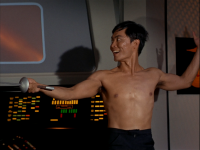
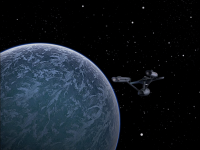
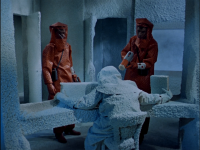
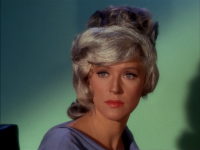
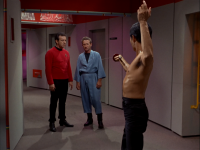
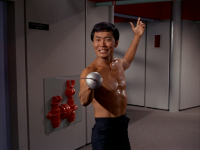
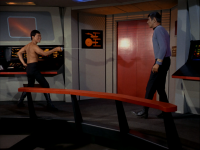
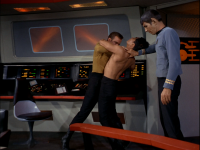
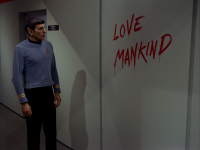
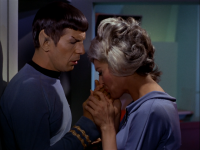
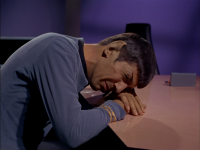
Star Trek TOS - 1x04 - The Naked Time
Originally Aired: 1966-9-29
Synopsis:
The Enterprise crew catch a virus that removes their inhibitions. [Blu-ray] [DVD]
Filler Quotient:
0, not filler, do not skip this episode.
- This is a must-see from TOS. The disease the crew contracts in this episode will recur later in TNG: The Naked Now and the magic time travel formula Spock discovers will also recur several times during TOS.
Problems
None
Factoids
- This episode establishes that Spock's mother was human and Spock's father was Vulcan.
- This episode establishes that the ship's engines are powered by a matter-antimatter reaction.
- This episode was nominated for the 1967 Hugo Award for Best Dramatic Presentation.
Remarkable Scenes
- Sulu rampaging through the Enterprise with a fencing sword.
- Spock using some sort of neck pinch to render Sulu unconscious.
- Nurse Christine Chapel trying to seduce Spock.
- Spock losing his emotional control after being infected by Nurse Chapel.
- Scotty: "I can't change the laws of physics!"
- Kirk fighting Spock.
- Kirk becoming infected while Spock regains his control.
My Review
The Naked Time is an effective comedy story mixed with a touching subplot regarding Chapel's unrequited love for Spock whom does not return her affection. He ignores her affection for him not because he does not feel the same for her, but because he feels he is ethically obligated to suppress those feelings because of his Vulcan heritage. The other side of the story is full of fun moments such as Sulu rampaging through the ship with a rapier and random members of the crew exhibiting generally amusing drunken disorderly conduct.
Unfortunately, this is all predicated on an exceptionally stupid mistake by the crewman who beamed down with Spock in the opening scenes. They're in a hazmat situation and the damn crewman takes off part of his protective suit in the middle of the investigation which is trying to determine what inexplicably killed that whole colony full of scientists! This is a degree of reckless incompetence that is so high that it makes it hard to be sympathetic to our heroes' plight. Then there's the painfully irrelevant ending. To save the ship from crashing down onto the planet, Spock invents... time travel? Seriously?
Worse yet, once the ship is saved, Kirk just sort of sits there and basically says, "gee golly, that's an interesting accidental discovery. We might have to use that deliberately some time." His casual indifference to the magnitude of such a discovery would be like someone from ancient Rome seeing an airplane for the first time and shrugging, as if there was little significance to the existence of such technology. Those issues aside though, the episode is highly enjoyable with very effective comedy.
The following are comments submitted by my readers.
- From Orion Pimpdaddy on 2007-11-29 at 3:17pm:
The remastered episode shows a brightly lit planet. It also appears to be lit on every side (no nightime). Not only is this unrealistic, Spock mentions that the star is that solar system had dimmed out, so if anything the planet should be very dark. - From Abigail on 2010-05-28 at 3:42am:
Maybe I'm remembering this wrong (which would speak poorly of my brain, because I just watched it today), but there seemed to be a problem with the sequence of events. As I recall, McCoy discovers the antidote and contacts the bridge. Then Kirk goes to tell Spock to calculate how to leave orbit, and he finds that Spock has been infected. Wouldn't it make sense to get McCoy and/or a hypospray and cure him? Kirk is not yet infected, so he should have the brain power to do so. Instead, he slaps Spock several times, yells at him, and then becomes infected. Not exactly a keen example of problem-solving skills... But then again, one of the big things that bugs me about TOS is everyone's general lack of ability to reason through things. Sometimes I feel like I'm watching a ship full of idiots... - From Wes on 2011-03-24 at 7:10pm:
This is also the first instance I recall that we find out that Spock's mother is human. In the previous episode, Spock says that he has human ancestors. So now we know Spock is half human and his mother lives with his father on Vulcan. - From CAlexander on 2011-04-04 at 1:00am:
I agree that at the beginning of the episode, it felt like the ship is crewed by idiots. And the ending is beyond belief, I just blot it from my mind. However, the internal portion of the episode is cool. In particular, I thought Kevin O'Reilly was funny, and Nurse Chapel is effective.
- After rewatching the episode, I have a theory that the red suits they are wearing are cold weather survival suits, not hazmat suits. That would explain why they aren't sealed under the chin. This would make the idiot crewman's actions seem a bit more believable.
- It seems like TOS was often trying to convey the idea that the Enterprise was crewed, not by the best and brightest of the Federation, but a bunch of average joes attracted by the recruiting posters. Hence the prevalence of foolish actions by the crewmembers.
- I don't think Kirk was indifferent to the magnitude of the discovery. I think he was trying to make light of the situation as a way to exert leadership. He wasn't going to make any more use of the time warp right at that moment, so he might as well try to snap everyone back to reality and focus their minds on the mundane tasks at hand.
- From Mike Meares on 2012-02-10 at 9:52am:
I agree with the review of “The Naked Time.” But I would still rate it higher than a Five. Despite it’s weaknesses this episode has always been one of my favorites. I never get tire of watching it.
My problem with reviews of the first year of Star Trek TOS is my objectivity. When Star Trek first came out I was 15 years old and the first season made a big impression on me that has never waned over the years.
In The Naked Time there are so many, many scenes that stand out for me.
At the top of this list is the scene with Nimoy’s performance of Spock contracting the disease. Spock's scene with Nurse Chapel is moving and the scene in the briefing room is wonderful. That scene was shot in one take! An Amazing performance by Nimoy!
Another were the scenes with Lt. Kevin Riley played by Bruce Hyde. I adored the character of Kevin Riley and I wish he had been made a regular on the show. He was only in two episodes and I always felt that was a real shame. Riley seem like a real person to me, and someone I could relate to in a way that is hard to explain.
Sulu, Uhura, Chapel and Scotty all had important roles in this episode and that was so great. But I had a problem with Scotty using the Phaser to burn thu the panel to get to the switch to open the door to the engine room manually. Why didn't Scotty just use the Phaser to blast a hole though the engine rool door itself? They could have been in the engine room in seconds!
Also I totally agree with the criticism of the ending. That always bothered me too.
If Riley had indeed turned the engines off, why didn’t the Enterprise immediately fall into the atmosphere and burn up? I know the ending was added for dramatic effect, but I feel it could have been done in a more believable way. I try to gloss over the ending whenever I watch this episode. LOL. - From Old Fat Trekkie on 2012-02-13 at 5:10am:
Actually, Mike, a better question would be, "Why would it fall into the atmosphere and burn up at all?" The Enterprise is in orbit around that planet, and requires no power to stay in orbit. It takes years for satellite orbits to decay, and that is from low Earth orbit.
Keep on trek'in,
Old Fat Trekkie - From Mike Meares on 2012-02-16 at 11:41pm:
You are absolutely correct Old Fat Trekkie! We don't exactly know what effect the so-called "break up of the planet" would have had on the Enterprise and it's orbit, but it is clear from the episode that the planet had little or no atmosphere to speed up the orbit decay. So Scotty could have had his "30 mintues" to restart the engines.
Excellent point my man! - From Strider on 2012-06-27 at 2:08pm:
Best line: "Take D'Artagnan here to sickbay."
- From Glenn239 on 2012-09-25 at 1:55pm:
I gave this one a '5'. The episode was entertaining and well paced, but it asked the viewer to believe too many 'whoppers' along the way. For example, Riley just clears out the engine room that easily? One of the few places on the ship so sensitive that abandoning your post might be a courtmarshall offense, and the whole engine room crew just buggers off on the word of a man who is visibly intoxicated?
- From Strider on 2012-10-06 at 5:21am:
Kethinov wrote: "The Naked Time is an effective comedy story mixed with a touching subplot regarding Chapel's unrequited love for Spock whom does not return her affection. He ignores her affection for him not because he does not feel the same for her, but because he feels he is ethically obligated to suppress those feelings because of his Vulcan heritage."
I'm not sure it's entirely because of his Vulcan heritage, although that's an element that's always at play with Spock. We have to remember that Spock's engaged to T'Pring at this time--and Chapel's engaged to Korby (although we don't know if Spock knows that). Not only would Spock suppress any attraction he might have to Christine, he would be honor-bound not to follow up on it because of his bond with T'Pring.
I have a theory that a combination of events in Season 1 are responsible for provoking the onset of Spock's pon farr at the beginning of Season 2. There's this episode, with the aggressive pass by Christine, Mudd's Women (watch Spock's face--no way is he unaffected by those women!), and This Side of Paradise.
- From Alan Feldman on 2013-02-10 at 2:25am:
THE NAKED TIME
An episode that's more fun than sensible. Sorry, but it has a lot of problems.
The dead woman at the beginning looks like a mannequin. I think it _was_ a mannequin.
When we see the red fluid jump to Joe Tormolen's hand, it's obviously just dripping down due to gravity with the camera rotated. And we never hear anything about this fluid again. All we get is McCoy saying, "It's water. Somehow on this planet, water's changed to a complex chain of molecules." So what if it has? How does it get into the bloodstream? And it must somehow convert water in the bloodstream to this new form and then emerge in sweat. Yes, complex water that's carried by a red fluid that defies gravity to infect people via perspiration into the bloodstream. Whatever.
Breakup of a planet? Shrinking? Losing mass? That violates conservation of energy (mass being a form of energy), probably the firmest law of physics we know of. Patently ridiculous. Even worse is the care they need to avoid spiraling into the planet. If the mass goes down, so does gravity, even if you intentionally spiral in to maintain the same altitude. So where's the danger? The one saving grace about this is when Kirk orders a hyperbolic orbit, which is real thing: an open-ended orbit. And why does the planet moving up in the view screen mean the ship is getting closer to the planet? How do you make up stuff like this?
Spock to McCoy: "And as for my anatomy being different from yours, I am delighted." Delight is an emotion, no? So much for normal Spock being devoid of emotions. And this is not the only such incident. Well, to be fair, in this episode, he says "he is in control of his emotions". In fact, even as a kid, that was what fascinated me so much about Spock. He was IN CONTROL of his emotions, not emotionless. And, as someone else mentioned, Nimoy does a great scene losing this control and the ability to perform simple arithmetic.
I like the rattling sound we hear whenever a character is rubbing the infected perspiration on their hands. It works very well.
Rand: "Spectral analysis tape, sir." Spock plays the "tape" and it's just a video.
Death by a plain eating knife? If you can keep it straight while using sufficient force, maybe. A respirator without an oxygen supply?
Sulu with the sword is great!
Is there any other episode where Kirk can't leave the bridge because there's no turbo car ready?
Not only did Reilly get everyone out of engineering; he also, despite being punch drunk, took complete control of the ship without a single slipup!
Yep, they should have phasered the door to engineering. I suppose it's a bit risky, though. You don't want anything else to get accidentally vaporized! I mean, how large an area would disappear? Can you isolate it to just the door? What if the door vaporizes before you stop the phaser? Won't the phaser beam then hit what's behind it? This never seems to be a problem on this show, except here.
When the ship suddenly tilts at about 26:20, Nurse Chapel and McCoy fall the wrong way!
I believe we get to see Mr. Spock using a circular slide rule! Please.
Laughing man with the red paint is pretty funny.
Time is wasting when Scotty puts down his torch and argues with Spock about time and safety factors and such.
It's amazing how all the bridge crew know how to work the helm and navigation.
Uhura over the intercom: "Entering planet's outer atmosphere, sir." She says this in a totally calm manner -- as if it were just informational. I believe she does stuff like this in "The Menagerie", too.
So a few violent slaps in the face cures Spock?
This is (I think) the only episode where McCoy can't inject hypo right through a shirt. He has to tear Kirk's uniform to bare his shoulder to give him the shot. Whereas in "The Tholian Web" he injects Jim with hypo right through his space suit!
OK, the ending. Hyperbolic orbit. That's the only scientifically sensible thing in this entire episode.
I don't understand why the ending upsets some viewers. I don't see how it's "irrelevant". They save themselves by "imploding the engines", whatever that means. It's apparently quite exotic physics-wise, so I think it's quite reasonable that something extraordinary should happen after trying an untested formula that has a 1 in 10,000 chance based on known physics. It's basically a side effect, but a big one. I do, however, still find time travel totally absurd. But it's still a fun scene.
Speaking of time travel: Why is the chronometer going backwards? It must be something more than a normal clock mechanism that just runs. It must somehow tap into spacetime itself; otherwise, it would appear to run forward just as everything else does. And it's mechanical! It's just a regular odometer. A motor running some plastic wheels. Why should that go backward just because someone painted some time numbers on it? How does it know that time on the ship is going backward compared to time outside the ship? As a quick aside, it being just a mechanical device at least makes it consistent with the rocker switches you see on many of the control panels throughout the ship.
Now, since they went back 71 hours in time, they'll be in three places at once for that 71-hour period: One going forward "the first time", one going backwards, and then again going forwards "the second time". And at the moment they switch from going back in time to forward in time, they must split into two. And later, one of them, the one that was also going backwards in time, will merge with the first one and disappear. Sounds ridiculous? It is. But draw it on a piece of paper with the a vertical time axis. I'll try below, but it would look best in a fixed-width font.
t B D
^ | |
| | |
| | |
| | |
| A C
+------------>x
The t line is the time axis, with later times above earlier times; i.e., time goes forward as you go in the upwards direction.
OK, from A to B they go through all the trouble with the complex water. At B they escape from the planet (and hence a change in x), and begin to go back in time. At C they reverse the engines and start going forward in time. So what does this look like to an external observer? The observer will see two ships, one at A and the other at C. Then the one at C will split in two, with the inhabitants going backwards in the B to C branch, and forwards in the C to D branch. And they'll be overlapping each other until they fully separate as they both "depart" from C! At B, two ships will merge and disappear, again with one crew going forward and the other going backward, overlapping each other into oblivion. After this, the ship at D is all that remains, with normal time flow resumed.
This is what you have to believe to believe the time travel exhibited in this episode. Yes, it's plain ludicrous. And it violates conservation of energy. Oh, and you have to explain why this effect is limited to the ship, as it comes from the engines. Is it transmitted through solids? Perhaps it has a limited range with a sharp cutoff. That would do it.
A similar thing does happen with electrons scattering off of photons, sort of. But you get antiparticles annihilating each other at B, which results in an outgoing photon going upwards past B, and an incoming photon turning into an electron-positron pair at C. It turns out that a positron going forward in time is mathematically equivalent to an electron going backwards in time! This is clearly a no-go for macroscopic objects! Plus, in the Star Trek version, there is nothing corresponding to the incoming and outgoing photons.
>----o----<
Orion Pimpdaddy says the lighting on the planet in the remastered version is unrealistic. Not really a surprise. I think the remastered effects are overrated and often actually worse. Take "The Doomsday Machine", for example. Engines visible on the rear view screen? C'mon. The machine slowly tilting downward as it dies? Please. The original got it right.
To Abigail: Yes, McCoy discovered the antidote before Kirk found Spock sobbing in the briefing room. But he told his lab tech, who was off in la-la land, not the bridge. And on top of that, they need time to make the stuff.
AEF, aka betaneptune - From Schreck on 2013-05-23 at 5:56pm:
there are some really good parts in this story but it is hampered by the first season jitters which all the series seemed to have gone through while the actors, writers, and crew learned their characters...had this episode been later on in the series i believe it would have garnered a much higher rating...i give it a 7.25 and my brother gives it a 6 - From Dubhan on 2016-12-14 at 8:17am:
I just re-watched this for the first time in a long time and while I agree that the technical problems detract to some degree I think the character development far outweighs any other issues.
Here we have the first appearance of Christine Chapel, along with her love for Spock; a significant step forward in the dynamic between Kirk, Spock, & McCoy - especially in the razzing Bones gives Spock over his green blood and bizarre vital signs; significant insight into the character of Sulu - some of which never really gets revisited until the Abrams reboots; Kirk pining over Rand; Uhura playing off everyone; and a fantastic performance by Bruce Hyde as the sadly underused Riley.
This is also *the* day that Kirk admits to himself that he is in love (above all) to the ship - The Enterprise - that he will never let go. This plays out through the series and the movies.
The emotional and character content of this episode far outweighs any other issues it may have and elevates this episode to at least an 8 for me. - From Chris Long on 2020-11-13 at 1:22am:
Aside from the sheer incompetence of Joe down on the planet, the producers felt it was a good idea for him to stab himself with a butter knife?!?!? Actually, a butter knife would be a little more dangerous than the piece of standard flatware at any dinner table!
... and how can McCoy come to the absurd conclusion that he didn't want to live!?! Come on, man!!!
... and then how does a planet just up and lose mass without flinging chunks off into space or something weird?
Thank god that O'Reilly saved the show!!!
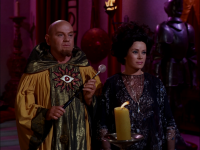
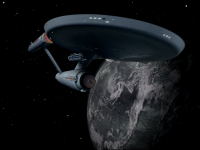
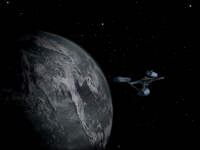
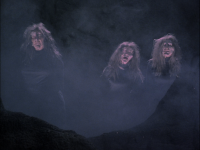
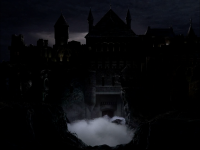

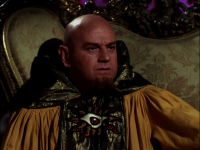
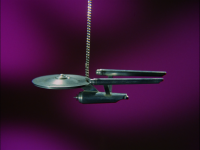
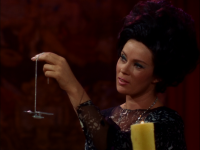
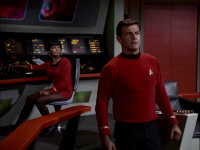
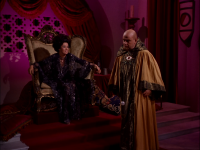
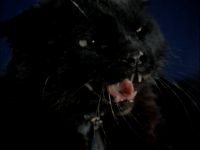
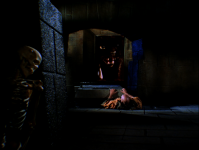
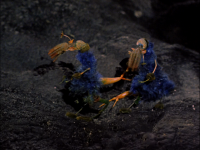
Star Trek TOS - 2x07 - Catspaw
Originally Aired: 1967-10-27
Synopsis:
Aliens on a mission of conquest hold the crew captive. [Blu-ray] [DVD]
Filler Quotient:
3, bad filler, totally skippable.
- Pretty lame episode with no significant long term continuity.
Problems
- The cat's meowing and shrieking was dubbed in such a way that it doesn't match the cat's mouth movements.
- The aliens in their real form were puppets and the strings were at times very easy to see.
- Spock said that mapping expeditions have charted the "solar system" featured in this episode before. This is a common error. The term they were looking for is planetary system. The planetary system we live in is called the Solar System because our star is named Sol. As such, the term "Solar System" is a proper noun, not a generic term.
Factoids
- This episode establishes that DeSalle is the ship's fourth officer and will take command when Kirk, Spock, Scotty, and Sulu are all off the ship.
- This episode establishes that the Enterprise is capable of manufacturing precious gems.
Remarkable Scenes
- Kirk regarding the witches: "Spock, comment?" Spock: "Very bad poetry, captain."
- Kirk seducing Sylvia.
- Kirk, Spock, and Korob being chased by the giant cat.
- Kirk destroying the alien illusion device.
My Review
The Squire of Gothos + Return of the Archons = Catspaw. Like The Squire of Gothos this story features yet another super alien that captures the crew and demands something silly along with yet another alien technology plot device (the transmuter) that once trivially destroyed solves all the crew's problems. And like Return of the Archons the aliens yet again achieve their goals by transforming various members of the crew into zombies and trapping the crew inside of an ancient Earth stereotype. To be frank, Star Trek didn't need a Halloween special, much less a poorly executed one.
The following are comments submitted by my readers.
- From kaser on 2010-05-13 at 9:58pm:
This episode is sub-par to say the least. The language is stilted, the jokes lame. The fight scenes are badly directed. The cheap costumes and mis-en-scene furnishings seem to bear the dust of the studio B closet. The story is jumbled and poorly told. A felinephobiac might get a brief thrill from the screeching catwoman but there is otherwise little dramatic effect to this careless production. The deflating of the shabby bird-like marionettes are a fitting ending to this mess. How did Shatner keep from giggling through his final speech? - From Old Fat Trekkie on 2011-12-10 at 2:35am:
Oh just had to mention it. This was the first episode shot in the second season. Assignment Earth was the last. Did any one else notice that in both of these episodes a cat turns into a chick?

Star Trek TNG - 7x14 - Sub Rosa
Originally Aired: 1994-1-31
Synopsis:
Crusher falls under the spell of a ghost lover. [DVD]
Problems
- In one scene, the Enterprise was in standard orbit during the power transfer, which seems like an impossible situation to maintain, as eventually the Enterprise would be on the other side of planet, unable to maintain a moving beam on a fixed target. In another scene they were motionless, as they should have been in the previous scene. In another scene, they were in standard orbit again!
Factoids
- This episode establishes that it is a trivial matter to change the color of one's eyes in the 24th century.
Remarkable Scenes
- The foggy Enterprise.
My Review
This episode is severely boring and cheap ghost story horror all set in a 24th century old Scotland clone colony. Quite trite. Have the writers not learned to how to write science fiction in the last few decades? Essentially the story amounts to Beverly quitting starfleet to sit alone in her house with a candle waiting for her phantom man to sweep her off her feet and Picard and crew becoming ghost hunters. Finally, the episode reeks of tastelessness when Beverly's grandmother is briefly and spontaneously resurrected by Ronin for absolutely no reason. In the end, Beverly kills the energy life form of the week out of anger; completing the circle of cliches.
The following are comments submitted by my readers.
- From Wolfgang on 2008-05-20 at 10:58pm:
Why did they make this episode? It's not even science-fiction, and certainly not Star Trek. Just a waste of time. If they wanted to put some spotlight on Crusher, why not give her a good episode... - From Paul on 2010-08-18 at 12:43pm:
I am Scottish so yet again I am forced to listen to the worst american versions of Scottish accents I've ever heard
Also if they were trying to recreate the Scottish highlands why did they use stones from Glasgow and Edinburgh? - From Tallifer on 2011-03-13 at 9:36am:
I like stories where the ghosts are shown to be tricks, hallucinations, dreams, mere legends or hoaxes. That is the triumph of rationality which is fitting in a science fiction universe.
I hate stories where ghosts are explained by nonsensical pseudo-science. Which is more rational? The spirits of dead people haunting the world and possessing the living, or "anaphasic" aliens using "plasma" candles as foci and inhabiting people with green energy? Neither is rational of course, and the latter is just as stupid as television psychics and alien abductions. - From thaibites on 2013-01-05 at 2:50am:
Another one for the ladies. I think Dr. Beverly actually had a couple orgasms during this episode, which is pretty daring for TNG.
At least this one was better than the episode where where Dr. Beverly fell in love with a big intestinal sea cucumber. - From L on 2013-05-02 at 2:26am:
Beverly's performance was quite, um, erotic. It was clear what form the energy alien's 'gift' to her took. Her aura of post-coital bliss/addict with a fix was quite convincing.
There was nothing particularly wrong with the relationship as it seemed quite symbiotic, it could have worked quite fine in other circumstances. It did however make Beverly act like an irrational addict and cut ties to her friends.
But really this was just an excuse for a gothic genre episode. Worth it for Beverly's performance.
- From Sloganlogo on 2014-04-30 at 8:22pm:
small trivia…In the first Scene after the titles between Troi and Beverly you can clearly see a grave stone with the name McFly…The scene ends with Beverly asking Troi to walk with her to visit a house and off the go.
In the next scene Picard is chatting to a Colony local and in the background you can clearly see Troi in the background walking right to left. She ends up in the same position she was in the the last scene. I suspect they swapped the two scenes about.
- From rendraG on 2015-01-08 at 7:32pm:
Great ghosty fun with lots of olde world sets. Nice to see Picards almost death for love to overcome passion and the spell Ronin had casted over Beverly and her unfortunate but clearly sexually exhausted ancestors.
Ronins emotional and sexual domination of Beverly combined with the sensual acting of Gates McFadden make this the naughtiest episode in all of Star Trek. Woof.
- From Keefaz on 2017-02-18 at 11:45pm:
Amazingly rotten episode. Absolute guff from start to finish. The bizarre Scottish colony which has 25th century power and weather stabilisation facilities but also candles, open fires, dusty books and so on. Weird accents. Ghost sex. The creepy revelation the ghost has been preying on every female ancestor of Beverley.
A terrible episode, then, but one that is so odd and singular that it doesn't diminish the series as you couldn't even consider it a Star Trek episode.

Star Trek TNG - 2x04 - The Outrageous Okona
Originally Aired: 1988-12-12
Synopsis:
The roguish Okona charms the crew. [DVD]
Problems
- Data called it "an amphibian briefcase." But Fish are not amphibians. Maybe he used the word because the fish was meant to be out of water and therefore had amphibious qualities?
- Picard: "Lasers do not even penetrate our navigational shields." What the hell are navigation shields?
Factoids
- When Data selected his comedian, the name of the comedian on the computer panel was Ronald B. Moore, who is one of the visual effects guys working on the show.
Remarkable Scenes
- Guinan: "Because you're a droid, and I'm annoyed." Data: "Humanoid." Guinan: "Yes." Data: "You told a joke." Guinan: "Yes!" Data: "I am not laughing." Guinan: "Yes!" Data: "Perhaps the joke was not funny." Guinan: "No. The joke was funny, it's you, Data." Data: "Are you sure?" Guinan: "Yes!" Data: "I agree."
- Data on the holodeck practicing humor.
- Data trying to tell jokes.
- The hostile but harmless ship.
- Picard: "They're threatening to attack the Enterprise!" Okona: "They're crazy, they wouldn't stand a chance!" Picard: "Right!" Then walks away with a confused look on his face. Poor Picard, trying to maintain good diplomatic relations with everyone can be hard!
My Review
This episode is entertaining, funny, and light hearted. This is both its greatest advantage and its greatest disadvantage. While this episode is quite accessible and easy to jump into, the degree to which it doesn't take itself seriously also makes it a bit hard to get into. Its biggest saving grace is that the actors selected for the guests all did a fine job, making the A plot at least reasonably compelling, especially when paired with a humorous Data side plot. However, once again we have an alien race that looks exactly like humans and a fairly predictable small scale plot. A fairly average, somewhat unremarkable episode.
The following are comments submitted by my readers.
- From DSOmo on 2007-06-17 at 4:12am:
When Worf goes to retrieve Okona, he find's him on deck 7. We know this because the first two numbers on the woman's door are "07." Yet when Worf and Okona walk out of the room and onto a turbolift, they are now on deck 11 (the door says "11"). Wrong door markings or did they take a side trip we didn't see? - From Jon on 2008-09-01 at 3:11am:
Navigational shields are shields projected ahead of the ship by the deflector dish to protect the ship from damage by micro-particles, space dust and other small debris that could cause catastrophic damage to a ship traveling at high speeds, relatavistic or warp. - From Razorback on 2009-06-22 at 3:50pm:
I agree with jon. It would make sense that all warp vessels have them. - From Daniel Blessing on 2009-09-18 at 3:35pm:
You stated, and asked...
"- Picard: "Lasers do not even penetrate our navigational shields." What the hell are navigation shields?"
Navigation shields are the shields the ship uses to move aside space particles, dust, micro meteorites, e.t.c. while traveling. I am not 100% certain, but I believe they are powered by the main deflector. The power output required to keep them up and running is so minimal in terms of what the ship can generate, they are actually tied into life support systems. They are always up and running as long as life support is functional.
This may however be the only time they are actually called "Navigational Shields." Silly Picard.. =] - From Matt on 2010-07-17 at 10:33pm:
I think navigational shields are low powered shields that protect the ship's hull from various floating debris and radiation. They aren't shields powerful enough to stop phasers however. - From CAlexander on 2011-03-23 at 9:27pm:
I can't exactly commend this episode, but it was amusing. It feels as though there wasn't really a script; the director just got up and said, "The premise of this episode is that Okona is a Loveable Scoundrel. Everyone act accordingly. Now improvise!" - From One mooo on 2012-02-21 at 6:27am:
Perhaps it is because I have seen this episode half a dozen times before but the comic guy scenes are actually painful for me to watch. I would call this a so so episode. With a rating of meh. - From Chantarelle on 2014-06-29 at 9:16am:
I'm not sure if it's coz I'm a girl, but I loved this ep. I agree that it was meh, and somewhat unremarkable, but that scoundrel was just too fun, and too damn cute not to enjoy. I wouldn't have cared if he was knocking up half of the galaxy, I just wish they'd put him in the same amount of clothing that the women from TOS had to wear ;-) - From Diane on 2015-06-20 at 4:24pm:
Liked Okana and that TOS-ish storyline. Agree that the comic scenes are painful and that storyline feels like a worst night at the improv. - From jeffenator98 on 2019-10-25 at 5:16pm:
Excruciating. 0/10 - From Azalea Jane on 2021-07-14 at 6:27am:
"Well, the unexpected IS our normal routine."
Data's explorations around humor in this episode are interesting and often entertaining. The way he moves his hands while telling a joke gets me laughing every time. And I like how he can't be funny on purpose, but keeps being accidentally funny. "My timing is digital!"
I do feel like humor could be explained better. There's been a lot of theorizing about what makes people laugh, and it would have been interesting if they had dug into that a little more. Everyone is giving him examples, but nobody gives him theory that he could really dig into.
Some of it was odd, like Data's line "jump around like an idiot," which seems out of character. You can also spot visible disappointment when he realizes the crowd is programmed to laugh. I continue to wonder if Data's clear expression of hope and/or letdown around his understanding of humanity is intentional or not.
Data's habit of asking about a term he's not immediately familiar with, then looking it up in his own databanks and answering his own question, is getting pretty old. They did it in the pilot ("snoop"), they've done it a few times since, and they do it here ("rogue"). And then he runs at the mouth. Why, writers?? Why would Data ask a question when he has access to the answer?
If you freeze frame right when Picard says "terminate communications" with the two other ships, both the men on the screen raise their arms up at the same time. Nice touch. - From MJ on 2023-01-17 at 7:03am:
"A monk, a clone, and a Ferengi decided to go bowling together..."
My rating for this episode, and the entire TNG series, takes a slight hit because we never get the punchline for this joke. At the very least, they could've made this the joke that Data finally "gets" when Geordi installs his emotion chip in the movie "Generations."
Anyway, this is standard TNG Season 1-2. It's light and entertaining, a semi-interesting plot, but no real substance or intellectual delivery like we'll get in the later seasons. It doesn't suck, but it's not amazing. I think "5" is a very fair rating.

Star Trek Dis - 1x15 - Will You Take My Hand?
Originally Aired: 2018-2-11
Synopsis:
With Georgiou at the helm of the plan to end the Klingon war once and for all, the U.S.S. Discovery crew struggles to fathom and tolerate her hostile tactics. Memories of past hardships are rekindled within Burnham.
Problems
- An orbital shot of Earth clearly shows that Los Angeles still exists during this time period. However, Voy: Future's End established that it had sunk into the Pacific after an earthquake in the mid-21st century and became a reef.
- In DS9: The Changing Face of Evil, Martok mentions that the Klingons were never bold enough to attack Earth. It stretches credulity that Martok wouldn't have considered a fleet of ships in visual distance of Earth preparing to attack being turned away at the last second to not constitute an attack.
- The simulation of Qo'noS being destroyed ends with the typo "END SIMULTATION."
- When Discovery leaves for Vulcan, we see it fly past Jupiter. Saru then asks if they have "cleared the Sol system." Detmer says they have, which is wrong because they then pass Neptune.
- It takes Discovery around ten seconds to travel between Jupiter and Neptune at subwarp speeds, which is far too fast, even if the planets were lined up. But even then, they wouldn't be lined up. In the 2250s, Jupiter and Neptune will be on opposite sides of the Solar System.
Factoids
- Clint Howard plays the Orion who gives Tilly drugs in this episode. He previously played Balok in TOS: The Corbomite Maneuver, Grady in DS9: Past Tense, Part II, and Muk in Ent: Acquisition.
- A shot of a urinating, presumably male Klingon in an alleyway would seem to imply that Klingons have either two penises or at least two organs capable of urinating. This would be consistent with previous continuity establishing Klingons to have numerous redundant organs. It is also the first time we've seen urination on screen in the franchise.
- A deleted scene from this episode depicts Georgiou being invited to join Section 31.
Remarkable Scenes
- Tilly's swift rude awakening to the fact that Georgiou is mirror Georgiou. The fearful, awkward salute is the best part.
- Georgiou, upon witnessing the Orion dancers: "I knew your whole universe couldn't be boring."
- Burnham: "The only way to defeat fear is to tell it no. No, we will not take shortcuts on the path to righteousness. No, we will not break the rules that protect us from our basest instincts. No, we will not allow desperation to destroy moral authority."
My Review
This is an extremely disappointing conclusion to a story that opened with a lot of potential in the terrific pilot. The pilot offered the potential for a story that articulated the deeper reasons for the Federation-Klingon cold war we see in TOS. The potential for a story about nationalist tribalism that both resonated with real world events and substantiated the unique quirks of Klingon culture that ripple across the chronologically later stories. The potential for a story that sets up a century-long struggle in vain to "remain Klingon" that ends on a tragic but dramatically compelling whimper when Ezri Dax correctly assesses that the Klingon Empire was dying and deserved to die a century later on DS9. How can one "remain Klingon" when one defines Klingon identity as blood and soil the way T'Kuvma, Voq, and L'Rell did? We always knew their ideology was destined to fade into the mists of history as the Klingon Empire was gradually subsumed into the Federation's inevitable hegemonic melting pot.
This theme isn't new. Non-Federation aliens have felt threatened by the Federation melting pot many times on Star Trek. Recall this quite revealing exchange from DS9: The Way of the Warrior. It begins with Quark, regarding root beer. Quark: "What do you think?" Garak: "It's vile." Quark: "I know. It's so bubbly and cloying and happy." Garak: "Just like the Federation."
As an important piece of context, normally neither Quark nor Garak would bother with experiencing Federation cultural trivia unprompted by others, but the Federation's expansion and its growing appeal to more and more Alpha Quadrant species had begun to make it harder and harder to ignore the Americana (so to speak) of the Federation.
Their conversation continued. Quark: "But you know what's really frightening? If you drink enough of it, you begin to like it." Garak: "It's insidious." Quark: "Just like the Federation."
This is why the Klingons went to war with the Federation. They wanted to "remain Klingon" in the face of the frightening threat of the Federation's expansion due to the growing appeal of the Federation's values. T'Kuvma, Voq, and L'Rell rightly regarded the Federation as insidious. It posed an existential threat to their xenophobic values, which opposed diversity, inclusion, and assimilation.
But by the end of the season, all the potential for a deep meditation on Klingon nationalist tribalism had devolved into a set of motivations and events with layers of incoherence caked upon each other. Even setting aside the fact that the narrative lazily cut over most of the war using the mirror universe diversion, L'Rell's infiltration plan turned out to be ill-conceived and failed miserably. She easily could've died on numerous occasions—most notably when the ship of the dead was destroyed—and kept narrowly escaping death entirely due to dumb luck, rather than any kind of skill or planning. Her reprogramming of Voq turned out to be riddled with bugs and she never achieved her original objective of using him to gather intelligence about Discovery's spore drive.
The way she comes out on top in the end is likewise painfully incoherent on many levels. Burnham decides on the basis of seemingly nothing more than naive hubris that L'Rell could take over the Klingon Empire by brandishing a PADD with a claim that it can blow up the world. L'Rell idiotically agrees that is a workable plan and further agrees to end the war she just a short time ago was so deeply committed to that she was dropping lines like, "This war ends when we crush you." She even took a beating to prove her commitment to Klingon tribalism. But all those deep commitments suddenly vanished as soon as Burnham offered her a half-baked way to take over the empire. It turns out L'Rell was never a committed nationalist. Just power hungry.
She was also, as always, the beneficiary of incredibly dumb luck. It's not clear why the High Council would believe her when she said to them, "Hey guys, I've got this PADD that can blow up the world, so therefore I'm the leader of the Klingon Empire now." It's even less clear why they'd be so willing to just call off the war based on such an unproven threat when they had Earth itself on its knees. Nor is it at all clear why Klingons everywhere would all unanimously agree with this radical reversal instantly without the slightest hesitation. When all the Klingon ships just turn around and go home, the narrative expects us to celebrate it as a victory for peace, but it's hard to not just laugh at the absurd implausibility of the scene instead.
It's also ridiculous for the narrative to imply that everyone thinks L'Rell's hold on power could ever last. The Federation essentially effectuated a regime change in the Klingon Empire. L'Rell even did it holding a Federation PADD. It's hard to imagine that not breeding resentment among at least some Klingon houses, who might already be a bit annoyed that they had to call off the war on the eve of victory. Since the PADD is gene-locked, all they'd have to do to end the threat she poses to their homeworld is assassinate her. Or what if they just destroyed the PADD? Or how about the fact that L'Rell couldn't possibly monitor every Klingon on the planet? They could go spelunking for the bomb and dismantle it. Clearly, neither the characters nor the writers thought any of this through.
L'Rell and the war are just the tip of the iceberg of vacuous writing here though, as there are a litany of other stupid details in this episode. It's hard to accept that Burnham's and Saru's obnoxious behavior on the bridge wouldn't have immediately blown Georgiou's cover. It likewise strains credibility for Saru to be outraged about letting Georgiou out of confinement when he did exactly the same thing with L'Rell in an earlier episode. The height of absurdity here is letting Georgiou go in the end. There is no reason for this other than to make it convenient for the writers to bring her back randomly in the future. A bad story point motivated by lazy writing.
Also Georgiou said Cornwell told her that Tyler's "Klingon id has been neutered" and that he is "benign" and "useless to them." She also says he is somehow tarnished to the Federation. But these statements are contradictory on their face. If he's useless, then he's also harmless. But if he's useful, then clearly there's potential for harm. The latter is clearly shown to be the case by the events of the episode, as he seems to have access to all of Voq's memories. Thus, he seems far from useless, but don't tell Tyler. Because at the end of the episode, he idiotically agrees that he's "no good for either side." The narrative seems to idiotically celebrate this line as though he said something really deep. (He didn't.) Then Tyler undermines the point anyway by going to live on Qo'noS, which for those of you keeping score at home, happens to be picking a side. He might be "no good for either side" (which is wrong), but he's totally picking a side anyway (because it was a stupid line to begin with). Speaking of Qo'noS, it is stated in an earlier episode that no humans have been there in 100 years. And yet no one seemed to care about a whole bunch of humans being there during this episode. In fact, there seemed to be a whole bunch of them there already before the landing party even got there. Go figure.
And then there's Cornwell's absurdly swift caving on her plan to destroy the Klingon homeworld as soon as Burnham calls her up and says, "Hey, genocide is bad." Cornwell's response was basically like, "Golly, yeah, you're right, I didn't think of that!" On that note, it's hard to imagine a good reason why neither Cornwell nor Sarek appear to have been punished for attempting a genocide. And speaking of Federation policy on matters of great significance, it appears the Federation has put the spore drive in mothballs, in an apparent attempt to resolve the continuity issue of why we never see it again. It's good that they're trying to respect continuity, but as usual they did it in a terribly sloppy way. It's stated that Starfleet is working on a "non-human interface" to the spore drive, which implies that there are significant medical consequences for piloting it, but that doesn't actually seem to be the case. We've seen Stamets pilot it several times. Sometimes he had some medical problems, but they were always quickly resolved. It's not actually terribly clear precisely what danger the spore drive poses now or why they can't just keep using it.
It should be noted briefly that there are a handful of small details to praise in this episode. Georgiou enjoying herself on the Klingon homeworld was highly amusing. The depiction of a rich, reasonably diverse society on Qo'noS was nice to see too. We saw minority communities and non-warrior castes of Klingon society, which has been somewhat rare on Star Trek thus far. Also Discovery's jump into the underground caves showing the ship struggling against the planet's gravity was depicted in a much more satisfying way than the similar scene in The Butcher's Knife Cares Not for the Lamb's Cry when Discovery appears to magically hover over Corvan II effortlessly. It's also nice to see that Discovery will soon get a new, presumably permanent captain.
Though that brings us to that neat trick the writers pulled at the end, whipping out that pretty shot of the fully reimagined Enterprise swooping in majestically, as though just begging us to forget about the incredibly unsatisfying episode we just watched because something better lies ahead. The audience pandering isn't even concealed, given that the emphasis of the scene isn't on the supposed emergency that brings Captain Christopher Pike to the Discovery, but instead on the nostalgic glee of seeing the Enterprise again. As for the reimagined Enterprise, we should all have mixed feelings about it. On the bright side, it's a great way for the writers to send a clear message to us about how they regard rebooting visual continuity. Previously it had been a bit more vague. They seemed to be respecting some visual canon, but not all of it, so it wasn't clear where their boundaries were. As such, for those invested in visual canon remaining consistent, watching Discovery has so far been a vaguely stressful exercise in "which canon will they crush this week?" Selectively respecting or rebooting canon is bad storytelling as has been previously discussed, but it would've been even worse if we never got a complete answer as to which visual canon they will and won't respect. With this episode, we've finally gotten a pretty clear answer to that. They'll reboot anything. They'll even reboot the Enterprise. Nothing is sacred. We can accept that now and move on, even if many of us may disagree with it.
What should give us pause about that though is by now it's clear that the writers' blasé regard for visual canon is merely a reflection of their blasé regard for all canon. This season has been riddled with continuity errors both internal to Discovery and external to other Star Trek shows. Their whole approach to canon in general is at best described as strained, and at times has been downright sloppy. So for those of you who are unconcerned with visual canon but are still hoping that the writers will build upon story canon respectfully, at this point the best advice would be to not get your hopes up too much. The track record so far hasn't been great. And unlike the illustrious Enterprise season 4, it seems unlikely that better writers will show up at the end of the show to clean it all up this time. We're witnessing the soft rebooting of all of Star Trek, not the careful stewardship of a timeless epic. Where once the whole of the story was treated with the literary rigor required to carefully interweave a chronology spanning centuries, now Star Trek is just being arbitrarily twisted and morphed with little regard for the finer details like a pulp comic book franchise.
And like a comic book franchise, we have a proportional reduction in internal storytelling depth. This season has repeatedly violated the principle of "show, don't tell" in its writing. Aside from obvious details like cutting over most of the war, there are more subtle violations of this principle as well. In this very episode, we have Burnham telling us how Klingons murdered her parents rather than the narrative showing us. The scene would've been dramatically improved by a flashback, but we didn't get one. The war would've been dramatically improved by showing it to us, but we didn't get that either. And most importantly, the terrific pilot offered us potential for the story to show us how the Federation learned to stop taking "shortcuts on the path to righteousness," to see how the Federation learned how "not break the rules that protect us from our basest instincts," and how to "not allow desperation to destroy moral authority." But we weren't shown any of that. We were told it in a speech the narrative didn't earn.
This season of Star Trek started out by asking a lot of difficult questions about the tension between identity and multiculturalism, and then merely pretended to answer them. It punted the deep questions with shallow platitudes.
The following are comments submitted by my readers.
- From Abigail Chappell on 2018-02-20 at 10:47pm:
I agree with everything you said, but I guess I'm not as profoundly disappointed as you -- primarily because I didn't have that high of expectations to begin with. And I still argue that it's a HUGE improvement over the last couple of movies, which were pure garbage. With my expectations set amazingly low by those films, this TV series has cleared the low bar. :)
My thoughts on the final episode echo some of what you said. It's absurd that they let Georgiou out of confinement and in charge of a starship. That made no sense at all.
I also thought the end of the war was incredibly abrupt. I mean, it didn't make much sense anyway, the way the Klingon faction were all fighting with each other, unorganized and divided, yet they could easily overpower the Federation anyway. But it was like all the episodes showed them losing the war, and things just getting worse and worse -- and then BAM! Nevermind, war over, we won! It just left me feeling like, "Huh? What just happened?"
But, having said that, I'm glad that the war ended, because I'd like for Season 2 to focus on something new and different. I didn't want the war to continue another season. So although I would like for them to have ended it more soundly, I'll take it.
The minutes at the end with a voiceover by Burnham were pretty cheesy. It was trying to be deep and meaningful, but it just came off as ... well, cheesy!
I'm also kind of stuck on how this series is supposed to take place around the same time as the original series (right?), but they are SO MUCH more technologically advanced, based upon the aesthetics of the bridge and the way monitors work (things popping up in the air -- like a magical touch screen?). Obviously this has to do with the era in which the show was produced, but it's odd.
Despite all my grumbling, I actually am looking forward to season 2 and shall continue to watch. - From Claus on 2018-02-21 at 9:55pm:
The second half of season 1 is very entertaining and far better than the first 9 episodes. It's kind of a copy of the "Agents of Hydra" part of Agents of S.H.I.E.L.D. season 4, complete with evil counterpart of the main characters and uplinking people to "The Network". It's extremely fun to watch, and I like that this "Mirror arch" consists of several episodes and not just one or two.
Normally in Star Trek, phaser gun fights are a little boring, since you always know the outcome. Main characters are never killed, unless there are a reset button in the end. But hey, Star Trek Discovery is nothing like other ST series. They dare to do the unexpected. I love it then things are not predictable. Ok, you might argue that people behave irrationally, and that ST Discovery is far from the "real" Star Trek spirit. But I certainly prefer something fresh and unpredictable than just the usual stuff.
Episode 13 is the best episode of the season, and I just love evil Georgiou. - From tigertooth on 2018-03-27 at 8:59pm:
Everything about Starfleet's interaction with evil Georgiou was terrible. Besides what has already been mentioned, the entire crew of Discovery knows she was killed. The entire crew knows that there are mirrors of everybody in the mirror universe. But nobody could put two and two together to figure out this was mirror Georgiou?

Star Trek Voy - 3x05 - False Profits
Originally Aired: 1996-10-2
Synopsis:
Ferengi opportunists pose as gods. [DVD]
Problems
- The Universal Translator translates rhymes in alien languages into English perfectly?
Factoids
- This episode is a sequel to TNG: The Price.
- The Rules of Acquisition have 47 official commentaries, ~900 official major and minor judgments and ~10,000 considered opinions.
Remarkable Scenes
- The Ferengi pleading to be returned to the surface. I hate the fact that Janeway returns them to the surface, but I at least enjoyed the Ferengi's performance in this scene. They were funny.
- Rules of Acquisition; 10. Greed is eternal. 22. A wise man can hear profit in the wind. (We don't know the number of this rule). Exploitation begins at home. 95. Expand or die. 299. Whenever you exploit someone, it never hurts to thank them. That way it's easier to exploit them the next time. (This rule is fake; Neelix made it up.) The unwritten rule: When no appropriate rule applies, make one up.
My Review
I'm not fond of this one at all as Janeway makes seriously bad decisions. A wormhole leading to the alpha quadrant is discovered, but Janeway won't go through it because Ferengi are exploiting the planet below. She beams them up and all is well, then she just lets them go for no good reason. All her problems could have been solved by just abducting them, going through the wormhole, and washing her hands of it all, but nope. Janeway's gotta do the "right thing" and let them go. She just takes the word of the Ferengi that their absence could damage the culture even more! Oh, so now we have to make it look like they leave naturally... waste more time on the Ferengi and before you know it they somehow manage to overpower ship security, steal back their shuttle, return to the alpha quadrant, and destroy the wormhole leaving it so Voyager can't go through either. And we're supposed to have sympathy for Janeway after these events? She was royally stupid! Oh yeah; and this episode features yet another alien race that looks exactly like humans. What a waste of a fantastic connection with a decent TNG episode.
The following are comments submitted by my readers.
- From Pete Miller on 2006-08-17 at 1:17am:
This is another annoying "Voyager might go home in season 3" episode. However, the connection with the TNG episode was absolutely brilliant and extremely fun to watch. AWESOME way to bring closure to that TNG episode. And of all the ways to be foiled out of returning to the alpha quadrant, it's at the hands of those damn Ferengi! :) - From Tallifer on 2011-04-09 at 2:47am:
Janeway constantly reminds me of those British officials of the Raj in India who refused to go native in any way, giving rise to the expression, "Only mad dogs and Englishmen go out in the midday sun." She often makes stupid decisions only for the sake of upholding an inflexible and narrow idea of Federation values. Kirk was a Federation captain too: could she not model herself after a hero of the Federation rather than some ineffective armchair admiral? - From Inga on 2013-08-26 at 10:56am:
The thing is, there really was a risk of damaging the culture by abducting their "gods", so I at least understand why she made that decision. Of course, the part with the Ferengi owerpowering the ship's security is beyond ridiculous, but this is the writers', not the Captain's fault.
@Tallifer In 'Flashback' Janeway mentioned that Kirk lived in a "different time", where the Captains could get away with things they wouldn't be able to in the 24th century, so that might be one of the reasons she wouldn't model herself after Kirk. - From thaibites on 2014-01-31 at 7:50am:
I'm not sure, but I think they said the wormhole ends would pop up sporadically in different places on BOTH ends after the Ferengi destabilized it. I think this adds a nice touch to the story because the Ferengi might end up millions of light years away from their home. Maybe they wouldn't even go to the alpha quadrant? If I'm right, it's an appropriate punishment for them.
Also, I loved the boob shots in the beginning - camera low, with the bottom of the boobs uncovered, standing directly behind the Ferengi sitting on his throne. It's the most "remarkable scene" in the episode. - From Sylvain on 2015-04-13 at 8:28am:
Janeway is clearly suffering from plot induced stupidity here though. It was obvious Voyager wouldn't be getting back to the Alpha Quadruant yet, and ofcourse the Ferengi couldn't just be left alone exploiting people like that either. - From tigertooth on 2016-09-17 at 4:17am:
I'm pretty okay with suspending disbelief, and it wasn't a huge problem here, but let's be honest: there's no way a universal translator could fool a primitive society. It would look like an overdubbed movie. There's no way the speaker's lips would look like the words they were hearing.
Granted, that speaks to all ST episodes, but I'm willing to overlook the fact that Cardassians and Romulans should look like a kung-fu film. It's just better visually for them to speak English.
And that's why I'm fine with human-looking aliens. The fact is that they needed a lot of extras and making them all up (including the Starfleeters who beam down) would have eaten into the budget. So they just make them look like humans. If that means they can put more money into sets or effects or whatever, I'm good with it. - From Chuck the Canuck on 2023-07-04 at 1:02pm:
How do these dimwitted Ferengi always manage to outsmart or outmaneuver Federation security? It happened in TNG episodes "Rascals" and "The Perfect Mate" and now here. These two couldn't hit someone right in front of them with a giant sword, and we're supposed to believe they overpowered a security guard and somehow managed to shoot open a shuttle bay?
And worst of all, as pointed out in the original review, they manage to persuade Janeway that removing them would somehow damage the fragile culture of the planet. Unreal...as if the inhabitants wouldn't come up with a supernatural explanation for the sudden disappearance of their "Sages".
So, actually, this is a pretty bad episode for Tuvok. Two Ferengi manage to overpower his security officers and outdo him at the logic game.
The only good thing about this episode is continuity with "The Price" which was a cool idea and made sense. But it's typical Voyager: take a great premise for an episode and execute it poorly.
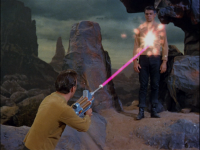
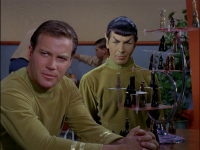
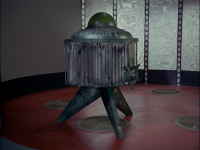
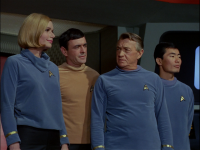
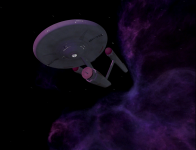
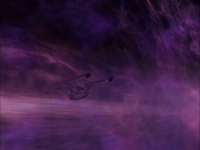
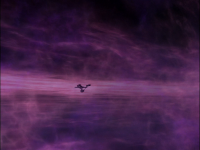
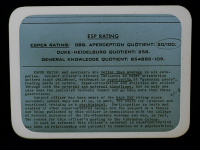
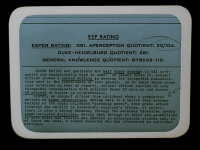
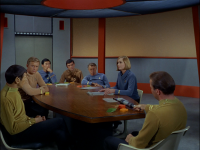
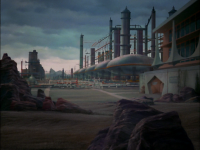
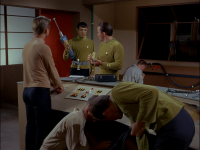
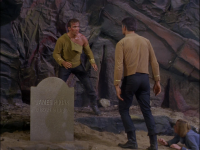
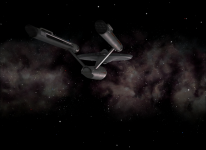
Star Trek TOS - 1x03 - Where No Man Has Gone Before
Originally Aired: 1966-9-22
Synopsis:
Kirk's friend Gary Mitchell is transformed into a god-like entity. [Blu-ray] [DVD]
Filler Quotient:
3, bad filler, totally skippable.
- This episode is profoundly annoying in characterization and filler plot-wise. Unless you're a hardcore fan, you should probably just skip this one.
Problems
- The existence of a gigantic and unexplained barrier at the edge of the galaxy which prevents ships from leaving requires an extremely high degree of suspension of disbelief, but who knows, maybe some god-like alien put it there...
Factoids
- The uniforms and makeup in this episode are slightly different because this was the second episode to actually be produced (after The Cage). As such, not all of the visual continuity in this episode is consistent with the rest of the series.
- This episode establishes that Spock is part human.
- This episode did not have the "Space, the final frontier" introduction.
- This episode establishes that Kirk's full name is James R. Kirk. This will later be retconned to James Tiberius Kirk.
- This episode strongly implies that humans during the time of Star Trek are slowly evolving telepathic abilities.
- Dr. McCoy is notably absent in this episode.
Remarkable Scenes
- Gary "sensing" trouble with the engines while in sickbay.
- Gary reading people's thoughts.
- Kirk: "I didn't order any..." (Spock walks in with the phaser rifle Scotty was referring to.) Kirk: "Affirmative, landing party out."
- Kirk trying to convince Elizabeth to realize that god-like power was never meant for humans because they lack the wisdom to use it properly.
- Kirk defeating Gary.
My Review
The Enterprise travels to the edge of the galaxy where it inexplicably encounters a gigantic energy barrier preventing ships from leaving the galaxy. Rather than the plot of the episode focusing on such an amazing discovery, instead we spend all our time focusing on Gary, who has become a god-like being due to exposure to said barrier. Why the energy barrier seems to impart god-like abilities on humans with high ESP ratings is a question also completely glossed over because, apparently, that's not interesting to the writers of this plot.
Instead, the plot drones on mercilessly telling us a story about how humans must not acquire such terrible powers, for they will abuse them with all due haste. Consequently, a story that could have been jam packed with the thrill of incredible scientific discoveries on a cosmic scale is reduced to essentially a rehash of Charlie X, except Gary somehow manages to be even more annoying a character than Charlie. I guess it's because at least Charlie has a decent excuse, given his childhood isolation. In any case, this episode is a huge flop and a big missed opportunity to do something much cooler.
The following are comments submitted by my readers.
- From Tony on 2008-09-23 at 4:09am:
Quick Factoid: This was the second pilot episode created for the series; “The Cage” was rejected, but the series was given a chance to create a second pilot and they made this, obviously, it was accepted.
And now for my review. I felt that this was a great episode, technical issues aside. It was engaging, and had an interesting situation. According to Wikipedia (Memory Alpha), the fist fight was what got this episode accepted, but that is hardly the best part. - From curt on 2010-04-06 at 4:06pm:
Again this is you being way to hard on the seies. We all know that this episode has its faults, but keep in mind its the 2nd pilot. Even the characters have not been fully created. And you call it cliche because of it's godlike premise, but this episode was made before Charile X. So I would say Charlie X is more cliche(Although I do like Charlie X). I know thats not the way it aired but you cant take anything away from an episode just because what order you watch them. Like the episode in Voyager season 1 where they try to get home, by going through a wormhole or someshit. If it bothers you to much, just watch them in a different order. Why cant people look over little plotholes and enjoy the overall story. Its not real life you know. - From john bernhardt on 2010-04-27 at 3:07am:
An alternate edit of this episode is available on the recent Star Trek Third Season Blu-Ray.
This includes a new intro and alternative opening monologue from Shatner along with different music cues and some never aired footage. - From CAlexander on 2011-04-04 at 12:22am:
I feel that this episode was OK, but could could been better. The way it is paced feels odd to me, sort of flat. We have very little time to see what Gary's original personality is, then he becomes a threat. They talk about his escalation of power being geometric, but it doesn't feel geometric at all – he instantly becomes a creepy supermind, then very slowly gains new powers. On the plus side, Gary does a good job of acting creepy and disturbing, without being so obviously bonkers that you want to kill him right away. And I felt for poor Kirk – how do you put your best friend to death because he is weird right now, but you think it is likely he will become an unstoppable menace in the future? It violates all normal laws and morals.
- Problem: After Gary is knocked unconscious, he has to stand upright on the transporter pad in order to be transported. It looks pretty weird.
- The psychiatrist seems to be about as good at psychiatry as the redshirts are at security. She does nothing useful! At least she makes up for it at the end by zapping Gary with her god powers. I liked that part.
- From Robert Koenn on 2011-08-03 at 6:57pm:
I found this episode to be fairly good. It's main theme was most definitely scifi core stuff and for being the first episode of this new series at the time was quite good. I gave it a six. Of course there were flaws, even a perfect episode has flaws but the overall theme and plot were very good. It was to me one of those more esoteric plots of the far future. A bit along the lines of some of the early Clarke conjectural stories. There are other episodes like Trouble with Tribbles that use the scifi universe for a fun time but this used it for a very intelligent plot and interesting story. Just my thoughts, hardly a big favorite but still fairly good. - From Mike Meares on 2012-02-07 at 10:17am:
I am not sure I would call “Where No Man Has Gone Before” a flop, but I do agree it could have been better.
The odd thing about this episode was although it wasn’t the first one aired it was one of the first ones I saw. It really drew me into the Star Trek world and it will always have a warm spot in my heart.
I do agree with the criticisms here but like someone pointed out it was the second pilot. But watching it now you can really see how the episode is struggling to form the ideas and characters that were later to develop into Star Trek.
The episode feels a little like Phase Two ( but much more professional of course ) in that it seems a little raw and uneven.
But one scene stills stand out for me in this one.
The scene in the Briefing Room with Kirk and Spock talking about what to do with Mitchell. That scene still gets to me.
When Spock says, “Then you have one other option, kill him while you still can,” that still floors me. I can’t think of another TV show that would ask our hero to commit murder. Very powerful.
Although I do agree not one of the best episodes but still pretty good. - From Glenn239 on 2012-10-04 at 3:44pm:
A '6'
Gary from Where No Man Has Gone Before is more interesting than the later “Q” or Trelane, but the Godlike powers he evolves and adversarial relationship with Kirk are a dead-end combination, as the ending to this episode showed. Gary was much more interesting to me in sick bay reading quickly and making observations about why the impulse engines were going to blow up than he was later strutting around the planet. They should have toned down Gary’s powers, make the relationship between him and Kirk as much distrusting as it is adversarial, give him vulnerability and a common problem to solve. Maybe even have Gary survive, though we’d certainly have to drop him off at a starbase rather than seeing the egotistical Shatner put up in the rest of the series with a rival that is in every way his equal.
I liked the strong female lead, even though that character’s opinions were unhelpful whenever they weren’t wrong. Shades of Troi, with the strong ESP thing. Pity the show didn’t stick to there being a strong female lead. I also liked seeing the evolution from the original plot to the second pilot. You can literally see the production team fixing one problem after another – casting, sets, props, uniforms – as they go, and their alterations are invariably steps in the right direction.
- From Schreck on 2013-05-23 at 5:23pm:
this second pilot has a lot of continuity errors, and i find it weird that the studio didn't like the first pilot because it was called "too cerebral" yet, they liked this one...i still think gary mitchell would have made a better story line than kahn for into darkness...i give it a 6.5 and my brother a 7... - From john on 2014-03-31 at 11:23pm:
This was a great episode. One of my favorites. It shows the fascination and desire for power inherent in all of us but that that goal is ultimately corrupted by human nature. Good production values, action sequences and dramatic story of Gary's escalating powers and the ambiguity in morality of how to deal with it. - From jd_juggler on 2015-03-22 at 1:48pm:
This episode did not establish kirk's full name as James R. Kirk; it established that Gary Mitchell THOUGHT that was kirk's full name. And nowhere in the original series is kirks full middle name given.

Star Trek TAS - 1x07 - The Infinite Vulcan
Originally Aired: 1973-10-20
Synopsis:
While visiting a new planet Sulu is poisoned and Spock becomes cloned by the Phylosians, a plant-like species. [Blu-ray] [DVD]
Problems
- Giant Spock...
Factoids
- This episode was written by Walter Koenig, who played Pavel Chekov on TOS. It is the first Star Trek production to be written by a Star Trek actor.
Remarkable Scenes
- Kirk: "Beam us up, Scotty!" Another very close line to the famous and much parodied but never actually uttered, "Beam me up, Scotty!"
- Spock reciting the philosophy of the IDIC.
- Kirk: "Any chance of teaching me that body throw?" Sulu: "I don't know. It isn't just physical you know; you have to be inscrutable." Kirk: "Inscrutable? You're the most scrutable man I know!"
My Review
This episode is completely pointless. It tries to make a point about how creating a master race is bad, but the ridiculousness of the plot blasts away any profound messages that it attempted to convey. We're not given any explanation for why Keniclius or Spock were so huge, the plant aliens were interesting but ultimately served no purpose, and Keniclius' goal of creating a peacekeeping army was pointless seeing as how starfleet is essentially just that. In the end, Keniclius gives up way too easily; or should I say not soon enough because his motives were so blurry? Only small details in this episode redeem it, such as Spock's recital of the philosophy of the IDIC and the reference to the Eugenics war of 250 years ago.
No fan commentary yet.

Originally Aired: 2019-10-5
Synopsis:
Ensign Spock's first day aboard the U.S.S. Enterprise doesn't go as planned when he and Number One are unexpectedly stuck together in a turbo lift.
Problems
- The exterior shots of the turbolift are still showing huge, implausibly cavernous empty spaces all throughout the interior, this time of the Enterprise instead of Discovery.
Factoids
None
Remarkable Scenes
- Spock: "Have you ever considered that the Prime Directive is not only not ethical, but also illogical and perhaps morally indefensible?"
My Review
This coda to Discovery's second season chronicles Spock's first day on the Enterprise, as portrayed by Discovery's visual reboot of the Enterprise. It is notable that this episode takes place prior to TOS: The Cage, making it even more inexcusable for Discovery to have not recreated the recap to TOS: The Cage in its new aesthetics during If Memory Serves. If they have budget to do random codas featuring Spock, Number One, and Pike, then they had budget for that too. Indeed, the issue was never budgetary most likely, but as noted in the review for If Memory Serves, the writers were most likely taken in by the absolute worst kind of selective nostalgia: rebooting visual canon, except for when they're feeling sappy and nostalgic and want to literally reuse old shots in a stupid and jarring way. As for this story, it is mostly unremarkable. It isn't bad. But it isn't that good either. This feels more like the sort of thing you'd find perusing the deleted scenes of a film only to say, "Yeah, I can see why they cut this."
No fan commentary yet.

Star Trek Dis - 2x15.5 - Ephraim and Dot
Originally Aired: 2019-12-11
Synopsis:
Ephraim, a humble tardigrade, is flying through the mycelial network when an unexpected encounter takes her on a bewildering adventure through space.
Problems
- There is no window in sickbay.
- The ship is mislabeled as the Enterprise-A.
Factoids
None
Remarkable Scenes
None
My Review
Like The Girl Who Made the Stars, this is a reasonably charming little story, making better use of the animated medium than TAS. Unfortunately the framing device makes it impossible to reconcile with canon. There is no reason Starfleet would make an educational film about a technology that has been classified in order to be buried and forgotten.
No fan commentary yet.

Originally Aired: 2003-10-1
Synopsis:
The NX-01 gets closer to a showdown with the Xindi when Captain Archer takes on an enigmatic passenger: a beautiful slave named Rajiin. [DVD]
Problems
- Reed refers to the "smaller" Xindi ship, but they were both identical in size.
Factoids
- Randy Oglesby, who plays Degra in this episode, played Trena'L in Ent: Unexpected, Kir in Voy: Counterpoint, Silaran in DS9: The Darkness and the Light, the twins in DS9: Vortex, as well as one of Riva's chorus in TNG: Loud as a Whisper.
Remarkable Scenes
- Archer still suffering from his experiences in Ent: Extinction.
- Archer winning a fight!
- Trip and Reed trading Earth spices to the chemist for the Trellium-D formula. I loved his silly little laugh.
- T'Pol, observing the destroyed lab: "Some of our calculations may have been slightly off."
- Rajiin's interesting athletics in the engine room.
- The Xindi boarding Enterprise.
My Review
Ent: Rajiin was a better episode than I thought it would be. But this is largely due to the parts of the episode that didn't deal with Rajiin. She seemed largely unnecessary to me. If the Xindi needed scans of humans, why didn't the reptilians and the insectoids just abduct one, then scan it all they wanted? They certainly seemed more than capable. Some things I liked were the Xindi and their unique weapons when they boarded Enterprise. I also enjoyed the scene when T'Pol and Trip tried to synthesize Trellium-D. Finally, the chemist on the trading colony was just great. These are the details which make a Trek episode great. They do a lot to enhance this rather ill conceived episode.
The following are comments submitted by my readers.
- From fan ive on 2009-12-26 at 11:31pm:
you asked why didn't the reptilians and the insectoids just abduct one.
probably because they didn't wanted to be exposed, and so they tried to do it in more discrete way
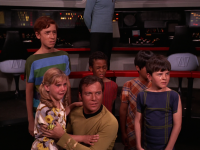
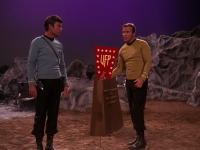
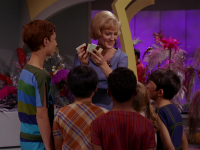
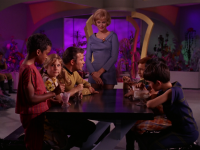
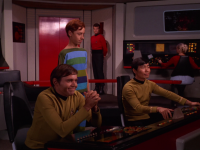
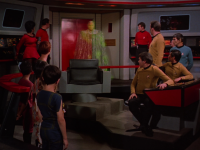
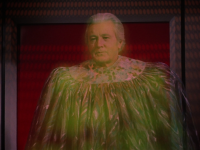
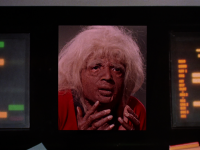
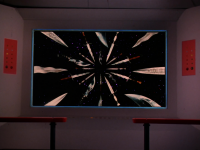
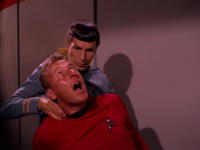
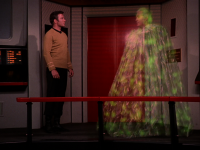
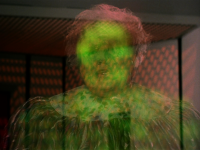
Star Trek TOS - 3x04 - And the Children Shall Lead
Originally Aired: 1968-10-11
Synopsis:
A group of children is being controlled by an evil force. [Blu-ray] [DVD]
Filler Quotient:
3, bad filler, totally skippable.
- Pretty lame episode with no significant long term continuity.
Problems
- Right after the scene when Kirk begins to feel he's losing his command abilities, Spock and Kirk get into a turbolift and it starts moving without either of them specifying a destination!
- At one point Kirk reasons to the children that the entity is afraid of being seen. This is after Kirk had already witnessed the entity being perfectly content with being summoned to the bridge in front of the entire crew.
Factoids
- This is the first episode in which we see a United Federation of Planets logo. Though there's no accounting for taste...
Remarkable Scenes
- Scotty going psycho on his mind controlled officers.
- Kirk accidentally beaming two men into space.
- Kirk's entire bridge crew freaking out.
- Kirk speaking gibberish to the redshirt.
My Review
This episode is essentially Miri without the absurd technical problems. That, however, does little to enhance a blatantly bad premise. The slow, plodding plot just makes most of the main characters look stupid, as it takes 39 minutes into the episode before it finally dawns on Kirk and Spock that the children must be having some kind of mind control effect on the crew and thus must be neutralized in order to regain control of the ship.
Ten minutes before that scene, I was already shouting "just phaser the damn kids already!" at the screen, as by that point the crew had more than enough evidence to draw that conclusion themselves, not the least of which was the scene when the children summoned the entity in front of the entire bridge crew, prompting him to rattle off his entire secret plan to all the main characters. That's the moment when I'd have phasered the kids right there.
But we didn't even get that moment, as all it took to neutralize the children was to show them a video of their bizarre behavior from the beginning of the episode so that they'd finally face the fact that their parents are dead, start crying, and deprive the entity of its power over them. McCoy had been clamoring for them all to do something like that since the beginning of the episode, and yet nobody ever bothered to try the video thing until Kirk got desperate. No wonder McCoy was insisting that they take the kids to a starbase for a proper psychological examination. Maybe they've got counselors over there worth a damn.
But thanks to the converging interests of both Kirk and the evil entity, neither of which wanted to go to the starbase for no coherent reason, they never did. Kirk should have authorized going to the starbase to gain access to the child specialists that were there. The entity should have authorized going to the starbase to attempt to fool the specialists and to gain false legitimacy so the children could less conspicuously request transport to a Federation colony. A better story would have shown us these competing tactics, but alas, that would have required more sets, more characters, and more entertainment value. We can't have that.
The following are comments submitted by my readers.
- From Orion on 2011-03-06 at 7:21pm:
This episode has no entertainment value, expect for a few unintentional laughs. You have child actors who come across as brats. Yeah, I know, they were being controled by an outside force, but man, these kids are annoying. Later on, in a forced scene the kids become sad, which is unintentionally hilarious due to all the fake crying.
After two crewmembers die, there'e really no sign of remorse. Also, nodody helped Uhura when she "saw her own death." She spent the whole episode staring into the mirror and crying.
Of course, the most chessy thing about the episode is the mind control via fist pumping.
On a quick note, the Blu-Ray upgrade didn't change too much. The knives floating through space still look the same, even though the disc seems to indicate otherwise (it prompts you to change toggle between old and new effects, but the knives look the same either way) - From Bobby on 2011-08-21 at 6:45pm:
That bit where Mr. Spock says, "we may have to kill the children" ...
Nonsense! Just cut their arms off where they can't make that motion with their fists. :) That'll fix it.
- From Abigail on 2012-05-31 at 11:27pm:
At the end of this episode, I had reached a few conclusions:
- Children are obviously much easier to manipulate than I'd ever realized. Now I'm unsure why teachers struggle so much with classroom management. Clearly it takes very little to convince them of something, and then of the exact opposte.
- Children from the future are always incredibly annoying. A great many Star Trek episodes have shown me that.
- I need to know where the girl with the blonde pigtails got her jumpsuit. I think it would look remarkably good on me. - From Strider on 2012-06-25 at 2:43pm:
Every bit as bad as I'd read it would be. There was one nice moment in the turbolift when Jim was having his "I've lost command" breakdown, and for some reason begins to strangle Spock, and Spock just says, "Jim." Jim gets himself together and breaks the spell. I live for those moments of connection between characters.
But right before that...what was Spock seeing/experiencing that made him defy Kirk's orders? All he said was "I don't think we need to trouble Starfleet" or something. If Spock's fears came alive on the bridge, I would expect to see either Jim dying or Spock's emotions burst out of control.
And why does the Communications Officer have a mirror at her console as big as any one of her computer screens? Seems unprofessional at best.
Anyway, I spent a good 2/3 of the episode thinking "Stun them with your phaser! Use the Vulcan nerve pinch! Sedate them, for God's sake!" I may have yelled it to the screen a time or two, actually. - From Glenn239 on 2012-09-26 at 2:04pm:
A ‘2’. A bad episode of Star Trek is like a plane crash; a series of unrelated errors cascading into catastrophic failure. No doubt with a longer production schedule and better judgment this episode could have been much better. Perhaps Freiberger was more inclined to step on mines that Roddenberry may have avoided.
In ‘The Thing’ a group of scientists isolated in the Antarctic stumble across a wrecked camp where, judging from the bodies, things had obviously ended quite badly. Then have to deal with a malevolent alien presence which infects their camp by way of the sole survivor, a dog. Part of the awesomeness to the story is that the dead guys from the first camp leaving a handy video log that is just incomplete enough to perfectly develop the plot.
And the Children Shall Lead is also that story. But The Thing was magnificent while it sucked. Mistake 1 was the kids; using child actors is always a risk since most of them can’t act. Find one kid that can act, you are lucky. Find four or five? The odds of that must be astronomical, like flipping a deck of playing cards in the air and having them land all stacked in perfect sequence. Mistake 2 was the villian; he looked stupid, he dressed stupid, he had stupid motives, and he died stupidly. (Actually, with the poofy hair and cheezy plastic see-through poncho he comes across like he was always being summoned from the ghost beauty salon) He wants to conquer the galaxy? So now it’s cross-dressing ghost Hitler? Um, ok. Mistake 3 was the baffoonish interplay between the kids and the crew of the ship. I don’t care if Sulu is afraid of swords and I don’t care that he’s too stupid to figure out it must be an illusion. Next stop, catastrophic failure.
If Star Trek ever got an ‘episode mulligan’, this might be the one. Ditch the kids but keep the premise. I think it’s Kirk who said, ‘We may have to kill the children’. Now there’s an interesting idea. Back in the 1960’s there was an awesome short story called ‘The Counterfeit Man’. In it, the ship’s doctor decided he had to murder a crew member he suspected was an alien. He had no evidence and nobody else believed him, but ‘spaced’ him anyway, (blew him out an airlock in a great sequence where the alien, still looking like a dude, pleaded with him not to). What an awesome premise – what if Kirk or McCoy concluded they had to kill a survivor who looked human based on the hunch that they were actually an alien?
- From Alan Feldman on 2012-10-19 at 1:55am:
"And the Children Shall Lead"
How did Kirk know Gorgan's name? It's not mentioned at all before Kirk asked Spock to play back the tape.
Kethinov: You ask for more sets, more characters, more entertainment value. You forgot "more money". According to what those involved said, they had a very low budget for the third season. They spoke of doing "ship shows", shooting most of an episode on the ship to save money. Speaking of money, it seems like they spent a lot more money on the pilots than on any of the regular episodes! Maybe it's because you only do a pilot once -- okay, in this case, twice!
AEF - From Colin Pearce on 2013-03-20 at 4:04pm:
Although I agree that this episode is far from the best (in fact, it’s in my 3 worst episodes list), a common criticism / misconception is that Uhura has a mirror on her console.
He reflection, both young and old, is intended to be displayed on her console screen, not a mirror. The mirror was obviously used by the production crew to save time and money rather than superimposing her young image onto her console screen, as her older image actually was. When Kirk goes to comfort her, there is clearly no mirror on her console, only readouts. Only she can see the image, just like only Sulu can see the swords on the viewscreen.
The use of the mirror was sloppily done, but the intention of the production crew was that she was looking at her console. The remastering team should definitely have fixed this flaw, but once again they miss another instance requiring an easy fix.
- From Alan Feldman on 2013-04-03 at 2:15am:
More on "And the Children Shall Lead"
Re the "mirror": Yes, the first shot clearly shows a real mirror. But it's a very short shot -- only a second or two. Plus I think it's safe to say it was assumed that people were watching it on not very large, standard def televisions from at least several feet away. So they probably thought they could get away with such a short shot. And they probably did. Watching it in my youth, I didn't notice anything funny. I think I was fixated on the image and the story and so didn't notice the mirror vs. display aspect of it. It just seemed like a mirror to me with her mirror image aged by "the beast within her".
Interestingly, in that shot, we see Uhura centered, which means she probably couldn't see herself! (Notice also that the mirror doesn't quite line up with the console display behind it.)
I think there's another reason they used an actual mirror for the first shot. Notice that it's used only for _young_ Uhura. By using an actual mirror it is quickly established that she's seeing a reflection of herself. It also produces an extremely accurate (!) reflection (except for the angle bit). Then the second shot shows old Uhura on the console display, and we have already assumed there's a mirror, or something functioning as a mirror, there somehow. I'm guessing this is to make up in part for the motions of real and imagined Uhura not matching up quite right. And perhaps also to make it clear she's looking at herself, as old Uhura looks so different!
Keep in mind that they had a very small budget for the third season, or so they've claimed.
This episode still has its fun moments.
So what's with the food cards? How is it that with only a handful of 3-inch wooden squares you can have almost any variety of food you want? This has always struck me as rather odd, to say the least. In this episode, the last kid asks for chocolate marble and pistachio. Nurse Chapel picks a card and is about to put it in the slot when the kid interjects, "And peach". Well, she has a card for that, too -- but out of only two cards, no less!
This happens in other episodes. For example, there's the scene in "Tomorrow is Yesterday" where Kyle asks the sergeant what he'd like to eat. The sergeant says "chicken soup". Then Kyle, who is holding only four wooden cards, just happens to have one for chicken soup. Am I missing something here?
AEF, aka betaneptune

Star Trek Dis - 2x05 - Saints of Imperfection
Originally Aired: 2019-2-14
Synopsis:
Burnham and the crew navigate a dangerous alien landscape in a race against time to save Tilly's life, but Stamets is not at all prepared for what they find in the process. Section 31 is assigned to help track down Spock, much to Pike's dismay.
Problems
- None beyond the ridiculous mycelial magic discussed at length in the review itself.
Factoids
None
Remarkable Scenes
- Georgiou showing up and Pike not knowing her true identity.
- Georgiou: "You're the one who brought me to this insufferable place. You don't get to be surprised I'm here."
- Tilly: Whatever you are, I am holding a Type 3 phaser rifle. Which is more powerful and generally larger than the Type 1 or the Type 2. I guess that's why they call it a 3."
- Culber suddenly appearing cowering and traumatized.
- Stamets' reunion with Culber.
- Tilly to May: "To him, you're the monster."
- Culber's rebirth of sorts in the mycelial cocoon.
My Review
Quoth Michael Burnham: "And if there is a greater hand leading us into an uncertain future, I can only hope it guides us well." It's as though she's begging the writers for fewer cringeworthy lines like, "Words define us," (like, whoa man!) and more coherent storytelling, because this episode is a bit of a clunker. What we have here is a story about some mushrooms kidnapping Tilly into their mushroom space via a mushroom transporter, but it turns out the mushrooms just need help defending themselves from a dead guy made of mushrooms who is then reborn using the mushroom transporter; meanwhile after a full search of the Mushroom Kingdom, it turns out your Spock is in another castle.
All joking aside, Stamets' reunion with Culber was legitimately touching and well-acted. This even aired on Valentine's Day. Aww! But the plotting is ridiculous even by Discovery's standards. The magic powers of the mycelial network approach Voy: Threshold levels of voodoo. The story is vague at best about precisely how Culber's "soul" was transported to mycelial network to begin with. We can maybe help the writers out here by cooking up some absurd rationalization that the story didn't give us: Let's assume that Stamets' connection to the network was the conduit by which he arrived there. Perhaps Stamets and Culber had a connection between them through some sort of special mycelial infection Stamets shared with Culber through intimate contact, such that Culber's consciousness was copied to the network before he died. But even so, there are still so many problems. Why did the jahSepp recreate Culber just to break him down again? Why would the jahSepp want to eat something that was made from their own matter when it was established that they only break down foreign matter? And for that matter why didn't Tilly ask May to stop the jahSepp from eating the ship once they forged an alliance to defeat the "monster?"
The writers simply weren't interested in rigorously sketching any of that out. They just wanted to turn up the urgency of everything to eleven and hope you wouldn't notice that these things don't make sense. Except of course when they painfully interrupted a countdown to have an emotional scene. This happens frequently on Discovery, but this episode was a particular offender. It felt like people were constantly warning the away team that they need to hurry because everyone's about to die, only to see the away team turn around and talk about their feelings for an excruciatingly long amount of time.
The most painful thing about the episode though is the retconning of Section 31. In the 22nd century Section 31 exists as a shadowy organization nobody knows about. They do super shady things and the very few people exposed to them react with horror and work to root them out. Now in the 23rd century Section 31 is basically the CIA, everyone knows who and what they are, not many people think what they're doing is particularly shady, and nobody wants to see the organization rooted out. Then in the 24th century Section 31 is somehow back to being a shadowy organization nobody knows about. They do super shady things and the very few people exposed to them react with horror and work to root them out.
Yeah, sure, we can concoct some tortured rationalizations for why Section 31 was widely known and fairly popular in the 23rd century but not in the 22nd or 24th, but—say—driving them underground after some incident during the events of Discovery doesn't erase the apparently widespread knowledge that they previously existed. What are we supposed to believe, that after they are driven underground they make everyone forget they ever existed, Men in Black style with a flashing amnesia device? Though that would be fitting given Discovery's track record of transforming Star Trek into a goofy comic booky MCU-tone story. As usual, Discovery is playing it fast and loose with canon and hoping we don't think about it too hard.
And that's exactly the problem: it takes extremely tortured rationalizations to make any of this Section 31 stuff make sense. And beyond that, the whole idea of the narrative itself treating Section 31 as a necessary evil rather than the total perversion of what the Federation stands for that it is is precisely the opposite of the spirit of Star Trek. The whole concept behind Section 31 has always been to depict them as monstrously evil. Such evil should not be glorified by Star Trek. We especially shouldn't glorify it by simultaneously glorifying a mirror universe character as some sort of antihero.
Bad mushroom science is one thing, but Star Trek has seriously lost its way with this Section 31 plot thread. It's an insult to Star Trek and everything it stands for.
No fan commentary yet.
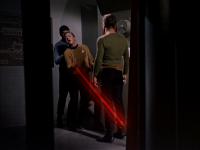
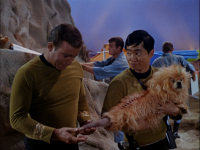
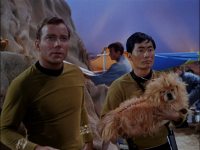
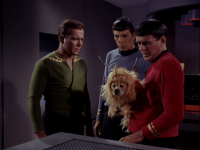
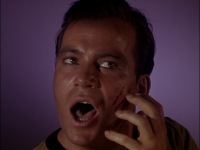
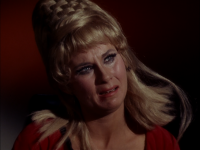
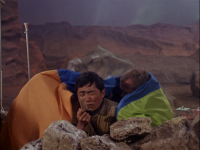
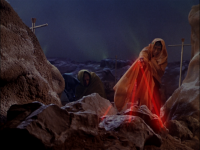
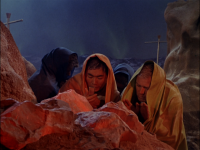
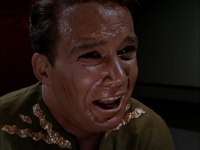
Star Trek TOS - 1x05 - The Enemy Within
Originally Aired: 1966-10-6
Synopsis:
A transporter malfunction creates an evil Kirk. [Blu-ray] [DVD]
Filler Quotient:
3, bad filler, totally skippable.
- Pretty lame episode with no significant long term continuity.
Problems
- It seems ridiculous that there would be no other means to retrieve the landing party other than the transporter. Does the Enterprise not carry smaller landing craft? If so, why can't they use them? There should have been some dialog in the episode explicitly ruling that possibility out.
- At one point, evil Kirk's scratches were on the wrong side of his face due to the image being mirrored for some reason.
Factoids
- This episode establishes that the phasers can be used to store energy in rocks so they can be used as a heating source.
Remarkable Scenes
- Evil Kirk being evil.
- Rand telling her story in the presence of good Kirk.
- Kirk confronting his other half.
- Spock Vulcan neck pinching evil Kirk.
- McCoy regarding the alien dog: "He's dead, Jim." Count 2.
- Spock and McCoy arguing over whether the dog died of terror or some technical malfunction with the transporter reintegrating its two halves.
- Evil Kirk pretending to be good Kirk.
- Kirk's reintegration.
My Review
The Enemy Within is story with a high minded idea but poorly executed characterization. The episode seems so infatuated with the idea of Kirk having two mutually exclusive halves to his personality which he's in a constant struggle to reconcile that they exaggerate the whole ordeal to the point of ridiculousness, overlooking any opportunity to more deeply explore his character in the process. That said, there are a few worthwhile details here and there.
I like how one of the first things evil Kirk does is pursue Rand. It's good continuity with The Naked Time where Kirk expressed hidden desires for Rand. Another nice detail was Spock comparing his struggle to reconcile his human and Vulcan ancestry with Kirk's split in two dilemma. Finally, I certainly do enjoy the idea of exploring human psychology in the sense that we all have more basic instincts that we not only need to suppress but also at times need to draw on in order to reach our full potential.
The trouble is what little exploration of this topic the episode engages in is shallow at best. As such, there's little of value in this story other than the amusement of watching evil Kirk do evil things along with one or two decent action scenes. Overall this is a pretty disappointing offering.
The following are comments submitted by my readers.
- From Bob Dalley on 2008-02-05 at 1:27am:
In this episode when Kirk is on the planet, his uniform has no insignia and even when he and his twin beam up there are no insignia on the uniform. A few scenes later, both Kirks have the insignia on their uniforms. Just wanted to point out this error. You may want to add this to your review. - From Mark J on 2008-03-16 at 10:58pm:
Shuttles were not introduced to starships until around the 'Galileo Seven' episode, which is rather later in Season 1. There was no fanfare to this effect as far as I know.
Apart from perhaps being a little campy, and Shatner eating the scenery (which I quite enjoyed) and the production mistakes (scratches etc) I thought this was a wonderful episode, especially linking the two halves in with Spock's Vulcan/Human ancestry. OK so the pooch was nothing more than a plot device (where did it come from) but this is more than overwritten by the analysis of a man dealing with loss and the fear that he could lose his crew and himself. - From TashaFan on 2008-09-09 at 1:10pm:
I think the lack of insignia on Kirk's shirt is no accident. Since the evil Kirk is supposed to be a mirror image of the good Kirk (I believe the part in his hair is reversed when he first materializes) the insignia on the wrong side of the chest would have made it too obvious that something was wrong to anyone who saw him... I believe this error was deliberate to prevent a bigger problem that would have created a plot hole. The fact that they had to keep reversing the film also accounts for the confusion with the scratches on Kirk's face, most likely. As for not using the shuttle, I remember as a child yelling that at Spock... of course he couldn't hear me. :) - From 411314 on 2009-06-15 at 1:43am:
"They could have ruled shuttles out with an easy one liner, such as the atmosphere having a corrosive effect on shuttle hulls..."
Even then, they should have explained why they didn't beam shelter down to Sulu and the other men on the planet to keep them safe untill they could rescue them. I mean, what was the worst that could happen, that the shelter would split into two of itself? - From Andrew James on 2009-11-18 at 10:34pm:
I loved the use of camera filters to make the "good" Kirk look beautific. - From CAlexander on 2011-04-07 at 5:32am:
I agree, I've always felt the concept here is better than the execution. I've been trying to analyze why. They talk about how it provides fascinating insight on a man's character. What we see is one Kirk with moments of painful indecision, and another Kirk who is decisive but ruled by emotions of lust, hate, and fear. Which I suppose is what they were going for. I think my problem is that I never felt these were two halves of Kirk. I felt that the Good Kirk was the real Kirk. Especially since he is only occasionally indecisive, and it never really hurts him much during the episode, he either gets help from his friends or uses his intellect to overcome it. While the bad Kirk feels like an imposter, not like the real Kirk at all (although he sure is the real Shatner!). We don't really learn anything meaningful about Kirk's character as promised, we see an episode where the crew has to deal with an evil doppelganger of the captain while the captain is suffering from a personal crisis. Which is OK, but not that great. It feels like a few good scenes and a lot of wasted time.
- To 411314: I don't think we know enough about the exact conditions on the planet to complain about how they were keeping warm. They do seem to have beamed down thermal cloaks. Perhaps the crew found it more effective to sit right on the phaser-heated rocks rather than inside the structurally unsound duplicated shelters sent by the ship.
- From Mike Meares on 2012-02-17 at 3:49pm:
"The Enemy Within is story with a high minded idea but poorly executed characterization." - I feel like there is a pattern developing here? lol.
I thoughly enjoy your reviews Kethinov but I sense there is a little "this could have been done better" making it's way into almost every review. I just think this could be said about almost any TV show, especially one made 50 years prior to today.
Despite all the criticisms listed here ( and again they are all valid ) I enjoy this episode very much. I rate it a 5 and I really wish I could rate it higher but the errors are far to glaring to ignore.
I watched this episode again for the 100th time and I still enjoy it. But the techincal errors during the fliming are still a little irritating.
But I beleive the lack of insignia on Kirk's shirt IS, indeed, an accident. When the "other" Kirk first materializes in the transporter room his hair is correctly parted on the left side. The flim was not reversed during this scene nor during the "teaser". So there would have been no need to leave off the insignia.
In fact, the only time I think the flim was reversed was towards the end of the episode when the "kirk's" have their face off on the bridge. The close up of the other "Kirk" was reversed becasue the scratches are on the wrong side of his face. However, I feel this was done by the flim editor who realized that the scene was shot from the wrong angle and corrected it by reversing the flim. ( I guess they were hoping nobody would notice the scratches on the wrong cheek! lol. ) Also in this scene the top part of Kirk's face is cut from view so you really can't tell the part in his hair. It is still a mystery to me as to why the flim editor felt the need to reverse the film. They wanted the other "Kirk" looking left to right instead of right to left. But why is still a mystery?
And the reason I think the lack of insignia was a big mistake was the fact that during the "teaser" neither Kirk had an insignia and during the first scene after that in the transporter room with crewman Wilson the other "Kirk" had no insignia. But the very next scene of Scotty escorting a dazed Kirk to his cabin there is an insignia on his shirt! In fact, from that moment on both "Kirks" have their insignias.
The flim editing was extremely poor in this episode! I could name several scenes that are clearly out of place and moved around. If you are going to move scenes around at least make it look normal.
Despite this though there are a few things I like about this episode. And, again, for me it is the develpoment of the secondary characters. I like the idea of two men manning the transporter. Wilson is a good character, as well as Fisher and Farrow as well. But just like Riley, they were on a couple of episodes and then gone. Too bad.
Also several scenes stand out for me. When Spock tells Kirk he doesn't have the right to be vernable in the eyes of the crew that was very powerful. And again towards the end of the episode Spock explains "being spilt into two halves is no theory" for him. Great scene.
And I resist calling the other "Kirk" evil because I don't think that is correct. Like Dr. McCoy said in the episode that the other "Kirk" isn't "really evil, he's human!" That whole explanation during that scene by the doctor is so great. McCoy was right. Both "Kirks" were the real Kirk.
I don't feel the episode is a waste. But it definitely has it's problems. I do feel that with some rewriting and better flim editing this could have been an outstanding Star Trek episode.
A small nitpick of mine. When Spock says "Thermal Heaters were transporter down, they duplicated. They won't operate." I have to ask myself, If I duplicate a piece of equipment why won't it work? The Transporter Malfunction seemed to be duplicating everything and separting their emotions. Eh........Manchines don't have emotions..... Hello!
- From Kethinov on 2012-02-18 at 9:08am:
Of course "this could have been done better" makes its way into almost every review. Otherwise every episode would get a 10! :)
For most episodes it's the reason for and degree to which it could have been better that's interesting to analyze. Anything else would just be shameless gushing or bashing.
Since most people come here to find which episodes were the best (or worst) of Star Trek, I try to write carefully balanced reviews and highlight both the good and the bad in each episode.
The rating will thus generally be weighted against the "what worked" and "what could have been better" analyses. The pattern is quite deliberate. - From Ken on 2012-07-25 at 12:09pm:
I believe Mike Meares has it correct. The scratches on the other side of the face, were a result of shooting bad Kirk's scene from the wrong angle. I believe they realized that his character would not have been speaking in the correct direction, so they had to reverse the image to make it seem so. However, putting the scratches on the other side of the face was even more noticable. - From warpfactor 10.1 on 2012-08-08 at 10:19pm:
One of the many splendid things about this episode is the animal that is presumably from the surface of the planet. Not only is it able to stand temperatures of - 120 at night but, remarkably, it also looks a bit like an earth dog onto which someone has stuck a horn and antennas.
A little known piece of trivia is that when Margaret Thatcher was looking to use a Star Trek episode title as a catch phrase to demonise the trade unions she had decided on 'The devil in the dark' before Sir Geoffrey Howe, an avid Star Trek fan, convinced the rest of the cabinet that they should use 'The enemy within' instead. She never forgave him. - From Glenn239 on 2012-11-06 at 4:44pm:
‘5’
Sulu: We’re freezing to death down here captain. Can you send us a shuttle?
Kirk: No, don’t be absurd. We can’t do that. We don’t want to break up our set. You don’t want us to have to start collecting all over again, do you?
Sulu: No, but what about the hot coffee we were mentioning in the previous scene?
Kirk: Are you mad? Too risky. What if you drink the angry coffee by accident?
Sulu: Ok. Can you beam down a shelter?
Blankets? How about a fireplace with a warm fire already burning in it? How about just heating stuff up from around the ship and beaming it down? Can you at least phaser out a hole in the ground so that we can get out of the wind?
Kirk: No, no, no, no and no. Stop whining and be the dramatic tension of the episode like you’re trained to be. Oh – and those phasers you used to warm the rocks around you three scenes ago? Nice try mister. We’re beaming those up so that you can’t do that again.
Sulu: Captain, this episode has a lot of holes in it.
Kirk: I know. The most interesting premise was when evil Kirk was going to abandon you, but we even screwed that up by making sure that the whole crew knew it was the wrong Kirk. We’ll try again later this season. Next time we’ll explain the shuttle thing by having it be a shuttle accident. Instead of two of me, we’ll have some dickish Commodore. It’ll be great. Kirk out.
Later that day…
Kirk: So you see, Yeoman Rand, it wasn’t really me, it was just the evil part of me.
Rand: Oh, yeah. Merely the half of you that wants to rape me. Nothing to worry about there.
Kirk: Yes, that seething cauldron of raw aggression is safely back where it belongs – inside me, frothing just below the surface, and held in check only by the will of that super wimpy guy you saw who couldn’t decide his way out of a paper bag.
Rand: Perfect.
Kirk: Really?
Rand: Yes, captain, you see I’m a women. I crave long-winded overly-rational explanations for all my relationship difficulties, and I do not hold grudges for past slights far into the future. I’m sure that you being slapped back together in some untested half-assed transporter experiment has worked perfectly well, and there’s no possible way that you’d have nodded your head to Spock indicating you were properly balanced if you were not. Nothing could possibly have gone wrong there.
Kirk: Wow, this show really is out in space, isn’t it?
Rand: Yes, and I look forward to being part of the adventures for many more seasons to come.
Kirk: I’m sure you do.
- From Schreck on 2013-05-23 at 6:31pm:
Our first transporter accident episode sees kirk split into two halves, the uninhibited and the meek…although this episode has a good premise the execution is poor…Shatner’s acting is good, but even that can’t save this episode…I give it a 6.25 and my brother has it as his third lowest of the original series coming in at a 5.5 - From Trekkie on 2013-06-21 at 4:43pm:
This episode, in my opinion, was one of the better episodes. I liked how they showed both Kirk's evil and good side, and also how the episode states that we need to have a little of both (good and evil, that is) in order to make beneficial desicions and be stable. - From Katie on 2013-07-07 at 6:24pm:
Aside from all the other plot contrivances, why was it so hard to find "evil Kirk"? Why didn't "good Kirk" just stay on the bridge and announce that any "Kirk" not on the bridge was the imposter?
I mean really. - From 10toes on 2015-08-09 at 11:46pm:
Actually, only the last pill was placebo. The ones before that were the real deal.
Still, doesn't explain why that last pill changed her appearance...
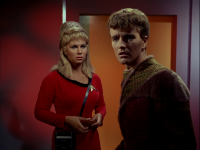
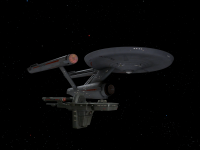
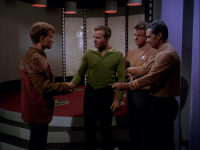
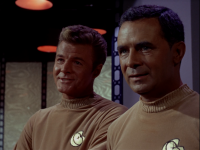
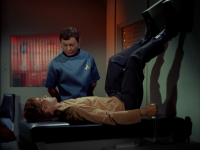
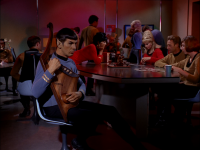
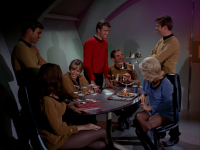
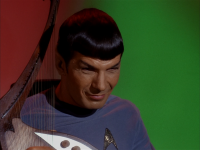
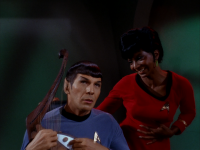
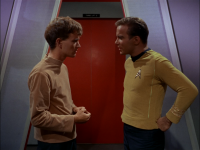
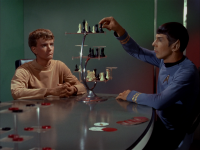
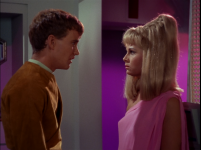
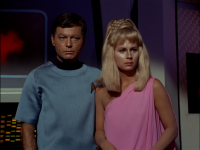
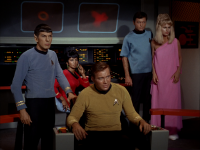
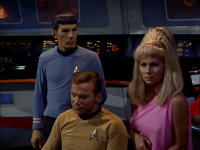
Star Trek TOS - 1x02 - Charlie X
Originally Aired: 1966-9-15
Synopsis:
A powerful teenage boy wreaks havoc aboard the U.S.S. Enterprise. [Blu-ray] [DVD]
Filler Quotient:
2, filler, but an enjoyable episode nevertheless. You can skip this one, but you'd miss out on some fun.
- There's no essential plot or exposition in this episode that renders it unskippable, but it's a decent episode, even though it could have been better.
Problems
- Kirk's uniform mysteriously changes during his turbolift trip with Charlie.
Factoids
- This episode establishes that there are 428 people on board the Enterprise. This number is up from 203 that were aboard when Pike was in command.
Remarkable Scenes
- Charlie: "Is that a girl?" Kirk: "That's a girl."
- Charlie slapping Rand on the ass.
- Kirk and McCoy arguing over who will mentor the boy.
- Uhura singing to Spock's harp playing.
- Kirk trying to explain why you don't slap women on the ass to Charlie and utterly failing at it.
- Rand trying to hand Charlie off to Yeoman Tina.
- The athletic scene with Charlie and Kirk.
- Charlie making Spock say odd things.
- Kirk taking on Charlie, gambling his powers were being overtaxed.
- Charlie begging to stay on board when the non-corporeal green aliens came to take him away.
My Review
A boy growing up in isolation only to be reintegrated with civilization during his adolescence is a fantastic premise for a story, but this wonderful premise is largely ruined by the annoying supernatural influences injected into the plot in order to make Charlie more menacing. Not every episode of Star Trek needs to have aliens, and this episode certainly could have benefited from a simpler story.
That said, despite the handicaps, Charlie X is still a decent story. We certainly do get to see shades of what such a reintegration of a lost child would be like during the scenes when Charlie isn't using his superpowers. The scoring of the episode is also particularly good, especially in the earlier scenes.
The best moments are when Kirk is forced to play a sort of father figure for Charlie against his will. In spite of his stumbling through it, Kirk's pretty good at it! Overall though the episode is high on potential and low on payoff. A better story would have simply shown us what Charlie's reintegration with his closest family on the colony would have been like. Superpowers simply for the sake of seeing superpowers just isn't a compelling drama.
The following are comments submitted by my readers.
- From cowboy dan on 2010-06-03 at 4:26am:
This is perhaps my least favorite episode of this otherwise stellar show. Charlie is excruciatingly annoying and Uhuru's singing scene is, without doubt, the low point of the series' run. Bottom line? children and stark trek do not mix. - From CAlexander on 2011-04-03 at 11:44pm:
You review was interesting, I never thought about this episode having two plots before. I think you may be right, the "Charlie learns to integrate with society" plot could have been the more interesting one. As it was, though, most of this show was a remake of the Twilight Zone episode "It's a Good Life", but not as good. I'm really not fond of the episode.
- It is notable that Captain Kirk is absolutely unable to think of any diplomatic way to deal with out-of-control Charlie. All he does is get angry and try to order Charlie around. The crew's total lack of creativity in dealing with Charlie is part of what makes the episode boring; once he goes out of control, the episode just marches inexorably towards the conclusion. The one idea Kirk finally has, overloading Charlie, is rather weak.
- Kirk totally loses control of Charlie, and decides that it is way too dangerous to let Charlie lose on an inhabited planet. But when the Thasians come, he suddenly argues that Charlie should stay so the Federation can teach Charlie to use his powers wisely. Has he totally forgotten everything that just happened?
- From Mike Meares on 2012-01-27 at 12:56am:
Again I have to agree I too never even considered two plots to “Charlie X.” That was a wonderful point you made Keithinov.
Although I always felt the strong part of this story was the scenes with James Kirk and Charlie talking about life and relating to other humans. I wish this aspect of the episode had been more fully developed.
I also agree that the overused supernatural powers really hurt this story. After watching this episode several times I thought had Charlie merely had the ability to make things disappear, then that may have helped the story line.
I think that would have given Kirk the stage to struggle within himself to decide if Charlie was worth saving. Giving Charlie so many powers it left Kirk with no option but to defeat him, rather than try and change him. Early on Charlie seemed like a kid who was lost and you really felt sorry for him. But by the half way mark you just wanted someone to take a phaser to his ass.
Looking back now the Charlie X story was becoming a little too much like the Gary Mitchell story of Where No Man Has Gone Before. It had all the same elements. And more development of the struggles of a young man trying to intergrate into human society would have been so much better. - From Wiley Hyena on 2012-05-18 at 6:01pm:
Reviewer's rating is too low here. This episode is one of the most memorable if not iconic, but no consensus can be established as to why. Because of the divergent opinions give it a 6. But the bottom line is all Trek fans remember Charlie X. - From Strider on 2012-10-01 at 5:28am:
I agree with the earlier comment comparing this episode to Where No Man and the Gary Mitchell predicament. Charlie's like a young Gary here in terms of his powers. Obviously WNMHGB was filmed first...and using that order, why isn't Kirk's first thought (stemming from his very hard-won lesson) that the only way to deal with Charlie's powers is to kill him? He almost waited too long with Gary! Even going in the order the episodes were aired, and assuming Kirk had to deal with Charlie before Gary, why didn't Kirk contact the Thasians when Gary started going nuts?
I know I look for too much continuity between episodes, and I know it's a lot to expect considering each episode had different writers and directors. But still, I like it best when an episode sees itself as part of a whole, not an individual blip in time. - From Schreck on 2013-05-23 at 8:09am:
another weak first season original series episode that really offers nothing to be hopeful of...i give it a 6.25...my brother gives it a 5.75 - From John Swaisey on 2013-08-25 at 11:18am:
I like this episode, You kind of half feel sorry for Charlie and half want to get rid of him, i thought the ending was good and the crew were sad at Charlies fate.
A good episode, of all Charlies tricks i liked it when he made the womans face disappear. - From Chris on 2018-08-20 at 3:39am:
I really love this episode and think even today, it is plausible in some goofy reality! If notions of beings that are omnipotent exist, then this is perfect and an awesome vehicle to take a run with! The guy who plays Charlie was pretty much perfect and all of his interactions struck me as exactly like any 17yr old child might act under the same circumstances! The whole show was great and the Thasians needed to be explored in more detail down the various roads of Trek.

Star Trek TAS - 1x11 - The Terratin Incident
Originally Aired: 1973-11-17
Synopsis:
A strange flash of light paralyzes the entire Enterprise crew and all organic matter begins to shrink. [Blu-ray] [DVD]
Problems
- Arex claims his eyes can't reach the optical instruments at his station. But there are no optical instruments at his station... Now if he had Sulu's job, or Spock's job, I might have some sympathy for him.
Factoids
- Starfleet uniforms are made of organic matter called xenulon.
Remarkable Scenes
- The crew of the Enterise shrinking.
- The little crew trying to operate the ship's equipment.
- Sulu breaking his leg by falling from his station on the bridge.
- Chapel nearly drowning in an aquarium and Kirk saving her using a string like a rope.
My Review
This episode is remarkable in the fact that the story could not have been done in the live action series because the special effects wouldn't have been up to the task. Additionally, the science behind the crew shrinking is extremely good, especially by TAS standards. It was fun watching the miniature Enterprise crew struggle to operate the ship's equipment. Only the resolution of the plot was a bit contrived. Once again the transporter is the miracle cure, which is annoying. Even more annoying is Kirk's hesitation in rescuing the Terratins. Overall, a great episode though.
The following are comments submitted by my readers.
- From tigertooth on 2017-03-19 at 11:29pm:
This is another poll that clearly got spammed (or maybe a bug caused a bunch of zero votes to accumulate). The other TAS episodes have a few dozen votes total, but this one has nearly 200 votes, and 3/4ths of them are zeros!
If you took away the 144 zero votes (as of this writing), the fan voting average would be 6.7 instead of 1.46. So these fraudulent votes make the average useless.
If there's any way to eliminate the bogus zero votes, that would make the fan voting averages much more useful data. Thank you.

Star Trek Voy - 2x15 - Threshold
Originally Aired: 1996-1-29
Synopsis:
Paris crosses the transwarp threshold. [DVD]
Problems
- Warp 10 is not transwarp. It is warp 10. There is a fundamental difference in the two concepts.
- Warp 10 is an asymptote on the warp scale. You cannot ever reach the asymptote. You can only approach it into infinity. There is no "threshold" at which you stop approaching the asymptote and you actually hit it. This is why traveling at warp 10 is impossible. And when I say impossible, I mean it. Even for Star Trek. It can't happen.
- Sorry, a more pure dilithium just won't take you to warp 10.
- I love it when Harry and Tom get their "answer". The ship is being torn from the nacelles, not the nacelles being torn from the ship! Okay, back up here. Exactly what is propelling the ship if the nacelles have been torn off? Magic?
- So the crew of Voyager construct the fastest warp engine ever conceived that's so fast that it can take you *anywhere* in the time it takes you to say "engage" during their off hours in their spare time? So, uh, why hasn't anyone else figured out how to do this yet? No offense, but surely Tom, Harry, and Torres are not the smartest minds in the entire galaxy.
- So Voyager gets sensor data on every sector in the entire galaxy thanks to the warp 10 flight. Why do we see stellar cartographers and astrometrics officers then after this episode? Maybe because this episode was so absurd even the writers decided to ignore it?
- This episode completely misunderstands the concept of evolution. Evolution is not a process by which a species gets more and more advanced, it is a process by which a species becomes more and more suited to its environment. Are we supposed to believe Paris becoming allergic to water constitutes an appropriate evolution? It almost killed him! Not to mention "evolving" such that he was unable to breathe air and only a toxic gas instead. And all the other things that almost kill him in this "rapid evolution" process...
- So Paris takes Janeway for a little joyride at warp 10. He wanted to get away from Voyager with her. He could have gone anywhere in the entire universe he wanted, but instead he takes her to a planet just a few days away from Voyager. Why?
- The final transformation in this episode, the most advanced form humans will ever achieve is *drum roll please* a giant newt!
- And if that wasn't enough, the doctor's miracle cure is to treat them with antimatter! Do I really have to explain this one?
- And the final blow to this silly episode is why the hell do they never use the warp 10 engine ever again? They could send one person back. They could use it for communication. They could use it for *something*! Answer: because this episode was so absurd even the writers decided to ignore it.
Factoids
- This episode is the winner of my "Worst Episode of Voyager Award" and is therefore a candidate for my "Worst Episode Ever Award."
Remarkable Scenes
- The doctor's method of waking up Tom in sickbay. Not a hypospray or a gentle nudge. He screams at him! Hilarious.
- The doctor: "Hmm. It looks like he's having an allergic reaction. What did he ingest?" Torres: "Just a cup of Neelix' coffee." The doctor: "It's a miracle he's still alive."
- Paris: "I lost my virginity in that room. 17, parents away for the weekend." The doctor: "I'll note that in your medical file."
- I like the scene where the traitorous Voyager crewmember sends the warp 10 data to the Kazon. It ridiculously served absolutely no purpose seeing as how the writers will choose to ignore the events of this episode in future episodes. You might say, well doesn't the entire episode? Yes, that's true. But this one serves even less purpose because it does nothing to advance the current plot of the episode; it's supposed to be a tie in to the Kazon arc. But what good is a tie in on a virtually de-canonized episode?
- Janeway and Tom discussing having had children as newts.
My Review
This episode is my favorite of all the zeros in that it's the one I like to rant about the most. Honestly, this is also one of the most watchable of all the zeros as well. There are many things to redeem this episode. Tom gave a great performance and the doctor's humorous remarks were fantastic. And personally, I see this whole episode as so absurd that it's funny, unlike other zeros. Still though, it is absurd, and I won't go easy on it because of its humor intentional or otherwise. Long story short, this episode drowns in a sea of technical problems. They're so absurd and there are so many of them that there's just no saving this episode. You've got to wonder how this crap gets past editors!
The following are comments submitted by my readers.
- From Pete Miller on 2006-08-04 at 11:18pm:
YES! Everything I was going to come in here and rant about was covered in your problems section. This is a zero epsiode if I've ever seen one. You hit the asymptote thing right on the head. That's EXACTLY what warp 10 is. You can never reach it. The evolution thing is also EXACTLY right. They obviously don't know what the fuck evolution is. AND humans will probably evolve in thousands of different ways in the Star Trek future, assuming they will spread to different parts of the galaxy and encounter different environments. So to say that there is one 'universal' evolution for humans is extremely absurd. Oh and is the universal evolution some kind of being with advanced brain capacity and lots of adaptations? No. It's some sort of a lizard that probably could have been found on Earth 2 billion years ago. What an absurd episode.
It doesn't only suffer from technical problems though. It also has lots of cheap cliches. The Deux Ex Machina antiproton beam at the end was a cheap way to end the manufactured danger of Tom and Janeaway's 'evolution'. Now we know that the Voyager writers aren't credible when they want us to think someone is in mortal danger. Also, this episode was another "Voyager might get back home in season 2". Gay.
I was hoping for this episode to be a really interesting way of explaining the impossibility of reaching warp 10 after the opening scene. Boy was I wrong. Apparently you can reach warp 10 by making a duranium shuttle and putting some really badass dilithium in the warp engines. HA! Sometimes I wonder why they don't just go to a convention and find someone to be their Star Trek continuity expert, and have that person watch their asses to make sure thy don't make a ridiculous episode like this. - From Remco on 2009-01-26 at 3:52pm:
I like the id number of this page. "404 - this horrendous episode cannot be found." - From Colleen on 2009-05-23 at 11:36pm:
I just want to mention something else that I've noticed about this whole warp 10 nonsense. In an episode of the original series, something about a babel conference or something, an enemy ship was flying at then and eventually self-destructed. They said it was flying at warp 10. And while it was very fast it was not infinity speed. So, this episode not only illogical it didn't adhere to former canon. - From Kethinov on 2009-05-24 at 7:36am:
Colleen, that is not a continuity error. Post TOS Star Trek uses an entirely different warp scale. In TOS, warp factors are multiples of the speed of light. In post TOS, warp factors are points on an asymptotical graph where warp 10 as is described in this episode is in fact infinite speed. The problem with that as stated in my review is infinite speed is impossible as it's merely an asymptote on the warp scale, not an actual achievable speed. - From Psycroptic on 2012-08-10 at 1:21am:
When I saw that this one got a zero I didn't think it could be that bad, boy was I wrong. - From Soli on 2013-05-24 at 10:50am:
I don't think anyone is truly a Trekkie unless they can launch into a long rant about how awful this episode is on a moment's notice. - From thaibites on 2013-10-31 at 1:06am:
You guys are missing the whole point of this episode - Paris "did" Janeway. He rubbed his little lizard wee-wee all over her hot little Irish lizard ass. Go Paris, go!
He got some...huh-huh mmmm huh-huh mmmm huh-huh. Paris rules! - From edward on 2014-04-04 at 5:12pm:
Before this terrible episode, I think nobody had put a limit to warp speed.
I find it annoying that the 25th century captains will have to say "warp factor 9.9999999" because of it. Can't we just forget it ever existed? - From C.Ros on 2015-11-05 at 11:51am:
Hmm...so in the final episode of TNG, when they pick up ambassador worf, and the Pasteur then goes at warp 13....how does that exactly fit with the posts here? - From Rick on 2017-04-25 at 12:04pm:
Edward and C. Ros,
The solution is simple and answers your questions... all they need to do is rescale like has been done before. So warp 13 is probably equivalent to warp 9.999 something. - From Jm on 2020-04-03 at 12:20am:
Yeah, but that scene where the doctor wakes up Paris is pure gold. - From Mathalamus on 2022-02-12 at 1:54pm:
Ironically, this was the first ever episode of any star trek i watched. and i liked it. it got me into star trek, and because of that, ill always rank it highly.

Star Trek TNG - 2x18 - Up The Long Ladder
Originally Aired: 1989-5-22
Synopsis:
Two races fight for survival. [DVD]
Problems
- Not so much a problem as a nitpick, the synopsis from StarTrek.com describes this episode as two "races" fighting for survival when they are clearly both human.
- That class M planet that the advanced half of the colonists were from looks remarkably like Saturn, which is hardly class M.
- The concept of replicative fading is ridiculous. Even if we do accept it at face value, all they'd need is a small sample of an original host's DNA, say, oh, a few trillion cells. Which isn't very much physical material. They'd have clones for thousands of years.
Factoids
None
Remarkable Scenes
- Data: "Mariposa. The Spanish word for butterfly." Picard: "Thank you, Data." Data: "I thought it might be significant, sir." Picard: "It doesn't appear to be, Data." Data: "No sir."
- Data talking to himself whilst Picard is talking to himself and Picard's subsequent interruption.
- Worf: "Like tea, death is an experience best shared."
- O'Brien appearance. I love O'Dell's interaction with O'Brien regarding their Irish background.
- Picard: "I do not own the Enterprise, I command her."
- O'Dell trying to marry off his daughter to Picard.
- Worf: "She is very much like a Klingon woman." Regarding O'Dell's daughter.
- Worf replicating a Klingon drink for O'Dell.
- Worf: "Madam! Have you ever considered a career in security?!" To O'Dell's daughter.
- Riker: "One William Riker is unique. Perhaps even special. But 100 Rikers? A thousand? Diminishes me in ways I can't even begin to imagine."
- Geordi the human lie detector.
My Review
Vibrant Irish drunken farmers and incompetent cloners with sex phobia. This episode is, in a word, cute. The humor is effective but the science is not. The episode loses some points for its bad science fiction, but retains quite a few points for being just so damn entertaining in that charming and funny way. O'Dell's daughter alone makes this episode worth at least a few points.
The following are comments submitted by my readers.
- From DSOmo on 2007-07-01 at 12:32am:
- How did the Bringloidi send a distress call in the first place? When the Enterprise arrives at the Bringloidi's planet, the sensors show no advanced communication network and no artificial power source. These people use spinning wheels and were still able to send a distress call all the way back to Earth?
- Dr. Pulaski claims that the clones are "among the walking dead now. They just haven't been buried yet." If the clones are really that bad off, why would anyone want them to be part of the gene pool to repopulate a planet?
- When Riker and Pulaski go to the cloning lab, a close-up shows the markings on the machines. The markings are some sort of alien calligraphy. These people are humans. Wouldn't it make more sense for the writing to be in English? True, the clones have been isolated for three hundred years, and language does evolve. However, three hundred years is not a very long time. Old English documents from three hundred years ago are still readable today. A few characters differ, but the majority are the same. - From JRPoole on 2008-02-15 at 10:17pm:
I'm in almost total agreement with the review here; this is an entertaining episode if you just take the bad science at face value. O'Dell's daughter is an entertaining character--as are all the Bringloidi, even if they're a little stereotypical. She's also exceptionally beautiful.
I'm also enough of a dork to like any episode that shows us the inner workings of the Enterprise, like the fire containment field.
I do have a few other quibbles with this episode. The first is fairly serious: I don't buy Riker's response to seeing the clones. Despite the fact that these beings were created without permission, they're still life forms. They seem virtually ready to be viable outside of their cloning chambers, and this is still murder. Even if we don't define it as murder, it's enough of a gray area that I can't imagine Picard and Star Fleet would approve of Riker's rash action.
The other two are fairly minor. Geordi's lie detecting abilities are problematic. Does he cheat at poker? Wouldn't this have come into play earlier in some more serious situation?
And finally, just what is a normal shift like onboard the Enterprise? Is Will free to go chasing tail in the middle of his duties? I always wonder about this when a bridge officer gets a summons to the bridge in the middle of a holodeck program or something, and this episode made me wonder what a normal workday on the Enterprise is like.
- From Eric on 2011-02-07 at 4:57pm:
I think many TNG episodes are fraught with problems, but this one horribly so. As mentioned, Riker nonchalantly murdering the clones seems awfully unethical. A cloned human is a human.
O'Dell's daughter commented on not being sure she wanted to be Eve. Isn't she already in that position? How many of their people are there? It didn't look like very many.
Watching it this time around, I was really bothered at the crew's attitude toward the Bringloid. Those people didn't have much choice other than be fairly unsophisticated. Also, surely the crew would have interviewed them at the earliest opportunity to learn anything they could. They would have known about the other ship. Instead the Enterprise beamed them up,was repulsed by them rather than interested in them, and made no effort to learn anything!
I like the premise if the episode could be 99% re-written.
This time around I've also noticed that the writers were really trying to make Pulaski an important character. For at least a few episodes she was on the bridge a lot, for no apparent reason.
- From CAlexander on 2011-04-12 at 3:48pm:
A mediocre episode at best, but amusing. There are a lot of things that are odd or out of character in this episode, but I didn't mind as much as usual because I chalked it off to being a humor episode.
- When the Mariposans ask for 5 cell donors, Picards says no one on the Enterprise will agree, and acts like that is the end of it. This seems rather disingenuous on his part. The Mariposans won't die out for years; surely they could find somebody – somewhere – who would sell them some cell samples. I can only imagine that cloning is viewed by the Federation as either illegal, or so abhorrent that Picard will have no part in helping the Mariposans.
- It is hard to figure out the ethics of disintegrating the clones, when the cloning technique makes no sense to me. At first I assume the Mariposans were making real life clones who start as babies. But no, we see they are making Hollywood clones that start as adults. But that kind of clone usually involves copying the mind of the clonee, and there is no indication of that. And Mariposan technology is too primitive for that anyway. So how are the clones given personalities? Are they raised like children, but in adult bodies? Seems strange, but the most likely possibility. In which case I guess they are total blanks when they are killed by Riker.
- Speaking of ethics, it seems odd that there is no moral debate about killing the clones. But it does have some nice continuity with the Federation dislike of genetic engineering and computer-controlled starships and cyborgs. They seem to have a humanistic belief that people should live out their own potential and not change themselves into something else.
- I'm not convinced replicative fade is totally unreasonable, but it is odd. The presumption has to be that the cloning technique only works on cells fresh from a living host. But I certainly couldn't say why. Especially when suspended animation was standard technology in the 1990's in the Star Trek universe.
- I agree with the gene pool comment, I also thought that the Mariposans wouldn't have great genetic material. But I don't think we can complain, the DNA just has to be good enough, and more diversity is better, especially when the Mariposans' have an understandable desire to be included in their own gene pool. Maybe that is the reason for the three husbands concept.
- I agree that Geordi's lie detection is problematic (and soon forgotten).
- From John on 2011-11-21 at 3:44am:
@DSOmo: The Bringloidi didn't send the distress message, the other colony did -- the two planets were within half a light year of one another. The Enterprise just happened to enter that sector of the galaxy nearest to the Bringloidi planet and encountered them first. - From Inga on 2012-01-06 at 11:26am:
@John Then why were the crew surprised to learn that there were another colony?
Also, why didn't the Mariposans take Geordi's DNA? They did ask for 5 donors, so why take only 2, when you can take at least 3? - From Ed Flinn on 2012-03-31 at 12:49am:
Stan Freberg used to claim that the Swiss were the last ethnic group against whom bigotry was safe. Star Trek claims that in the 24th Century it's the Irish, as long as its done with a smile. - From John on 2012-12-03 at 3:48am:
@Inga: they were surprised because they were under the impression that the one ship they found the record of only went to one destination. The only information about that ship was the cargo manifest, which said nothing about the mission itself.
It's not shown, but I suspect a red flag went up when they discovered the Bringloidi had no communications equipment. A second colony was confirmed when the leader asked about the 'other colony'. - From Arianwen on 2012-12-15 at 6:46pm:
Cute? Fecking offensive would be my word for it. I'm not Irish, and I'm not hugely familiar with Irish stereotypes, but this is so unsubtle it sets even my alarms blaring. And hey, the only two speaking parts are given to English actors (good though they are) because there are clearly not enough actors in Ireland: aside from dialectisms, the accents sound very Scottish at times. And, of course, the accordion, the whisky and the sweary women who complain that the husbands do no work. See, when an Irish show does it it's self-parody, and it's funny. That's the difference.
The other objection I have is the moral of the episode, or rather the lack of morals. The crew simultaneously preaches tolerance of other cultures while displaying an uncharacteristic revulsion towards both sets of colonists. Case in point, Riker kills the clones with no move to check whether they're alive yet. He's motivated solely by disgust and a sense of property (my DNA! mine!) and yet no-one calls him out on this. The "solution" to the population problem is to effectively press-gang a more primitive people into becoming breeding stock for a technologically advanced elite. Not a hint of dilemma throughout. WHAT.
One point, for the - From bodner on 2014-05-27 at 8:36am:
Pretty troubling that they just murder their clones and there are no repercussions.
But maybe Picard showed the way when he murdered the timeshifted version of himself some episodes before. - From Rob UK on 2015-02-16 at 11:58pm:
Beardy Bill the Enterprise's resident sex pest at it again
"As first officer i feel it is my duty to smash your back door right in pet, legs get them dorty feet washed"
Fun homour episode, i like the old hooch fiend trying to palm his mental henpecking daughter off on anyone he can he thinks has a few quid - From Jadzia Guinan Smith on 2018-02-12 at 2:34am:
I find myself agreeing with every criticism I’ve read here. This episode is morally and culturally offensive; logically and scientifically absurd.
I would also ask: even if cloning was the primary way they grew their population, why would it have been been necessary to “suppress the natural sexual drive”? It’s not like sexual activity would get in the way of cloning! Also they could get a few new gene combinations, that could add some strength, it certainly wouldn’t do any harm.
And... why would they not try to get LaForge’s tissue sample? Is it because he is blind? It’s not the sort of thing the audience should have to guess at.
I do like the idea of 2 peoples who started out together being separated for centuries and then being the exact answer to each other’s problems. But beyond that generic notion, nothing about this episode is remotely tolerable. Even the so-called “humor” is nothing more than derision based on ethnic and gender stereotypes. I give it 1. - From jeffenator98 on 2019-05-30 at 5:24pm:
Picard had more fun in "Chain of command 1 and 2" than I did watching this episode. Embarrassing 176 out of 176. - From Alex Malizia on 2020-08-28 at 3:02am:
While a terrible episode, the bit with O'Dell and Worf and talking about the moment of fun/silence being paid for by his wife shrill yell in the background (err, daughter i guess) is hysterical.
"Every moment of pleasure in life has to be purchased by an equal moment of pain."
"FATHER!"
"Remember what I said about the moment of pain? Well, 'tis about to begin!" - From Poutine_On_The_Ritz on 2023-02-01 at 5:40am:
O'Dell and his daughter definitely salvage the episode, as you say. Otherwise, I'd give it a 1 or 2.
I do have one factoid on this one: there's a 1981 Broadway musical called Copperfield. It includes a song called "Up The Ladder" performed by a character named Uriah Heep. Heep is played by Barrie Ingham, who also plays O'Dell in this TNG episode. I have no idea if the writers of this episode named it after the song that O'Dell performs in Copperfield, but it seems like a crazy coincidence if they didn't.
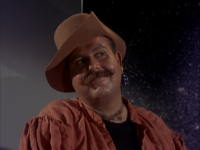
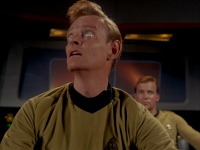
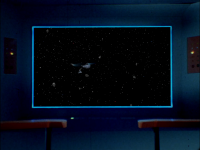
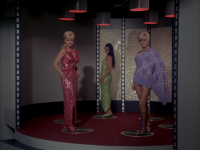
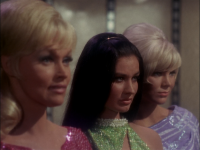
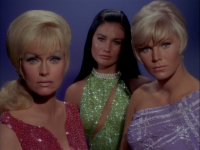
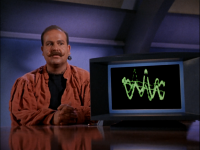
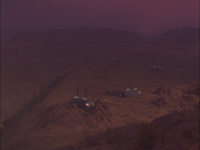
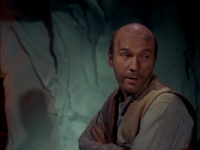
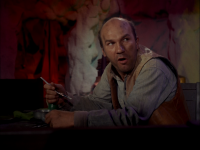
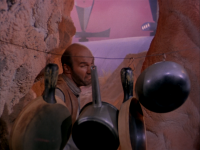
Star Trek TOS - 1x06 - Mudd's Women
Originally Aired: 1966-10-13
Synopsis:
The Enterprise rescues con artist Harry Mudd and his "beautiful" female cargo. [Blu-ray] [DVD]
Filler Quotient:
3, bad filler, totally skippable.
- Technically Mudd will recur, but all episodes which feature him suck, so they can all be considered bad filler.
Problems
- Visual continuity is a bit off in this episode because it was one of the earliest episodes to be produced despite it being aired so much later. As such, it's easy to notice some obvious out of place details, such as Uhura's uniform being the wrong color.
- If the pills were placebos, then why did the appearances of the women so dramatically change after taking them?
- Kirk's middle initial is established as T in this episode, which is retconned from it having previously been established as R in Where No Man Has Gone Before.
Factoids
- This episode establishes that the ship's power source is lithium based.
Remarkable Scenes
- Mudd: "You'll find out that ships' captains are already married, girl, to their vessels. You'd find that out the first time you came between him and the ship."
- Mudd's customers fighting over the women.
My Review
Mudd's Women does much to assault the credibility of Star Trek's progressive future which was supposed depict, among other things, a world without sexism. It makes sense that even in the universe of Star Trek that there are groups of people or cultural idiosyncrasies that constitute a throwback, but the way that the plot of this episode treats the whole thing as if it were normative and widespread is offensive.
What's worse is even setting that aside, this episode's plot logic doesn't make much sense. If Mudd's magic pills were placebos, then why did the appearances of the women so dramatically change after taking them? And why didn't any of the security personnel assigned to monitor Mudd report any of the numerous things they overheard to the captain? Add to that Mudd's acting. The less said about it the better. This is easily the worst episode so far.
The following are comments submitted by my readers.
- From Steve on 2010-02-16 at 6:32am:
My biggest problem with this episode is that there is no explanation of how Kirk figures out about the Venus drug. Did he interrogate Mudd? When? He beamed down awfully quick to have made the discovery and made the placebos. - From Devlonas on 2010-11-21 at 2:18am:
Mudd's magic pills were not placebos - they were sparkly. Only the pills that Eve took at the end were placebos (no sparkles!). It made the point, and did so in spades, that you don't need a magic pill to be beautiful (although I guess having a magic pill can't hurt).
My sticking point with this episode is - If Dilithium (Lithium) Crystals are so valuable, why is there only a three-man operation to mine an entire planet? Seems like a great opportunity for a larger colony to me - From Jem Hadar on 2010-12-05 at 1:32pm:
These new reviews are incredible, keep them up! - From CAlexander on 2011-04-15 at 3:56pm:
- This episode's old-fashioned sexism makes it painful to watch.
- Harry Mudd is amusing in small doses. I just wish he came in small doses.
- The police record for Harry Mudd lists him as 6'1". Aside from the unfortunate non-use of the metric system, he looks taller than that; he towers over everyone else he stands next to. That rascal have been slumping when they measured him! (IMDB lists Roger Carmel as 6'3").
- The moral of the story seems very confused. I guess the moral is "physical beauty is essential for gathering husbands, so it is a good idea to take drugs, but once you get a husband you won't need the drugs and you should send your drug dealer to prison so you don't have to pay him."
- From Mike Meares on 2012-02-20 at 8:00pm:
Kuddos on your comments on the last review Kethinov! A great point you made about how your reviews are made. And how you "try to write carefully balanced reviews and highlight both the good and the bad in each episode." I really liked that response!
However, I now find myself at odds with your review of "Mudd's Women."
You start your review with the claim that "Mudd's Women does much to assault the credibility of Star Trek's progressive future which was supposed depict, among other things, a world without sexism." And "the way that the plot of this episode treats the whole thing as if it were normative and widespread is offensive."
Really? I don't get that at all from this episode.
However, I do agree with the criticism that the issue of sexism is a problem with Star Trek overall ( more on this later ), and in some episodes in particular. And there is sexism in Mudd's Women but I don't feel it is to the degree you aledge to.
I do think Devlonas has already pointed out that the "pills" were not placebos until the very end. That is pretty clear from watching the episode. But your main point is still correct, when Eve swallows the placebo at the end of the episode how does she change her appearence so dramatically? That is a question that needs answering.
And I too had some questions about the security personnel and what they overheard. But Harry and the girls did do a lot of whispering. Perhaps the security guys were effected by the drug the women were taking as the other male members of the crew?
As to the acting by Harry Mudd ( or rather Roger C. Carmel ), which I thoughly enjoyed, I didn't think it was a weakness. Harry Mudd was a great character and I always loved seeing him on Star Trek. Roger is a highlight for me in this episode!
As to the moral of the show, I feel it is summed up near the end by Kirk and Mudd when they explain that only one kind of man or woman can change their appearence, if they want to, are the ones who believe in themselves.
For me it is a lot more offensive to have a Captain who goes around sleeping with every woman he sees! That is sexist! To me having a whole race of women who depend on a man to exist ( Spock's Brain ) is sexism in the highest order! To me having women crew members on board the Enterprise wear short skirts is sexist! To me giving up producing and writing for Star Trek in it's third season to produce a degrading movie about women ( Pretty Maids All In A Row ) is very sexist!
But I digress....... lol.
Was this a great episode? No! But it was entertaining, although a bit average for Star Trek.
- From Strider on 2012-07-16 at 3:40pm:
I'm not at all blind to the sexism in Star Trek in general or in this episode specifically. It's interesting to watch as a cultural study--not that the 23rd century still struggles with these issues, but that the 1960's did.
But it seems completely realistic to me that the 23rd century would still have mail-order brides. It didn't seem like sex-trafficking to me, just matching women who wanted a new life with men who wanted a wife but had very little chance to meet one. Not that Harry Mudd is anyone's example of ethical business practices--he did, after all, try to make the women more attractive than they really were. But besides the "strange effect" they had on men, all the pills really seemed to do was style their hair and apply makeup. If you're going to marry a rich lithium miner, you can probably get someone to do that for you.
But the highlight of this episode for me was Spock. Some of Spock's best facial expressions of the whole series are included in this episode. When the women appear on the transporter platform, they cut to his face first, and it's obvious that he notices their attractiveness, and is just as poleaxed as the other men in his own quiet Vulcan way. Spock's just better at hiding it, is all. Mudd declares him impervious to the women's influence, but Spock didn't say that--he just didn't argue it. Then all throughout the episode, he's got these half smiles and raised eyebrows...like he's extremely amused (for Spock), but aware that the joke's on him as well. He never seems to be laughing AT the other crewmen, just ABOUT the situation.
And it was nice to have Kirk able to keep his mind on the job rather than on the beautiful women in front of him! Very captainy of him--and he and Spock were a great team in this.
Strider - From mandeponium on 2012-09-01 at 4:11pm:
To quote Spock in this one, "I'm happy the affair is over. A most annoying, emotional episode." - From Alan Feldman on 2012-09-08 at 6:49pm:
I like the Mudd character and was also glad to see him in "I, Mudd".
Re Mike Meares' post:
Kirk didn't sleep with anyone in this episode. In fact, he doesn't sleep with anyone in the vast majority of episodes.
I don't see "Spock's Brain" as sexist in that manner. They needed a brain, not a man. It just happened to be a man's brain. And it was the women who controlled the men!
Re the short skirts: from TV Guide, August 24, 1996, p. 26:
TVG: Anyone offended by the micro-skirts? The sausage-casing blouses? Grace Lee Whitney: Oh, no! Everyone thinks we got rooked into it, but that's what we wanted to wear. I was very instrumental in getting us those mini-skirts -- which, by the way, were skorts. . . . I told the costumer, "Hey, I look just like the men. What a shame to waste my legs. You know, I've got great legs." And then I got this image of space babes with the tight waists, cinched belts, short skirts, and lots of legs and boots and boobs, and great big "Barbarella" hair. So I got that look together and showed it to Gene. He just about fell off his chair. . . .
Hey, that's Grace Lee Whitney speaking, not me. Don't have that edition of TV Guide? Check
http://books.google.com/books?id=mqjORRNpo-cC&lpg=PA39&ots=aJmVwm3IBm&dq=tv%20guide%20grace%20lee%20whitney%20%22space%20babes%22&pg=PA39#v=onepage&q=tv%20guide%20grace%20lee%20whitney%20%22space%20babes%22&f=false
That's the closest to this I could find on the Web. But I do have a copy of this edition of TV Guide, and took my quotes from that.
According to wikipedia, Roddenberry wrote two episodes for season 3: "The Savage Curtain" and "Turnabout Intruder". I don't know if he produced any.
AEF - From Zerothis on 2012-09-22 at 1:06am:
I was under the impression that real pills confiscated from Mudd and the placebos were provided after. Eve's last scene was the only place that placebos were used. - From Schreck on 2013-05-23 at 7:02pm:
Terrible episode that is easily the worst of the first season and my brother’s least favorite in the original series…it just misses all the marks here…I give it a 5.25 and my brother a 4.5 - From Alan Feldman on 2017-04-08 at 3:54am:
MUDD'S WOMEN
A few things to add:
How is it that a starship has trouble keeping up with Mudd's small ship? Really? I seriously doubt that Mudd's ship could go warp 8.
Bones' and Scotty's reactions to the women were nauseating (for lack of better word), esp. in the transporter room. C'mon guys. Get a hold of yourselves!
When Ruth steps in front of Bones' medical scanner, it bleeps and flashes. We then see Bones for a second or two and then go immediately back to the scanner, and Ruth is gone! Back to Bones for a second or two, and back to the scanner with Ruth in front of it again. Doubtful she could have moved that fast. And this sequence happens twice.
Ruth says the men are young. Hardly! Yet again, women getting together with men twice their age.
When Childress told Kirk he'd get the crystals later, why didn't Kirk just beam the women back to the ship and hold them hostage until the crystals were delivered? Or they could have made use of their phasers.
Spock has a (circular) slide rule!
Ben Childress's quarters is 11 miles from the mining place. 11 miles? That's quite a long, difficult walk, esp. on that wasteland of a planet!
When Kirk and Mudd say there's only one type of man or woman, Kirk mentions two types.

Star Trek TAS - 2x05 - How Sharper Than a Serpent's Tooth
Originally Aired: 1974-10-5
Synopsis:
While tracking a probe, the Enterprise encounters an alien vessel that is surrounded by an energy field which proceeds to encompass the Federation ship. [Blu-ray] [DVD]
Problems
None
Factoids
- This episode's title is from Shakespeare's King Lear, Act I, Scene 4.
- Sulu is remarkably absent from this episode. Replaced by Walking Bear because they conveniently needed a Native American in this episode.
Remarkable Scenes
- Kirk telling the Native American god "we don't need you anymore."
- Spock: "Vulcan was visited by alien beings. They left much wiser."
- Kirk: "How sharper than a serpent's tooth it is to have a thankless child."
My Review
The addition of Ensign Walking Bear is bittersweet. On one hand, it's nice to see more racial diversity on the show. On the other hand, the character was entirely forced. He only appears on this episode, and only because they needed a native American for the purpose of the plot. This is already a cliche, several guest characters are added in various Star Trek series just for one episode to serve some overly simplistic purpose and we never see them again. Once again, the Enterprise encounters another space traveler who once visited Earth and posed as a god, which is also becoming a cliche. Unfortunately, the entire plot was recycled and offers absolutely nothing new. God alien realizes Earth isn't as primitive as it once was. God alien realizes it's not as powerful as it once was. The only redeeming quality is the episode once again features alien looking aliens.
No fan commentary yet.

Star Trek Pic - 1x05 - Stardust City Rag
Originally Aired: 2020-2-19
Synopsis:
The La Sirena crew begin an unpredictable and lively expedition on Freecloud to search for Bruce Maddox. When they learn Maddox has found himself in a precarious situation, a familiar face offers her assistance.
Problems
- Hwang's data file described him in feet and pounds (English Imperial Units) rather than the more commonly used (and much more appropriate) metric system units used most commonly on Star Trek.
Factoids
None
Remarkable Scenes
- Icheb getting butchered. Whoa.
- The chilling "Where's your cortical node, buddy?" remark refers to the fact that Icheb doesn't actually have one because he donated it to Seven of Nine to save her life in the very touching episode Voy: Imperfection.
- Raffi: "Rios, you seriously really need to sell this. You can't do your brooding existentialist space man routine."
- Raffi's son rejecting her.
- Seven: "After they brought you back from your time in the collective, do you honestly feel that you regained your humanity?" Picard: "Yes." Seven: "All of it?" Picard: "...No. But we're both working on it, aren't we?" Seven: "Every damn day of my life."
- Seven taking her revenge.
- Picard meeting with Maddox, discussing Dahj and Soji.
- Agnes murdering Maddox.
My Review
Hey guys, remember Icheb? That adorable ex-Borg who Seven of Nine thought of as a son? After Voyager made it home, it turns out he became a Starfleet officer! Isn't that sweet? He put on a red uniform and... oh shit.
The horrific demise of Icheb is not the kind of closure for a previous character many of us expected from this show, but it is appreciated nonetheless. One of many loose ends left by TNG, DS9, and Voyager tied up now for better or worse. We even got an update on what Quark is up to, apparently running a bar on Freecloud, or at least franchising the brand out. Plus the line about Quark being "especially satisfied" with Rios' fictional alter ego's handling of his "trouble with the Breen" implies that Quark was either personally recruited by Raffi to participate in the scam in this episode, or at least that Raffi felt Quark was a reputable enough businessman in this community—such as it is—to forge his name to an endorsement to make it sound credible.
Of course the most notable closure we got in this episode is for Seven of Nine, who we learn has joined a group called the Fenris Rangers, a group that sounds very similar to the Maquis in the sense that both were outlaws trying to keep order as they defined it in a place where law and order had broken down to a degree. It would've been nice to hear if Seven's experience with so many ex-Maquis on Voyager played a role in her radicalization of sorts. A particularly sad omission was we got no mention of her previous relationship with Chakotay which is an omission almost as conspicuous as the continued extremely unfortunate lack of discussion about sentient holograms—Voyager's doctor in particular—and how that relates to the ban on AI.
Indeed, Seven becoming a vigilante is second only to Icheb's unceremonious demise in terms of the most depressing things about this show so far. Seven and Icheb come to the Federation with Voyager brimming with potential, but it is squandered in a tragic and empty way. Depressing outcomes such as this driven by the Federation being demoralized and divided is exactly what Picard is trying reverse in his somewhat loopy quest to save a far flung android. You can see how committed Picard remains to restoring the upstanding and merciful Federation from 15 years ago when he insists that Seven not take her revenge. Seven's decision to let Picard think he had convinced her was quite touching, but yet another tragedy of the story is Seven was actually right to take her revenge. Not because of the principle of an eye for an eye, but because as Seven had noted, Bjayzl operated in a lawless place. If Seven didn't take her out, she was just going to keep butchering more ex-Borg. Maybe Seven could've taken her prisoner or something, but it seems likely that the Fenris Rangers lacked the resources to run a maximum security prison. Besides, Bjayzl seemed like the sort of person who could organize a sophisticated jailbreak if need be.
Another tragic element of the story was the revelation that Raffi's drug-induced bouts of paranoia described in her first scenes were far from just a bit of dark humor as the early scenes implied, but in fact turned out to be a full-blown drug addiction that drove her son to cutting her off, regarding her as a toxic family member. Raffi trots out a slate of cliched stock phrases commonly offered up by struggling addicts about having gotten clean and about having changed and having become a better person. Anyone who knows a drug addict knows how difficult it is to trust such statements, so Hwang rejecting her is an entirely reasonable if perhaps wrong choice in this instance. It is likely Raffi truly did get clean since hitching a ride on the La Sirena and it is likely her wacky conspiracy theory will turn out to be correct as well. But even so, Hwang has no reason to believe any of that until Raffi produces extraordinary evidence for her extraordinary claims.
Speaking of Hwang, the fact that he was at a fertility clinic was a very interesting detail. It's been strongly implied in many previous Star Trek series that interspecies breeding—while possible—is often quite difficult to achieve at times, so adding more texture to that long established fact is appreciated. One detail that we seriously could've done without though was the cheesy holographic advertising scene when they arrived at Freecloud. If it had happened when they were on the surface in the streets or something maybe that would've been less objectionable, but the idea of fully interactive holograms appearing inside of people's ships in orbit raises lots of difficult to resolve questions, most alarmingly related to security. So once you enter orbit of Freecloud, people can just project holograms into your ship which can gather information via interaction or perhaps listen to conversations? Sounds like a good way to spy on people or steal their data!
Of course another shocking development was finally catching up with Bruce Maddox only to see him murdered by Agnes shortly thereafter. She wishes she didn't know what she knows. She wishes "they" hadn't shown her what "they" showed her. Whatever it was she learned caused her to become ideologically opposed to Bruce Maddox's quest to carry on Dr. Soong's legacy of building ever more sophisticated and human-like androids despite having previously been a full partner with him in that endeavor in more ways than one. Hopefully we find out what terrible secrets she learned soon and hopefully it makes her shocking murder of her lover at least somewhat sympathetic somehow.
The following are comments submitted by my readers.
- From Alex on 2020-02-24 at 12:58pm:
This was the episode that made me rethink whether I really want and need to further watch this series. And the decision is rather not in favour of the series.
Let's see, so far ST:Pic has almost more violence on screen than *all* previous Star Trek *combined*. Or is it *really* more? (That's not counting Discovery, frankly I didn't finish even season 1 and I just... I don't count it.)
We had the series start with some brutal killings right away, people melted with acid, people melting themselves with acid, rogue plastic people shooting real people through the neck in slow burning death, and now an ex-borg butchering with all the graphic detail. Maybe I'm too sensitive? Could be. I thought Star Trek always managed to be provocative and even shocking without resorting to just plain visuals of shock-value stuff. And close to the end we have another person turned into red mist. Even if she was built up as deserving to die (right after Picard argues otherwise... so... I don't agree either)
And in the very end when we just rescued Bruce Maddox, after all that setup and introduction (well, his older self, of course we already were introduced to him 30 years ago), he's just killed. Right away. And it showed his agony in full HD for good 30 or 40 seconds. How his blood vessels collapsed, organs failing, eyes darkening, all that.
Just have us wait for the character's reveal for 5 episodes now and then crunch him without any mercy.
I didn't want that. Especially (!) when it happened *right after* Picard got his next lead, his next quest mark out of the professor.
That also brings up a few questions - if the EMH is capable of "background processing" so to speak, as to response to individuals onboard being in some alarming condition - psychologically or physiologically (interestingly the former was made to seem more immediate?) - then... what about security? Was there not one alarm signal going off on the captain's board? That someone was dying right now in sickbay? When they come in, say, 30 minutes later, for some usual business, does Agnes tell them "oh he died because injuries", won't they have any sort of security recording? Or is she gonna erase the evidence?
Bottom line, that was pretty frustrating. First the episode turned me away with the graphic butchery (I get it, things are bad, did I really need to see that much of it?), then it admittedly built some good tension and humor, then it made my stomach turn into a knot as I was watching Raffi's scene with her son (it was painfully good, in a sad way), and then it slapped me with the killing of Bruce Maddox as if he was a scripted NPC that Picard had to meet and talk to once in order to continue on the quest.
Was I supposed to equate and resolve the maturation of the franchise with inevitably turning darker, more shocking? Well, it sounds more like GoT than ST. And I'd rather not. - From Mathalamus on 2020-02-24 at 10:31pm:
I stopped watching picard after ichebs eye was torn out. apparently, i didn't miss out on a lot after that. sorry, but i cannot consider picard to be a good trek series. its just way too different from what i think star trek should aspire to. - From JD on 2020-02-25 at 10:00am:
I thought this episode was bloody excellent.
Icheb... ouch... but there needed to be something properly serious to make Severn go vigilante.
Some people seem to be a bit unhappy about the Star Trek Universe being a bit of a bleak place... however, we've only really seen it before through the lens of Starfleet which is always going to be absolute best of the universe.
What we're seeing in Picard is more akin to what we saw in Gambit or the bar we saw in Unification. Hey, even DS9 was a bit of a sketchy place and that was under Federation control! - From Alex on 2020-02-27 at 12:15pm:
@JD
"Something properly serious to motivate Seven"
A valid point in itself but his death would be equally serious regardless. Actually, the eye scene was for the audience *alone*. She wasn't even in the room when that happened.
If he were to die on some hooks with wires injected into him or something, it would be cruel, it would be motivating, it wouldn't be as shock-value-y.
And, in the end, the most painful part for her was not being able to save him, which could've been provided without us viewers seeing that sort of stuff.
"First Contact" had plenty of people dying in similar circumstances, but it didn't become "Saw".
The episode could've been both fun and gut-wrenching but for me personally that was lost behind "Picard" trying to GoT the franchise. It was already sad to watch Picard being a shadow of his former self, rejected, powerless, fumbling around somewhat, his housekeeper saying he's demented. Now it went into just being too graphic. :( - From Rick on 2020-03-25 at 3:08am:
I agree completely with Alex. Gene is rolling over in his grave with what has been done to trek. - From Gary on 2020-03-28 at 4:55pm:
First: Thanks so much for carrying on reviews, now of ST:Pic... I've always found your reviews thoughtful and balanced, and they add to my enjoyment of the episodes.
Even when, sometimes, it's hard to enjoy the episodes. While I agree with some complaints that the ramped-up gore is pushing ST's envelope in ways that aren't welcome, I can hope they use it sparingly and get back to discussions of morality.
Agnes' murder of Maddox did rely on some sadly-common ST tropes. On his death, surely Picard and the others would want to ask the expert - the EMH - about the details, NOT the roboticist. But in ST, scientists are all physicians and vice-versa. But I suspect that any of the former Starfleet personnel on the ship (3 of them!) would have more medical training than Agnes.
In any event, in past situations they'd look at the "readouts", the data, not just listen to an amateur's description and move on. And finally: should a passenger (that's all she is) be able to disable the EMH during a medical emergency? - From Axel on 2024-03-12 at 1:34am:
I'm glad you brought up the advertising holograms appearing in the ship. This scene is clearly supposed to be humorous. But IMO, it continues the Star Trek tradition of showing us technologies that may not be far in our future. Is what these holograms do much different than how modern social media advertising works? Our Insta, Facebook, and other feeds show us products based on our search histories and browsing trends. Marketing that is tailored to individuals based on data that many people would probably prefer to keep private, but have accepted that it no longer is. Our devices sync with other devices and share information about our profiles. Give AI and holographic technology some time, and I think this is exactly where things will go.
Overall, this was one of the better episodes so far. I can't believe it's taken me this long to watch "Picard" but I'm very glad they used the format they did for this show, making it a continuous story rather than standalone episodes. It also makes me appreciate DS9, which did this long before it was the norm.

Star Trek Dis - 2x15.2 - The Trouble with Edward
Originally Aired: 2019-10-9
Synopsis:
Newly minted Captain Lynne Lucero is excited to take command of the U.S.S. Cabot, until she meets Edward Larkin, an ornery scientist who believes he has found a revolutionary new use for tribbles...
Problems
- In Ent: The Breach, it is established that tribbles breed too quickly to be controlled. That contradicts the notion that they were slow breeders before Edward modified them.
Factoids
- This is the first (and hopefully the last) episode of Star Trek to feature a post-credits scene.
Remarkable Scenes
- The ship being destroyed by the tribble overrun.
- Lucero regarding Edward: "He was an idiot."
My Review
While it was nice to see a brand new crew on a brand new ship, this is easily the worst Star Trek "episode" in many years, so much so that it deserves to be struck from canon and ignored forever. Aside from the fact that the details regarding tribble biology and history are hard to reconcile with the rest of canon, the "post-credits" scene (a newer fad in TV/film that we should hope dies a swift death) is obviously pure parody and clearly not intended to even be part of canon to begin with. The rest of the episode isn't much better though. It's basically an episode of Bob's Burgers set in the Star Trek universe, except Edward isn't even remotely as likable as Bob. Edward is awkward, antisocial, reckless, immoral, and vindictive. The narrative expects us to hate him and celebrate his needless death in the end, as though watching obnoxious people win Darwin Awards is somehow in the spirit of Star Trek. It isn't.
The following are comments submitted by my readers.
- From Azalea Jane on 2021-09-19 at 5:10pm:
Agreed, this episode was mean-spirited and missed the mark. I kind of wish I hadn't seen it.
Also, I know that Trek tends to play fast and loose with the conservation of energy, but where did all that *mass* for the tribbles come from? What did they EAT? That added to the disbelievability of this episode. This feels like it should have been a scrapped Lower Decks episode if it were the right time period. Or maybe, an in-universe school play from Lower Decks.

Star Trek TNG - 2x22 - Shades of Gray
Originally Aired: 1989-7-17
Synopsis:
An alien organism invades Riker's brain. [DVD]
Problems
- Riker "remembered" some things he wasn't actually there to see.
Factoids
- This was an extremely low budget episode.
Remarkable Scenes
- The joking scene at the end when Riker is cured is neat.
- Some of the scenes in Riker's dream are fun to watch again.
My Review
The problem this episode suffers from is severe lack of plot. This was due to budget problems. They didn't have enough money to do the big action packed season finale they planned for. So instead they made a clip show. What confuses me the most about this situation is why they bothered to make this episode at all. The previous episode (TNG: Peak Performance) would have made for a far better season finale.
The following are comments submitted by my readers.
- From DSOmo on 2007-07-04 at 10:05pm:
- Pulaski recognizes that the microbes respond to brain endorphins. She then proceeds to jolt Riker with a machine so his brain can produce them. Yet, she worries that the stress may kill him. In "The Battle," Dr. Crusher claims that twenty-fourth century medical science has "mapped the brain." If they have, doesn't it seem reasonable that they would understand the endorphins the brain produces under different circumstances? Shouldn't they be able to manufacture these brain endorphins in a replicator and inject them in Riker? Then again, if Pulaski could make the endorphins, we would miss all there wonderful flashbacks! (Sorry, fighting to control my hatred for flashback shows)
- As Pulaski uses a machine to stimulate Riker's brain, she looks in a pair of eyepieces and presses buttons. She seems to hit the right buttons without even looking. Considering that all the control surfaces on the Enterprise are flat, that's quite a feat! - From JRPoole on 2008-02-21 at 2:58pm:
This is not a comment on this episode--what is there to say about this one, really?--but on the second season as a whole.
The second season is superior to the first, mostly because the characters started coming into their own, the seeds of coming plot arcs are sown, and the writers stopped rehashing TOS plots (with the exception of "Unnatural Selection"). On my slow process of re-watching the series for the first time in years, I was surprised to see that some of the episodes I remembered most fondly--"Contagion," "Up the Long Ladder," "The Emissary," "A Matter of Honor," "Q Who"--are all this early in the series. I distinctly remember it getting better as it went along, so I'm looking forward to the upcoming seasons.
I'm watching the series via Netflix, and the last disc I received contained the final two season 2 episodes and a smattering of special features. One of the special features was called "Memorable Missions" and consisted of the actors, producers, writers, and other behind-the-scenes types discussing their favorite episodes. I was surprised to see that the people behind the show seem to love "The Dauphin," which I consider to be among the worst episodes in existence.
Anyway, on to season 3.... - From JR on 2008-10-28 at 3:02am:
DSOmo commented:
"If they have, doesn't it seem reasonable that they would understand the endorphins the brain produces under different circumstances? Shouldn't they be able to manufacture these brain endorphins in a replicator and inject them in Riker?"
Neurotransmitters released in the bloodstream can't reach the brain because of the blood-brain barrier. So this wouldn't have the same effect as stimulating the natural production of endorphin. - From Wayne on 2009-07-16 at 5:36pm:
No one seems to remember that this episode and "peak performance" were made at the beginning of a writers strike. that why the seconds season only has 22 episode instead of the usual 26. This was a clip show that was made as filler to finish the season. - From curt on 2010-04-15 at 6:19pm:
Its a clip show show, so I don't hate it! it is what it is. Im not really a fan of it, Id not even give it a rating. - From thaibites on 2010-09-19 at 12:21am:
This episode is a microcosm of the 2nd season - crap. It's all probably due to the writer's strike, but it's still crap and you can't polish a turd. The only memorable episode was "Q Who". The rest were OK to forgettable. I like action, tension, and big stories. Season 2 was a collection of little stories that allowed us to get to know the characters better, which is nice, but there needed to be more "on the line" - more stories where you felt they were pushing the limits of space and may not survive. Also, Pulaski was a complete disaster. Thank God she didn't survive season 2.
Bring on season 3 - give me Klingons, Romulans, Borg, ANYTHING - just give me some action and suspense! - From CAlexander on 2011-04-18 at 4:42pm:
This episode is a fraud perpetrated upon the innocent viewing public. It should come with a label – "Warning – we didn't have the money or the script to make a genuine Star Trek episode. Proceed at your own risk."
I watched it not knowing what it was. The first 15 minutes seemed promising. Then the clip show starts. So pointless! So random! But if that isn't bad enough, when they return to the main plot, it starts to get melodramatic. And the acting gets more and more painfully awful, the clips more and more random, until I was begging for the episode to end.
- The one good point is the final scene. It made me laugh.
- From Dstyle on 2015-11-09 at 2:19pm:
Pulaski (melodramatically): "We need to access intense, negative emotions to drive this infection away!"
Troi (even more melodramtically): "Well, how about the time his mother died when he was a child? That was a major trauma! Or how about when his father abandoned him when he was fifteen? Or the time he had to fight his way off The Pegasus when the crew mutinied against the captain, even though his actions went against his principles? I mean, his early years are a goldmine of negative emotions!"
Pulaski (desperately melodramatic, somehow topping Troi's melodrama): "No! For some reason I can only access negative memories from the last two years!"
Clip shows, eh? What can you do? I feel bad for cast members like Brent Spiner and Michael Dorn who had to sit in the makeup chair for hours so they could be a part of this. (Wait, was Worf in this episode? Maybe in the beginning? No, I don't remember him in it at all, probably for exactly this reason.) - From Mark Boris on 2016-08-27 at 4:02am:
Finally got around to watching this one. Only one I hadn't seen, can you believe it? I saved the worst for last it seems.
Away teams ought to beam down in biohazard suits. Just sayin'.

The following are comments submitted by my readers.
I'm not to fond of any of the DS9 mirror universe episodes, this one included. However, I disagree with the assertion that the lesbianism here is "over the top". In fact, I found it, well, disappointingly tame. There was a fairly simple kiss between Mirrors Kira and Ezri, a vague show of tenderness between them, and a rather gentle innuendo between Mirrors Ezri and Leeta at the end. Mirror Kira herself was over-the-top, as always, and that was grating. But, as a bi woman, I was hoping for something a little more... sweeping and romantic... or at least, a portrayal as suggestive as hetero romances have gotten. I mean, "Rejoined" was much more "lesbianist" than this episode, and even then, that came with major caveats.
It's always been pretty disappointing to me that characters with non-hetero sexuality never got much (or really any) showing on Star Trek. I hate to be on a soapbox, but it seems like that would be part of the "enlightened 24th century". It's really too bad for those of us who'd like to see the girl get the girl at the end sometimes.
I'm not a fan of mirror universe episodes either, and this one is no exception. Personally, I think it's a shame that this is the last "Ferengi" episode, because it's nowhere near as good or entertaining as the others. Granted, we do get a little bit of Ferengi intrigue -- and we get to see Zek again -- at the very end of the series, but this is the last proper Ferengi episode, and it's kind of boring. The only thing "new" here is Mirror Ezri (who, I have to admit, is a total fox).
But it's still lame, and we still have to deal with Mirror Kira and Mirror Julian, who are somehow even more annoying and than their 'regular' counterparts.
2 points for Quark and Rom, 2 points for hot Mirror Ezri and 1 point for being the LAST Mirror Universe episode (thank god) = 5/10
I agree with Marie Douceur - the lesbian moments were too tame.
I actually don't think this one was too bad. The inconsistencies are annoying, but the Ferengi episodes and Mirror Universe episodes are all just there for the sake of fun. It was nice to combine them and get them both out of the way at once to avoid disrupting the overall seriousness of the plotlines in season 7.
Mirror Worf is the only mirror character I don't hate (apart from Ezri, rowr) - he's very entertaining as a bombastic fool.
Loved Rom pointing out the logical inconsistencies, very 'meta'.
I rather like this episode, I thought the exploration of a family with a specific type of dysfunction was a good one and generally made for a good Ezri character episode.
You are right that the tie-in of this episode to Honor Among Thieves is largely irrelevant. This episode is about Ezri’s family, not the Orion syndicate, and O’Brien is only there to fulfill the mandatory “B Plot” requirement.